In ‘warm’ phone call, Trump invites Philippines’ Duterte to White House
President Trump placed a “warm” phone call to Philippines President Rodrigo Duterte, who has been widely criticized for a bloody anti-drug crackdown, and invited him to visit the White House, both countries said.
A White House statement late Saturday said the conversation between the two leaders was “very friendly,” and added that the U.S.-Philippine alliance was “heading in a very positive direction.”
In the Philippines, a presidential spokesman said Trump had expressed understanding of challenges facing Duterte, “especially on the matter of dangerous drugs.”
Human rights groups have expressed deep concern over Duterte’s harsh methods against suspected drug users and drug dealers during his tenure in office. Human Rights Watch estimated earlier this year that at least 7,000 people, an average of 30 a day, had been killed by death squads since Duterte became president in what appeared a deliberate campaign of extrajudicial executions.
Reince Priebus, the White House chief of staff, defended the invitation to Duterte, saying Sunday that the outreach was made largely in the context of calming regional tensions with North Korea and did not signal approval for Duterte’s methods in the drug war or a larger disdain for human rights.
“The purpose of this call is all about North Korea,” Priebus said on ABC’s “This Week.” He said that Trump has been “speaking a lot to all our partners in southeast Asia” amid rising tensions on the Korean peninsula.
Manila is about 1,800 miles from Pyongyang, and the Philippine navy is barely a coastal defense force, so it’s unclear how it would fit into a regional strategy for northeast Asia. Pyongyang regularly issues threats to South Korea and Japan, not the Philippines.
Duterte had been notably bellicose in his stance toward Trump’s predecessor, Barak Obama, and at one point threatened to essentially scrap the longstanding U.S.-Philippines military alliance and end cooperation on counter-terrorism. Duterte called Obama a Philippine epithet loosely translated as “son of a whore” after Obama criticized the brutal anti-drug crackdown.
It was not the first time Trump’s dealings with a foreign strongman have raised eyebrows.
Trump earlier in April hosted Egyptian President Abdel Fattah Sisi at the White House and praised him for doing a “fantastic job” despite Sisi’s jailing of thousands of political opponents after he took power in a military coup.
Also in April, Trump was alone among Western leaders in making a congratulatory phone call to Turkish President Recep Tayyip Erdogan after Erdogan claimed victory in a referendum that vastly enhanced presidential powers.
Critics called the Turkish referendum, whose results have been disputed by the leading opposition party, a blow to democracy.
Trump: ‘We’ll see’ if a North Korean nuclear test would trigger U.S. response
President Trump is warning North Korea not to conduct another nuclear test, saying “we’ll see” if such a step would trigger a U.S. military response.
Trump, in an interview aired Sunday on CBS’ “Face the Nation,” also said he believes China’s President Xi Jinping, with whom he met weeks ago in Florida, has been using Beijing’s leverage to restrain North Korea’s mercurial leader, Kim Jong Un.
In the interview, Trump said neither he nor Xi would be happy if Kim were to conduct a nuclear test, which would be North Korea’s sixth. There were some expectations earlier this month that the hermit kingdom might conduct such a test in connection with patriotic holiday observances.
The test did not take place, but North Korea has continued with other actions the U.S. and its regional allies regard as provocations, including a failed test on Saturday of a mid-range ballistic missile. Kim’s government is known to be working to develop an intercontinental ballistic missile capable of striking the United States.
Asked in the CBS interview if a North Korea nuclear test would prompt U.S. military action, Trump replied: “I don’t know. I mean, we’ll see.”
Trump appeared to offer grudging praise for Kim, noting that he took over North Korea when he was 26 or 27 after his father died and has consolidated power despite challenges from the military and members of his family.
“A lot of people, I’m sure, tried to take that power away, whether it was his uncle or anybody else,” he said. “And he was able to do it. So obviously, he’s a pretty smart cookie.”
In 2013, North Korea’s official news service reported that Jang Song Taek, Kim’s uncle by marriage, was executed for attempting to seize power. The report called Jang “worse than a dog.”
In a separate interview on CNN’s “State of the Union,” Sen. John McCain (R-Ariz.) was asked if Trump was considering a pre-emptive strike against North Korea, especially if there were indications that it had developed a delivery system capable of carrying a nuclear weapon. “I don’t think so,” he said.
“I think we have to consider that option as the very last option,” said McCain, who chairs the Senate Armed Services Committee. He cited an array of dangers associated with any outbreak of hostilities on the Korean peninsula, including North Korea’s ability to strike Seoul with conventional artillery.
“The major lever on North Korea, maybe the only lever, is China,” he said.
Amid rising tensions with North Korea, the Trump administration has been sending mixed signals about its dealings with South Korea, long a bedrock regional ally.
Trump rattled many in South Korea last week when he said in at least two interviews that Seoul should pay $1 billion for a sophisticated missile defense system that the U.S. and South Korea have begun installing. The Terminal High-Altitude Area Defense system, or THAAD, is intended to become operational within a matter of days.
South Korea’s presidential office said Sunday that Trump’s national security advisor, H.R. McMaster, had offered reassurances that Washington would not try to make Seoul bear the cost. In an interview aired Sunday, McMaster confirmed that was the case — for now.
“What I told our South Korean counterpart is that until any re-negotiation, that the deal’s in place, we’ll adhere to our word,” McMaster said on “Fox News Sunday.”
Senior Trump administration officials are often put in the position of walking back Trump’s comments, including many on foreign affairs, without seeming to directly contradict the president.
In this instance, McMaster sought to put Trump’s comments in the context of looking at “appropriate burden-sharing” across all U.S. alliances.
“The question of what is the relationship on THAAD, on our defense relationship going forward, will be renegotiated, as it’s going to be with all our allies,” McMaster said. “Because what the president has said is, he will prioritize American citizens’ security and interests.”
Protest over climate change, and Trump’s rejection of issue, stoke rallies
Tens of thousands of demonstrators converged around the White House and in other cities Saturday to protest what they said was the Trump administration’s rejection of scientific claims on climate change and other environmental issues.
Trump has ordered the removal of numerous regulations imposed by previous administrations to protect the environment. That has motivated demonstrators to choose the president’s 100th day in office for mass protests .
“I am standing up for climate change,” said Lucy La Flamme, a Washington resident who held a large banner saying, “Resist,” at the demonstration.
“This is a critical tipping point,” said Kaitlin Jensco, 29, a teacher.
She and others expressed alarm at the Trump administration’s decision to remove from government websites any mention of climate warming and other keen environmental concerns.
Participants in the People’s Climate March said they objected to Trump’s rollback of restrictions on mining, oil drilling and greenhouse gas emissions at coal-fired power plants, among other things.
In Washington, demonstrators braved one of the hottest April days on record to participate in the marches.
Trump will stage a 100-day rally for the voters who helped put him in the White House
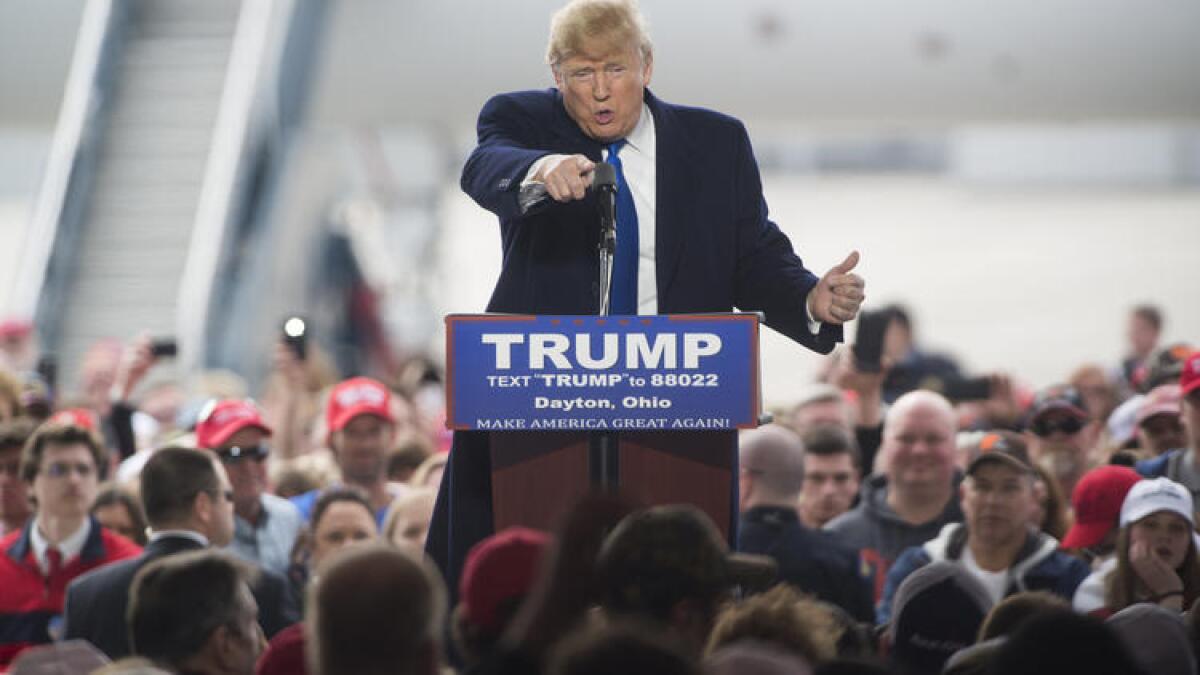
President Trump will skip the White House correspondents’ dinner Saturday night and instead celebrate his 100th day in office doing what got him there: taking his populist message directly to supporters in rural Pennsylvania, the state he turned from blue to red in his surprise electoral college win in November.
The nighttime rally will start in Harrisburg at the same time as the annual press dinner in Washington and give Trump a chance to publicly prod one of his favorite foils, the White House press corps, many of whom will be attending the black-tie event.
Trump’s speech wasn’t deliberately scheduled to upstage the dinner, a spokesman said.
“I respectfully suggest that it’s not just about the correspondents’ dinner; it’s rather an opportunity for him to talk to voters that elected him and [say] what he’s been able to accomplish in the first 100 days,” White House Press Secretary Sean Spicer told reporters Friday.
Since the rally will take place 50 miles from where Trump made his 100-day compact with voters in October, the president likely will tick off what he considers his tally of accomplishments.
Chief among them: He placed a conservative justice on the Supreme Court, revamped orders to allow immigration agents to deport more people in the country illegally and has initiated a program to roll back regulations on businesses and environmental protection.
But more than half of his 30-plus executive orders simply told Cabinet agencies to study a problem and come up with recommendations.
Trump hasn’t repealed and replaced the Affordable Care Act or torn up the North American Free Trade Agreement or the Iran nuclear deal, as he pledged last year.
After talking tough on Chinese trade practices, he’s agreed not to name China a currency manipulator as he promised. And his efforts to ban travel from select Muslim-majority nations have been blocked in court.
The White House announcement last week of an ambitious plan to cut taxes was rolled out as a one-page document with bullet points, not as a policy proposal to Congress.
Trump, who had no government or military experience before he ran for president, acknowledged this week that running the government is tougher than he expected.
“This is more work than in my previous life. I thought it would be easier,” Trump told Reuters in an interview Thursday.
During that interview, he handed out maps showing which parts of the country he carried in November. His advisors say he is still fixated on the daily news cycle and he often asks how a decision will play in the media before he chooses a path forward.
Trump will be the first sitting president to skip the correspondents’ dinner since Ronald Reagan didn’t attend after he was shot in 1981.
Trump was roasted by then-President Obama during the dinner in 2011 following several weeks of the billionaire businessman’s appearing on news shows spreading the false conspiracy theory that Obama wasn’t born in the United States. People close to Trump, who was in the audience that night, have said his humiliation that night spurred him to consider a White House bid.
“I think that is the night he resolved to run for president,” Trump’s longtime friend Roger Stone said in an interview last year on PBS’ Frontline. “I think he is kind of motivated by it: ‘Maybe I’ll just run. Maybe I’ll show them all.’ ”
Pentagon says two Army Rangers may have been killed by friendly fire in Afghanistan
The Pentagon has launched an investigation into whether friendly fire killed two U.S. Army Rangers during a night raid against an Islamic State compound in eastern Afghanistan this week.
Due to the fierce fighting, it’s not clear if the two Rangers were shot by other Americans, by Afghan troops or by Islamic State fighters. U.S. commanders launched an official inquiry into the incident.
Sgt. Joshua Rodgers, 22, of Bloomington, Ill., and Sgt. Cameron Thomas, 23, of Kettering, Ohio, were killed during a three-hour battle Wednesday night in Nangarhar province.
The pair, assigned to the 75th Ranger Regiment in Ft. Benning, Ga., both died of their injuries after they were evacuated from the battle. A third Ranger was wounded and expected to recover.
The raid, near the border with Pakistan, sought to capture or kill Abdul Hasib, Islamic State’s leader in Afghanistan.
About 50 Army Rangers and 40 Afghan special forces were dropped by helicopter at about 10:30 p.m. into the Mohmand Valley, according to the Pentagon.
Within minutes, the commandos came under intense fire from all directions and dug-in positions, the statement said.
“Based on reports from forces on the ground, the engagement was close-quarters from multiple compounds,” the statement said.
American AC-130 gunships, Apache helicopters, F-16 fighter jets and armed drones all launched air strikes during the battle, Pentagon spokesman Capt. Jeff Davis said.
Up to 35 militants were killed although it is not clear if Hasib was among the dead.
Secretary of Defense James Mattis praised the two Rangers who died.
“Fighting alongside their Afghan partners, Josh and Cameron proved themselves willing to go into danger and impose a brutal cost on enemies in their path,” Mattis said in a statement. “Our nation owes them an irredeemable debt, and we give our deepest condolences to their families.”
Three U.S. service members have been killed in Afghanistan this year, all in Nangarhar.
On April 13, the Air Force dropped an 11-ton munition for the first time in combat on a cave-and-tunnel complex in Nangarhar that it said was a militant stronghold.
It wasn’t clear Friday if the latest U.S. casualties were in the same area as the so-called Mother of All Bombs.
A total of 1,835 American troops have been killed in action in Afghanistan since the U.S.-led invasion in late 2001.
Donald Trump, 99 days into the presidency, returns to his favorite place: The campaign
President Trump has treated the 100-day mark of his presidency with anxiety -- downplaying its significance, criticizing the media for under-appreciating his achievements and rolling out a flurry of public announcements aimed at conveying a sense of action.
On Friday, Day 99, Trump chose to celebrate the occasion with a stroll down memory lane with a subject he enjoys far more, his historic campaign victory.
Trump addressed about 10,000 members of the National Rifle Assn. at a meeting in Atlanta, becoming the first sitting president to stand before the group since Ronald Reagan in 1983.
He recalled the breaking news announcements on election night, naming states he won one by one: Michigan, Wisconsin, Florida, North Carolina, South Carolina, Pennsylvania.
“We ran up the East Coast,” he said.
His face lighted up. His tone became buoyant.
“That was some evening.”
He said sports fans called it more exciting than a World Series, a Super Bowl or a boxing match. He went into details of the electoral map and praised the NRA, which may have been his most important ally in the conservative movement, for standing with him.
“You came through for me and I am going to come through for you,” Trump said, to thunderous applause.
Trump conceded in an interview with Reuters on Thursday night that the job has been more difficult than he expected. And when times have gotten tough for Trump, the election has served as his comfort zone.
In the speech, he touted reversals of 11th-hour rules imposed by the Obama administration that restricted ammunition on certain public lands. He highlighted the confirmation of conservative judge Neil M. Gorsuch to the Supreme Court, saying the media had not given him adequate credit for the achievement.
He said his Cabinet secretaries, including Atty. Gen. Jeff Sessions, would get tough on criminals and immigrants who crossed the border illegally and would promote the rights of gun owners.
Then he returned to one of his favorite campaign themes of all, building a wall on the southern border.
But his rhetoric showed the differences between campaigning and governing. Trump recently relented on a demand to insert congressional funding for the wall into a must-pass spending bill needed to avert a government shutdown. And his administration has quietly conceded that the wall will not be the entire length of the border.
Trump said opponents were now trying to stop the wall by pointing to a 73% reduction in illegal border crossings since he took office, a number he has highlighted repeatedly.
“They’re trying to use this number against us,” Trump said to great applause. “But you need that wall to stop the human trafficking, to stop the drugs, to stop the wrong people.”
“Don’t even think about it,” Trump said, reassuring the crowd. “That’s an easy one.”
Trump omitted his other applause line, that Mexico would pay for the wall. The government has called that a nonstarter and Trump has yet to put forth a plan to compel the ally to pay for the wall.
But Trump was thrilled to invoke some of his other campaign lines.
“I see all of those beautiful red and white hats,” he said. “We will never forget our favorite slogan of all: Make America Great Again.”
Trump’s supporters and detractors have more in common than you might think

A lot can happen during 100 days. Here’s some of the biggest stories of Donald Trump’s first 14 weeks as president.
Over the last 100 days, thousands have graded President Trump’s performance in office. We reached out to some of those who submitted their appraisals, both supporters and opponents, to elaborate on their views. Here’s what they had to say:
“I have four friends who have asked me not to contact them again.” – Michael Taylor
Taylor, of San Diego, didn’t vote for Trump. He actually penciled in Ohio Gov. John Kasich’s name. But from what he’s seen so far, Trump doesn’t deserve the flak he’s gotten.
“It must be so difficult to sort of weather the storm and keep pushing forward with what one thinks is right,” said Taylor, who was born in North Carolina and grew up in Venezuela, then moved back to the U.S. for college.
The 70-year-old found it shocking when friends he’s known more than half his life wanted to sever their relationship over his support for Trump.
“I have a different view on politics. I’m not a serial killer. But I guess some people just feel so strongly,” he said.
He graded the president 11 out of the 14 weeks, each time giving him at least an A. His final grade? Still an A.
“This was the first time in my life that I didn’t cast a vote for president.” – Bill Mann
Mann, of South Pasadena, is a lifelong Republican. The first vote he ever cast was for Barry Goldwater in 1964. He doesn’t the party, but until November, he had always voted.
“I always felt that the Republican Party wanted people to stand on their own two feet. The Democratic Party was the party that felt people couldn’t do anything for themselves. But the Republican Party has flown so far to the right,” he said.
Mann, a 75-year-old Vietnam veteran and business owner who has fostered dozens of children over the years, said he is disappointed in Trump’s performance.
“He’s doing everything possible to destroy the things I hold dear the most.”
Overall, he gives Trump a D for his 100 days in office.
“We need jobs for the middle class. Trump is the only guy who understood that.” – Lee Roe
The Great Recession hit the 55-year-old Roe and her family hard. Her husband lost his job as an engineer, and when he finally got a new one he had to take a 60% pay cut, she said.
Now he works in Maryland and travels back to Pennsylvania every weekend to see Roe, who stayed at home with the kids.
Around the same time, her health insurance premiums went up. Roe, who suffers from a chronic illness, went from paying $700 a month for a family of four to $2,700 a month, she said.
The combination of factors pushed her to switch from longtime Democrat to Republican.
“Just because I’m a Trump supporter, doesn’t mean I’m a racist, bigot, misogynist, nasty person,” Roe said. “I really think that if we work together that our lives can be better.”
She gave Trump an A, but wants people who don’t support Trump to remember that they have more in common than the media portrays.
“We love our families. We want to take care of our families,” Roe said.
“It’s not about left or right. ... That seems to be the lesson that’s born out of this. The polarization is hurting everybody.” – Jeff Klarin
This is a tumultuous time, but it’s a time that needed to happen, said Klarin, a 57-year-old graphic designer in California.
The issues that matter to him? Obamacare (he’s on it) and immigration (he’s hired immigrant workers).
Although he disagrees with Trump on those fronts, he hopes this moment in history marks a positive turning point.
“Perhaps born out of this is more political activity that continues, and hopefully people realize that we need to work together to make our country better,” he said.
He gave Trump an F. But says it could change if Trump started to move toward the center, became more transparent and practiced less cronyism.
Analysis: At senators’ town halls, voters take an uneven measure of Kamala Harris and Dianne Feinstein
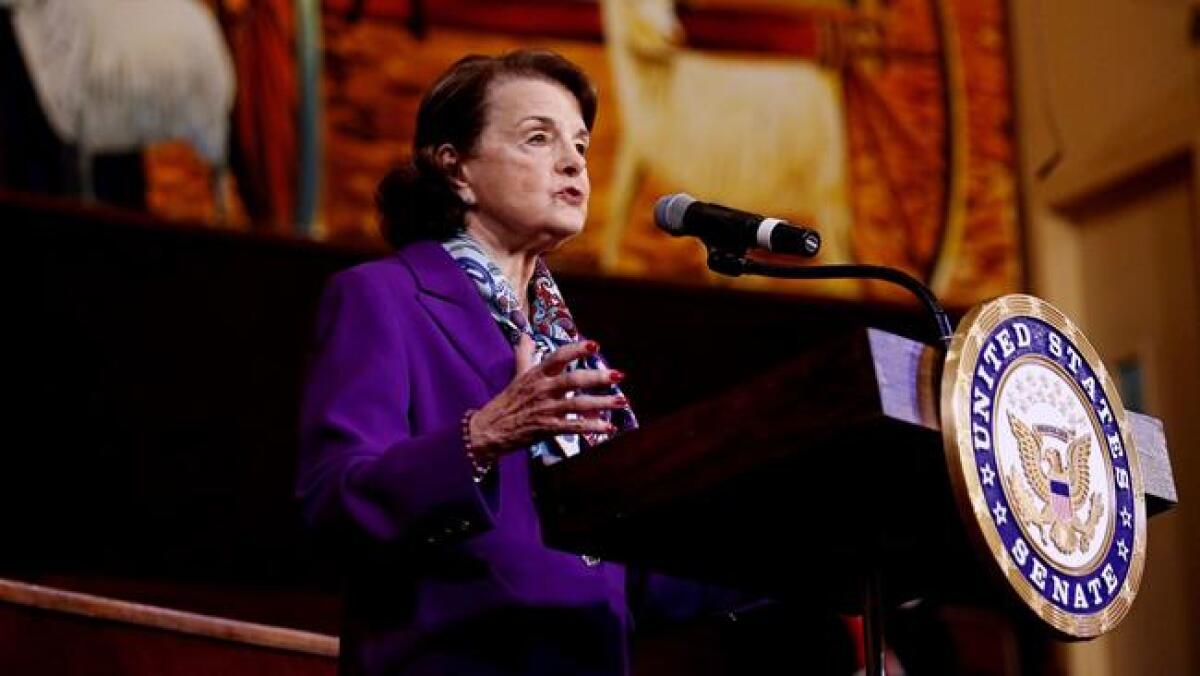
Any single event can mislead when it comes to deciphering the political environment. Many of the more than 18,000 people clamoring for Hillary Clinton on the Ohio State University campus in mid-October — her biggest audience to that point in the presidential campaign — probably did not foresee her blowout defeat in the state less than a month later. Nor did many see Donald Trump surviving the cataclysmic events that enveloped his presidential campaign.
But, with appropriate caution, it’s safe to say that last week’s Los Angeles town halls featuring Dianne Feinstein and Kamala Harris spoke to the crosscurrents among Democrats today and the different approaches by — and difficulties facing — California’s two senators.
Both town halls were held in politically active African American churches south of downtown: Feinstein’s at First African Methodist Episcopal and Harris’ at Holman United Methodist Church. The locations appeared calculated to set a floor of civility. At First AME, Feinstein spoke of the warmth she’d felt from that congregation going back decades; at Holman, the Rev. Kelvin Sauls reminded those gathered to see Harris that “we are in a sacred place.”
Warmth wasn’t all that greeted Feinstein, who heard catcalls throughout from a crowd far more demanding than the one that greeted Harris the following day.
The differences were obvious between the two Democrats, one starting her Washington career with more than five years to go before reelection, the other pondering whether to run for a fifth full term in 2018.
Trump thinks 100-day report cards are lame. Is he right?
On Saturday, President Trump will observe a milestone: his 100th day in office.
It’s also a millstone.
For nearly half a century, the marker has been used by pollsters, pundits and others who presume great wisdom to size up a fledgling White House and its still-green occupant.
Presidents of both parties have objected to the somewhat arbitrary nature of the evaluations, which, in truth, don’t always coincide with the longer view of history.
“You can use the first 100 days to try to understand some of the style of a presidency,” said Julian E. Zelizer, a Princeton scholar who has written extensively on presidents and politics. “But we really need to limit our analysis to that.”
Even so, birds fly, fish swim and political observers are going to issue their report cards whether the president likes it or not, which this one most certainly does not.
Here’s our take:
Trump signs order that could open California coastal waters to new drilling
President Trump has signed an executive order that could open large parts of the Pacific, Arctic and Atlantic oceans to new oil and gas drilling, creating yet another clash with California, where leaders are vowing they will do everything in their power to block new drilling off the state’s shores.
Trump’s move, which is certain to face legal and political challenges, could undo a plan finalized late in President Obama’s second term that sought to limit fossil fuel development and fight climate change by not including new drilling leases off the coast of California or Alaska during the current five-year federal offshore plan, which extends through 2022.
Many leaders in California have long sought a permanent ban on new leasing offshore, and they reacted swiftly to the possibility that drilling could expand.
Trump promised the directive “will make America energy secure” and “create greater prosperity and security for all Americans.”
“It’s going to lead to a lot of great wealth for our country, a lot of great jobs for our country,” he said.
Trump heads to friendly NRA audience ahead of 100-day mark
President Trump is scheduled to head to Atlanta on Friday afternoon to bask in the adulation of one of his friendliest audiences -- the National Rifle Assn. -- part of an effort to excite supporters and convey a sense of accomplishment ahead of the 100-day mark of his presidency.
The group, which is holding its annual leadership forum, backed Trump nearly a year ago, sooner and more forcefully than other major conservative organizations.
The organization called the Supreme Court vacancy the election’s most important issue, and Trump has not disappointed on that front. He and his advisors tout the selection and approval of Neil M. Gorsuch as Trump’s top legislative accomplishment ahead of Saturday’s 100-day mark.
Trump has made dismissive comments about the 100-day measurement, in large part because he has not passed any major laws and suffers from record-low approval ratings. But Trump has been eager to prove his administration’s efficacy nonetheless, putting out talking points, granting interviews and planning speeches. He plans to hold a rally Saturday night in Pennsylvania, a crucial electoral state and home to some of his most enthusiastic crowds during the election.
Trump has said in interviews that the presidency is not as easy as he once thought.
He raised alarms in one of his latest major interviews, Thursday night with Reuters, floating the possibility of conflict with North Korea over its nuclear program.
“There is a chance that we could end up having a major, major conflict with North Korea. Absolutely,” Trump told the news agency.
“We’d love to solve things diplomatically but it’s very difficult,” he said.
During his trip to Georgia, Trump is also scheduled to appear at a fundraiser for Karen Handel, the Republican candidate in a House race that has been tougher for the party than expected. The race, featuring 30-year-old Democrat Jon Ossoff, has galvanized Trump’s opponents at the national level.
Short of support, House won’t vote on revised GOP healthcare bill this week
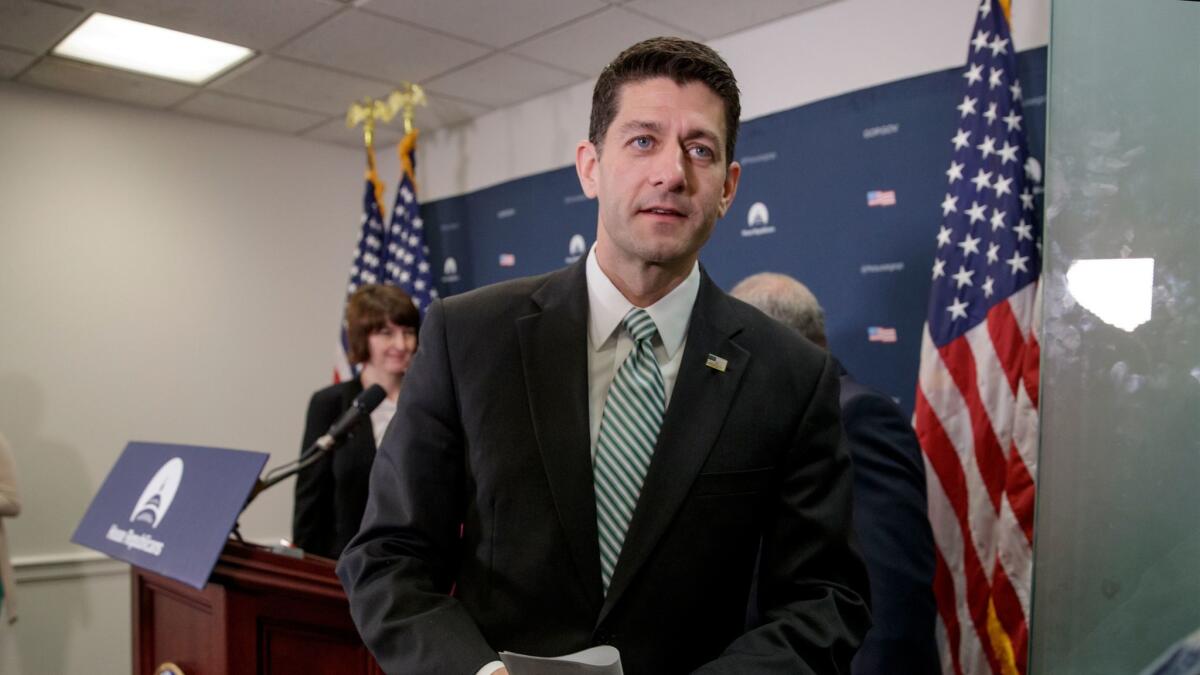
The House won’t vote on Republican legislation that would scuttle much of President Obama’s healthcare law until at least next week, a GOP leader said late Thursday. The decision deals a setback to the White House, which has pressured congressional Republicans to pass the bill by Saturday, President Trump’s 100th day in office.
“As soon as we have the votes, we’ll vote on it,” House Majority Leader Kevin McCarthy (R-Bakersfield) told reporters after leaving a meeting of the House GOP leadership that lasted nearly two hours. He said the vote would not occur Friday or Saturday.
White House and Republican leaders had labored all day to wring votes out of resistant moderate GOP lawmakers for the healthcare measure. But they remained shy of the number they’d need to revive a Republican bill that was withdrawn last month for lack of support, and it was uncertain when a vote on the revamped legislation might occur.
How some of the Supreme Court’s conservative opinions may lead to a liberal victory on sanctuary cities
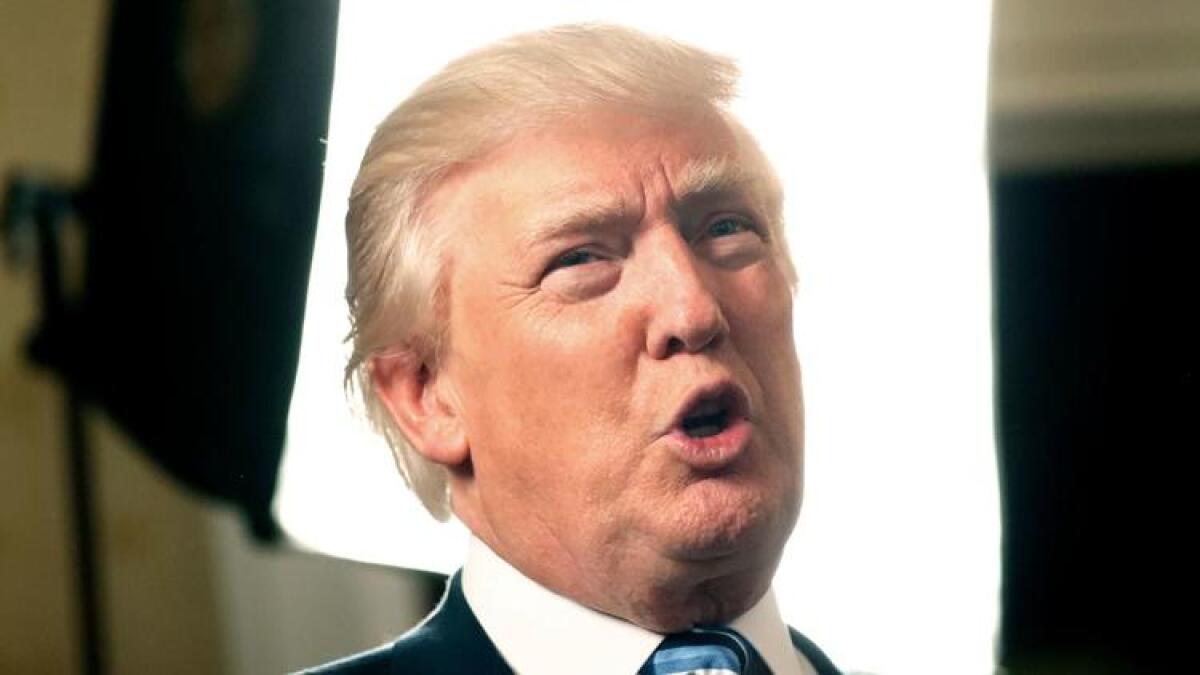
Liberal sanctuary cities in California and elsewhere may well win their legal battle against President Trump thanks to Supreme Court rulings once heralded by conservatives, including a 2012 opinion that shielded red states from President Obama’s plans to expand Medicaid coverage for low-income Americans.
On Tuesday, a federal judge in San Francisco temporarily blocked enforcement of Trump’s sanctuary city executive order, resting his ruling on high court decisions that protected states and localities from federal meddling.
Senate confirms Alex Acosta as secretary of Labor, completing Trump’s Cabinet
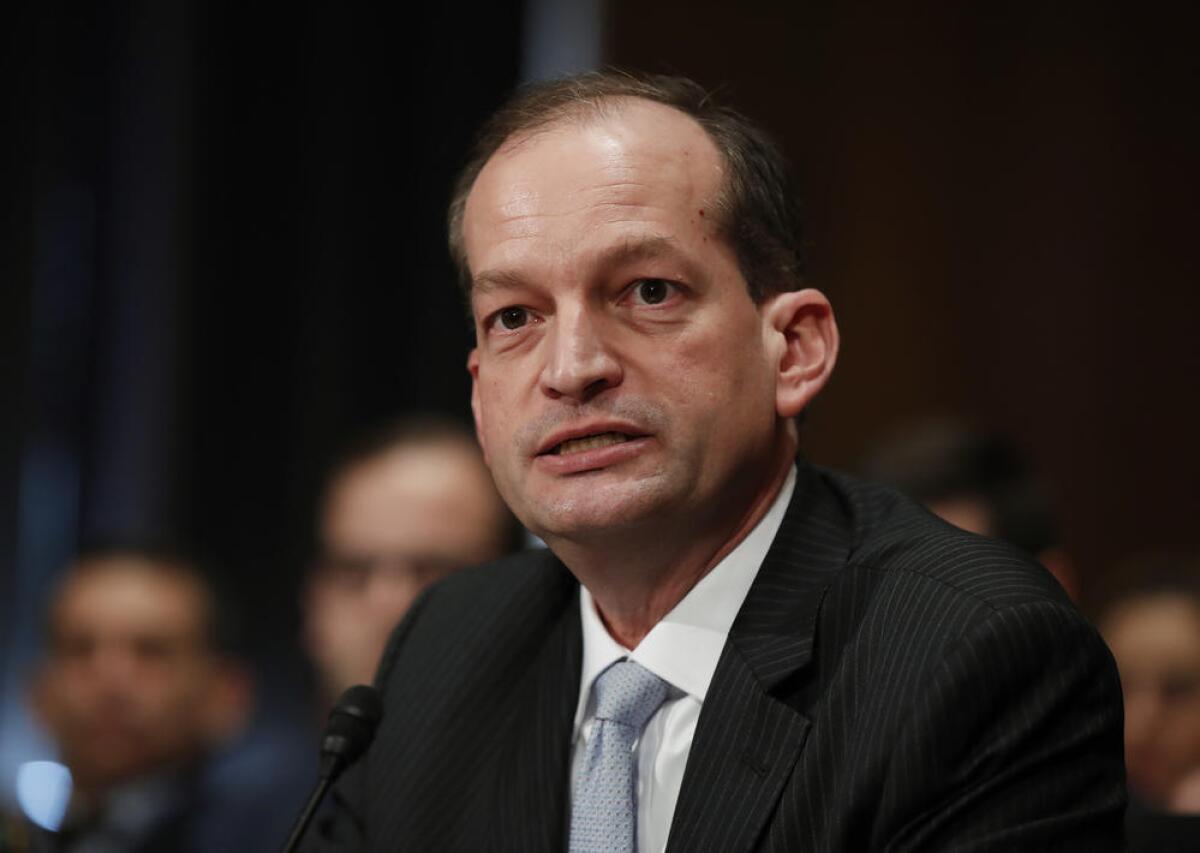
The Senate on Thursday confirmed Alex Acosta as secretary of Labor, filling out President Trump’s Cabinet as he approaches his 100th day in office.
The 60-38 vote confirms Acosta to the post. Once sworn in as the nation’s 27th secretary of Labor, the son of Cuban immigrants will lead a sprawling agency that enforces more than 180 federal laws covering about 10 million employers and 125 million workers.
Acosta has been a federal prosecutor, a civil rights chief at the Justice Department and a member of the National Labor Relations Board. He will arrive at the top post with relatively little clear record on some of the top issues facing the administration over key pocketbook issues, such as whether to expand the pool of American workers eligible for overtime pay.
Acosta wasn’t Trump’s first choice for the job. Former fast food CEO Andrew Puzder withdrew his name from consideration last month, on the eve of his confirmation vote, after becoming a political headache for the new administration.
Puzder acknowledged having hired a housekeeper not authorized to work in the United States and paying the related taxes years later — after Trump nominated him — and came under fire from Democrats for other issues related to his company and his private life.
Labor secretary is the last Cabinet post for Trump to fill. Trump’s choice for U.S. trade representative, a job considered Cabinet-level, is awaiting a Senate vote.
Trump gives ‘dirty war’ records to Argentina’s leader

President Trump on Thursday handed over to Argentine President Mauricio Macri a trove of declassified documents from the South American nation’s military-led “dirty war.”
The documents contain hundreds of pages of presidential notes, CIA memos, FBI reports and other records that in many cases chronicle human rights atrocities committed by Argentine military officials when they ruled the country from 1976 to 1983.
The dirty war was backed at least tacitly by U.S. officials during that era, historians say. An estimated 30,000 dissidents were killed, and untold thousands of children were kidnapped.
President Obama, during a visit last year to Buenos Aires, said he would give Macri the now-declassified material. Trump, receiving Macri Thursday at the White House, made good on Obama’s promise.
It was the third batch to be released as the U.S. government gradually declassifies the material and came at Macri’s request, the White House said.
The National Security Archive, a nonprofit organization that examines once-secret papers, welcomed the decision to release more information, saying it both helps to set the historical record straight and shows what U.S. officials knew at the time but often ignored.
It published several of the documents released Thursday, including one in which State Department officials described the notorious Operation Condor campaign by the secret police services of Argentina, Chile and Uruguay in the 1970s to hunt down and “liquidate” opponents across international borders.
In another document, from 1977, State Department officials questioned whether they should continue to work with those same countries’ security services, given the egregious human rights abuses committed by them.
Thursday’s release “is another positive act of declassified diplomacy that began with Obama and is continuing under the Trump administration,” the National Security Archive’s Carlos Osorio said in a statement.
“Historical accountability continues to play an important role in current U.S. foreign relations,” he said.
Congress races to approve stopgap spending bill to avoid shutdown, but GOP’s Obamacare repeal remains work in progress
Congress hopes to avoid a government shutdown by swiftly approving a stopgap spending bill Friday to allow negotiations to continue for another week on a longer-term funding deal.
Progress continued in the talks to finalize the must-pass legislation and avert a crisis as President Trump prepares to mark his first 100 days in office.
The deal is likely to include a sizable boost of about $15 billion in defense spending supported by both parties, about half the amount Trump was seeking for the rest of the 2017 fiscal year that ends Sept. 30.
But negotiators Thursday were still trying to narrow a few unresolved issues -- a coal miners pension fund that’s going broke, policy restrictions on abortion and aid to Puerto Rico.
House Speaker Paul D. Ryan (R-Wis.) predicted Thursday the temporary measure to keep government running would be approved.
“I’m confident we’ll be able to pass a short-term extension,” Ryan said.
The Republicans, though holding a majority, usually need Democrats’ votes to pass bills funding the government because the most conservative GOP members often oppose any federal spending increases.
In one twist Thursday, Democrats threatened to withhold their votes if Republicans tried to link passage to the latest GOP effort to repeal the Affordable Care Act. But that strategy never seemed to materialize. The GOP’s Obamacare overhaul remained a work in progress.
Trump amplified tensions in a series of morning tweets trying to shift blame for any disruption in government operations onto Democrats.
“The Democrats want to shut government if we don’t bail out Puerto Rico and give billions to their insurance companies for OCare failure,” he tweeted, using shorthand for Obamacare. “NO!”
Democrats said they might withhold their votes on the stopgap measure -- forcing Republicans to rely on their majorities in the House and Senate to pass it without them -- if Republicans also voted on the GOP’s latest emerging plan to dismantle the healthcare law.
But they, too, were already assigning blame, should the stopgap measure fail to pass.
“We are never going to shut the government down,” said House Minority Leader Nancy Pelosi (D-San Francisco), putting the onus on Republicans. “Any shutting down of the government, the ball is in their court. They have a record of doing that on more than one occassion.”
Pelosi said it would be the “height of stupidity” for Republicans to merge the issues, and suggested Trump is “making a fool” of Republicans by forcing the healthcare vote.
Republicans led government shutdowns when they had the House majority in the1990s and again in 2013.
As Trump’s 100-day milestone neared, some lawmakers said Republicans would stay in town later Friday or Saturday to vote on the latest version of the GOP healthcare overhaul, the American Health Care Act.
But the speaker was less certain about the schedule for those votes.
“We’re going to go when we have the votes,” Ryan said.
The Republican healthcare bill remains highly unpopular, with estimates of 24 million more Americans going without health insurance if it becomes law.
In the latest version of the healthcare bill, Republicans are considering tacking on an amendment that was designed to win over the most conservative members of their majority by giving states the option of doing away with the so-called essential health benefits that Obamacare requires insurers to provide.
That means states could seek a waiver to end popular provisions in Obamacare, including coverage for mental health and maternity care and the ban on charging higher premiums to patients with pre-exisiting conditions.
Republicans argue this will allow states to offer cheaper insurance plans, bringing costs down for consumers. But Democrats say it will result in bare-bones policies with very limited coverage or policies that are too costly for those with medical problems.
While the amendment has been embraced by the conservative House Freedom Caucus, it is till being debated by more centrist lawmakers who worry about Americans losing health insurance. Both factions tanked the GOP’s earlier version of the healthcare bill.
Rep. Chris Collins (R-N.Y.), a Trump ally, said new approach may be pushing centrist lawmakers away from the bill. “It’s probably moved some members from lean yes to lean no,” he said. “There’s no doubt there’s a frustration there.”
Prospects for the healthcare bill in the Senate remain highly uncertain.
“Even if it passes the House, the chances for survival in the Senate are small,” said the chamber’s minority leader, Sen. Charles E. Schumer (D-N.Y.)
Meanwhile, talks continue on a spending bill to keep government running through September.
At issue is whether to permanently fund a pension fund for retired coal miners that risks being gutted, eroding pension and health insurance payments, without government assistance.
Democrats and key Republicans, including Senate Majority Leader Mitch McConnell (R-Ky.) want to salvage the pension fund, but other Republicans are concerned about the costs and prefer propping it up for a shorter amount of time.
Another concern is over Puerto Rico’s struggling Medicaid program, which is running short on funds and could lead to 900,000 residents losing healthcare coverage by the end of the year. Democrats want to provide Puerto Rico aid, but Trump called it a “bailout.”
Republicans, meanwhile, are pressing for policy provisions, including one that will prevent the federal government from blocking funds or otherwise discriminating against healthcare providers that refuse to offer abortion services.
Republicans are also interested in including a provision that would loosen regulations governing some financial services professionals.
The temporary spending bill, expected for a vote Friday, would fund the government for another week, through May 5.
1:33 p.m.: This post has been updated with the latest developments.
This Democratic bastion flipped for Trump. Almost 100 days in, voters have no regrets
To read the polls and hear the pundits, President Trump’s first 100 days have been an utter disaster, ranking among the worst in history. But that’s not how Karen Malady sees it.
The 59-year-old accountant was drawn to Trump’s unconventional candidacy from the start, unlike other Republicans who came around reluctantly. She saw him as an outsider and disrupter, and his first months in office proved her right, she said, about that and other things too.
Like no matter how much he tries, some won’t ever give Trump a fair shake.
“He’s trying to build a foundation to protect this country, and they just pick apart the little things,” Malady said, as fading daylight slanted into the headquarters of the Fraternal Order of Eagles, a nonprofit charity. “ ‘This person was picked on, and, oh, by the way, this person is of that nationality, so that makes him a racist.’ ”
The anger and aggrievement that fueled Trump’s unlikely election, the sense of abandonment by a self-interested political establishment and sneering condescension from the know-it-alls hasn’t faded in the months since Trump took office.
If anything, it has deepened here in Pueblo County, a longtime Democratic stronghold that Trump narrowly won in November.
Two U.S. troops killed and one wounded in Afghanistan, near where massive bomb was dropped
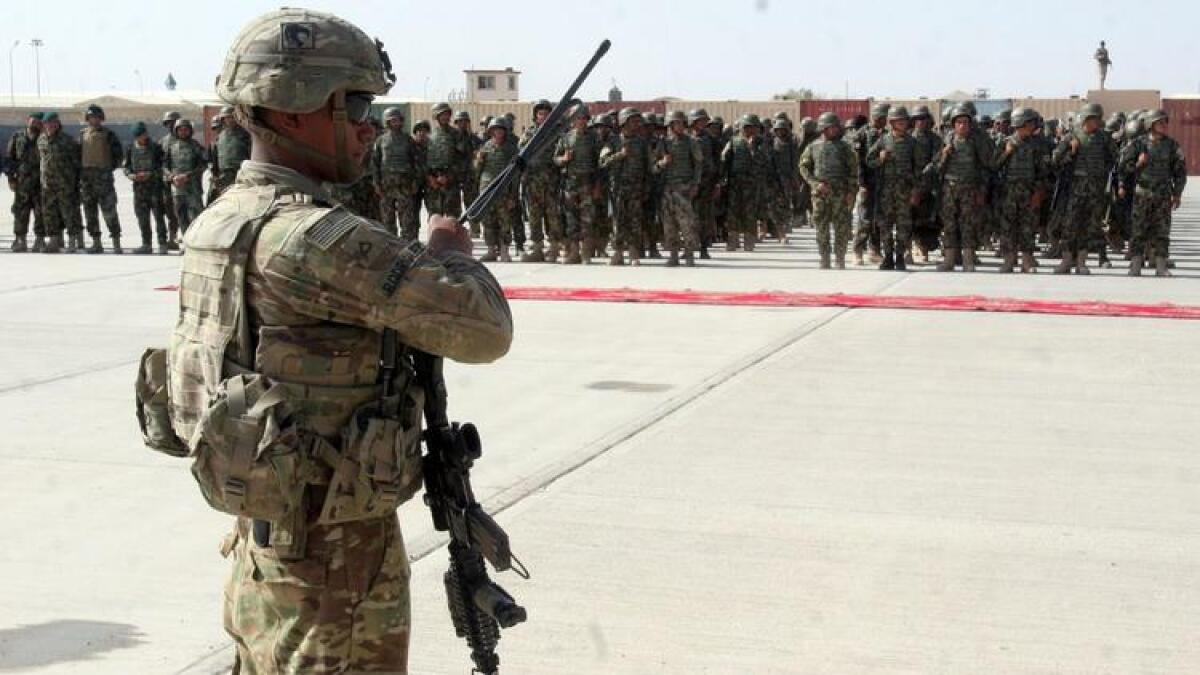
The Pentagon said two American troops were killed and a third wounded Wednesday night during a raid against Islamic State’s affiliate in eastern Afghanistan, near the site where an 11-ton U.S. bomb was dropped earlier this month.
The service members were conducting an operation alongside Afghan forces in Nangarhar province, where a U.S.-backed offensive is underway against Islamic State-Khorasan, or ISIS-K. Khorasan is the historic name for a region that encompassed parts of modern-day Afghanistan.
“The fight against ISIS-K is important for the world, but sadly, it is not without sacrifice,” said Gen. John W. Nicholson Jr., commander of U.S. forces in Afghanistan. “On behalf of all U.S. forces and our coalition partners, I offer our deepest sympathies to the families, friends, and fellow service members of our fallen comrades.”
The deaths occurred as U.S. and Afghan forces were conducting a raid against a prison where Islamic State kept civilians as prisoners, said Attaullah Khogyani, a spokesperson for the Nangahar governor’s office.
There now have been three U.S. service members killed fighting Islamic State in Afghanistan in 2017 -- all in Nangarhar.
That is the province where, on April 12, the U.S. military dropped the most powerful conventional bomb in its arsenal on a cave-and-tunnel complex that it said was used by Islamic State fighters.
The Massive Ordnance Air Blast bomb — dubbed the “mother of all bombs” and the largest non-nuclear weapon ever used in combat — targeted the subterranean passages the militants used for weeks to evade an ongoing operation by U.S. and Afghan forces.
Afghan officials have said that 94 militants were killed in the bombing and another 40 killed in Wednesday night’s operation.The U.S. military has refused to comment on battle casualties suffered by Islamic State, which is estimated to have about 700 fighters in Afghanistan.
Army Staff Sgt. Mark R. De Alencar, a 37-year-old Green Beret from Maryland, became the first American service member killed in combat this year in Afghanistan on April 8 after coming under fire in Nangarhar’s Achin district.
There have been 1,835 American troops killed in action since U.S.-led invasion in late 2001.
Economic reality and contradictions beset Trump’s tax plan
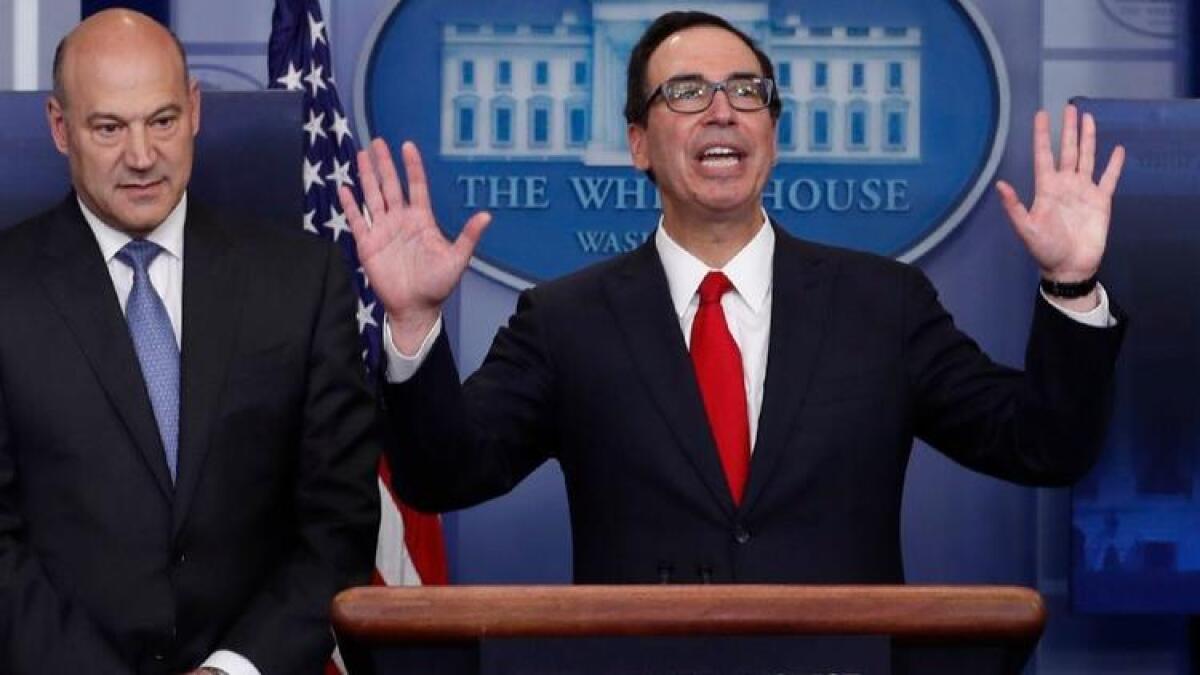
In proposing to slash business taxes and enact a tax reform of historic proportions, Trump administration officials say they will rely largely on economic growth to make up for the trillions of dollars of lost tax revenue.
But hardly any economist or tax policy analyst outside the administration thinks that the core business piece of President Trump’s plan — a reduction in the corporate income tax rate to 15% from the current 35% — will generate anywhere near the growth, job creation and investment needed to pay for itself.
That economic reality makes it highly unlikely that Trump will be able to get his tax proposal in its current form through Congress, even with support from his fellow Republicans. And it exposes some inherently contradictory elements in the president’s approach.
White House announces sweeping proposal to cut taxes, a plan likely to raise deficit
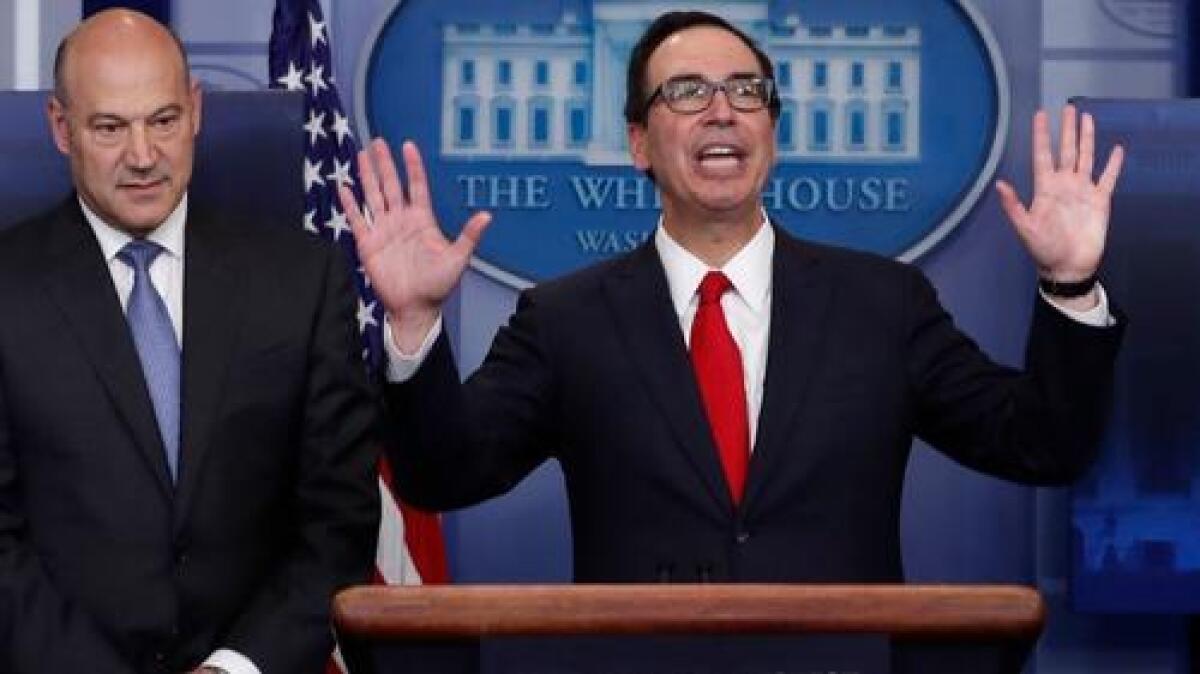
Bracing to convey a sense of momentum to President Trump’s sluggish legislative agenda, the White House unveiled a plan for what it called “one of the biggest tax cuts in American history” Wednesday, just ahead of the administration’s first 100 days in office.
The one-page outline, touted as an overhaul of the tax code, bears the hallmark of other early Trump proposals: a broad-brush overview of bold goals that is intended to serve as an opening bid with Congress rather than a fully baked policy proposal.
The plan was immediately met with skepticism from budget groups and faces a daunting future on Capitol Hill. Lawmakers from both parties are wary that the White House hasn’t said how it would pay for the cuts, which likely would provide the greatest benefits to higher-income earners and corporations.
Pentagon is investigating whether Trump’s former national security advisor accepted improper foreign payments
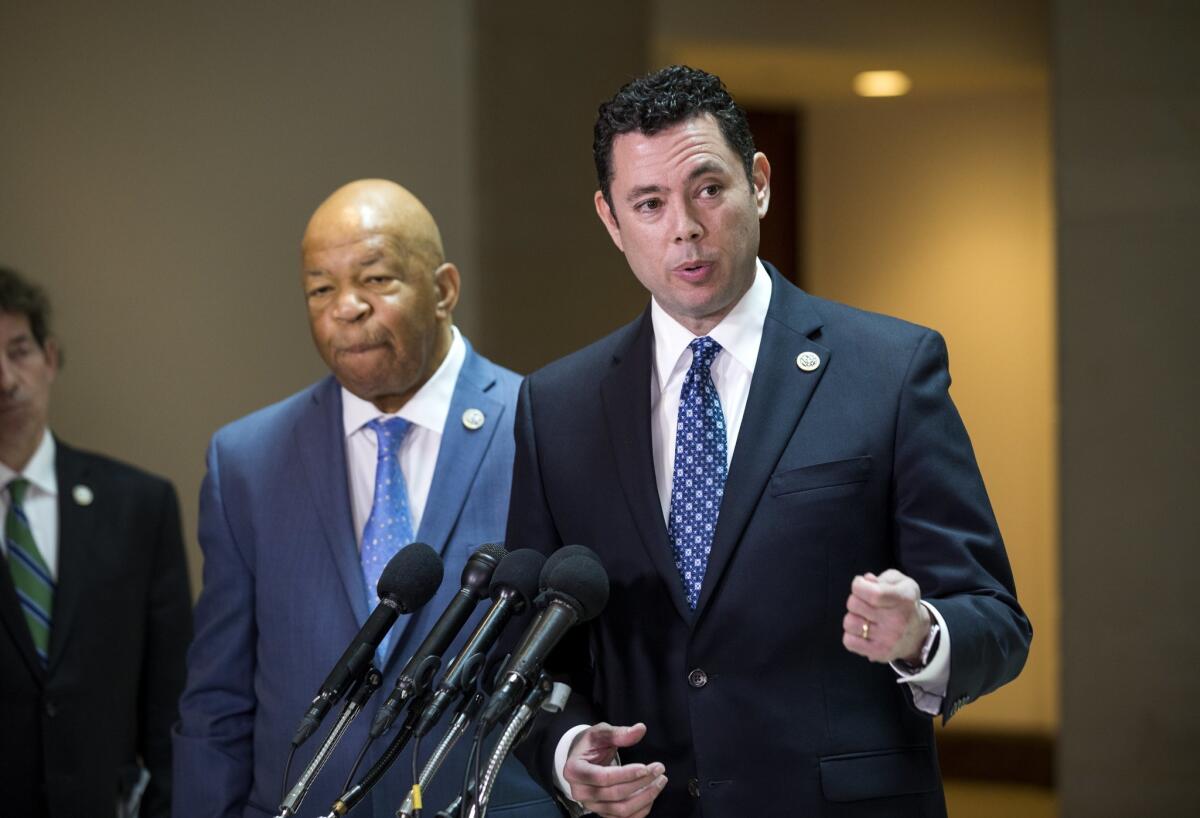
Former National Security Adviser Michael Flynn’s legal troubles worsened Thursday when a House committee disclosed that the Pentagon inspector general is investigating whether the retired Army three-star general violated military rules by accepting foreign payments.
Flynn was warned in 2014, when he was retiring from the military, not to accept payments from foreign governments without advance approval from the Pentagon, according to documents released Thursday by a House committee.
Flynn subsequently accepted more than $500,000 from a Russian government-owned broadcasting company and from a lobbying company representing Turkey, according to the committee.
The Pentagon inspector general is investigating whether Flynn “failed to obtain required approval” to accept those funds, Acting Inspector General Glenn A. Fine wrote in an April 11 letter to the House Oversight Committee, which is investigating Flynn’s foreign business ties.
Retired officers found to have violated the prohibition on accepting foreign payments can be ordered to return pension payments during the time of the violations, according to the Pentagon.
The committee probe is one of several in Congress looking at whether any of President Trump’s current or former aides improperly coordinated with Russian operatives during last year’s presidential campaign. The FBI is conducted a separate counter-intelligence investigation.
Earlier this week, the House committee said that Flynn also failed to disclose the foreign payments when he signed a government disclosure form required to renew his security clearance in early 2016, shortly after he had returned from Moscow.
After leaving the military, Flynn opened a government relations company and became a top adviser to the Trump campaign last year. President Trump subsequently named him as national security advisor.
But Flynn was forced to resign after less than a month at the White House after news reports revealed he had misled Vice President Pence and other White House officials about his conversations in December with Russia’s ambassador about easing U.S. sanctions on Russia.
Military officers, including retirees, are barred under the Constitution from accepting payments, gifts or items of value from foreign government without congressional permission.
The Defense Intelligence Committee, the Pentagon spy agency that Flynn headed before he retired, said in a letter to the House committee that it had found no evidence Flynn sought permission to accept foreign government payments.
The DIA did not locate any records of Flynn “seeking permission or approval for the receipt of money from a foreign source,” Christine Kapnisi, the agency’s acting head of congressional relations, said in an April 11 letter to the committee.
Flynn accepted a $33,750 fee to attend a December 2015 gala in Moscow sponsored by RT, a Russian state-run TV network, and to attend a lunch where he sat beside Russian President Vladimir Putin.
Flynn’s company, Flynn Intel Group, also received $530,000 last fall — at the height of the presidential campaign — for work that benefited the government in Turkey, the committee has found. Flynn retroactively disclosed that work last month on a federal disclosure form.
Flynn was reminded when he retired that accepting unauthorized payments from foreign governments was prohibited, according to the DIA letter.
He “was advised of the legal restrictions concerning foreign compensations and instructed to report any potential receipt of compensations in advance,” DIA said.
Flynn’s attorney, Robert Kelner, said this week that his client told the DIA about his 2015 trip to Moscow. Kelner’s statement did not say if Flynn disclosed the fee he was offered by the Russian government TV network.
“As has previously been reported, General Flynn briefed the Defense Intelligence Agency… extensively regarding the RT speaking event trip both before and after the trip, and he answered any questions that were posed by DIA concerning the trip during those briefings,” Kelner said.
House Republicans offer stopgap bill to fund government
Republicans controlling the House have unveiled a stopgap bill to keep the government open past a shutdown deadline of midnight Friday.
House Appropriations Committee Chairman Rodney Frelinghuysen (R-N.J.) says the one-week measure would buy time to wrap up talks on a $1-trillion-plus catchall spending bill that’s the center of bipartisan talks on Capitol Hill. He says those negotiations are going well.
The temporary bill is likely to come to a House vote Friday in the expectation the Senate would immediately send it to President Trump for his signature.
Talks on the larger spending bill have progressed in fits and starts, with the Trump White House backing away from demands that it include money to begin construction of a wall along the U.S.-Mexico border — though other stumbling blocks remain.
Trump says he won’t pull out of NAFTA
President Trump has told the leaders of Mexico and Canada that he will not pull out of the North American Free Trade Agreement.
The White House made the surprise announcement in a read-out of calls Wednesday between the world leaders.
The White House says the president “agreed not to terminate NAFTA at this time.”
Instead, Mexican President Enrique Peña Nieto and Canadian Prime Minister Justin Trudeau “agreed to proceed swiftly, according to their required internal procedures, to enable the renegotiation” of the trade deal to “the benefit of all three countries.”
Read related: Trump slaps tariffs on Canadian lumber imports, escalating trade tensions >
Trump has blamed NAFTA for American job losses.
He says he believes “that the end result will make all three countries stronger and better.”
All 100 senators head to White House for classified briefing on North Korea
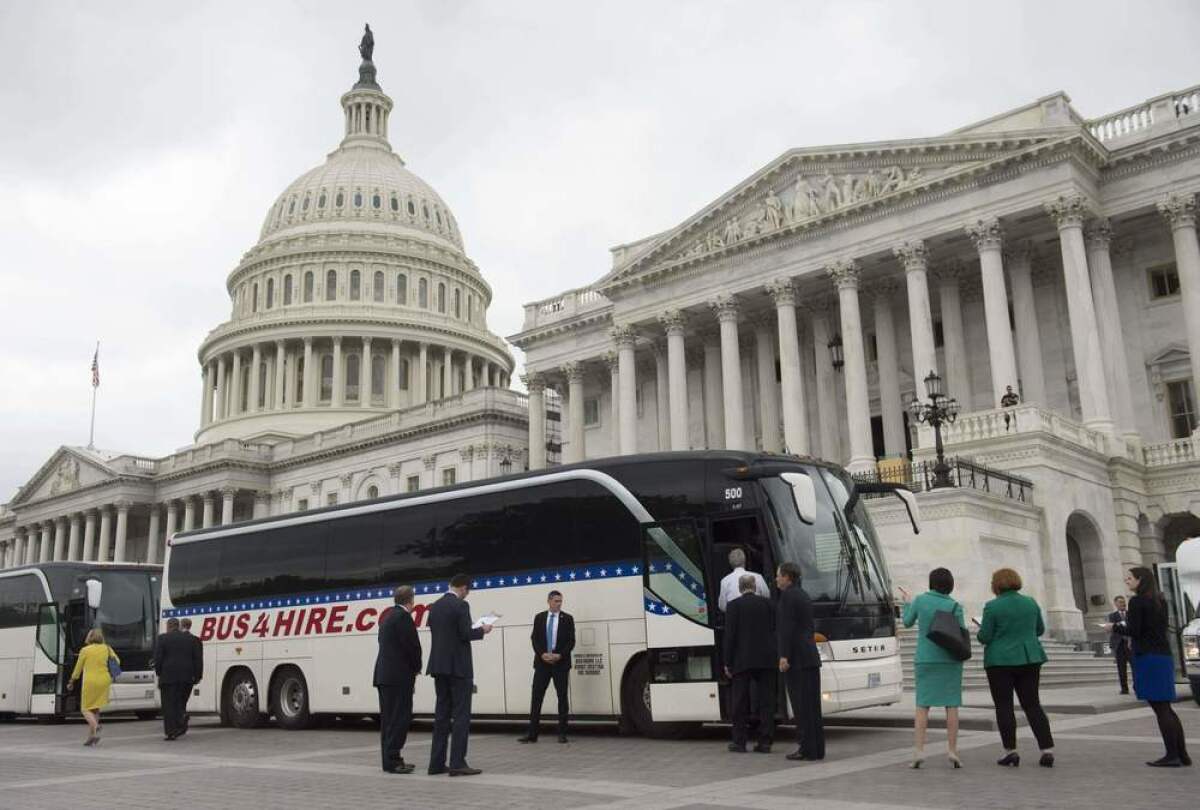
The Trump administration hosted senators for an extraordinary White House briefing Wednesday at a perilous moment with North Korea, marked by nuclear threats from the unpredictable nation and stern talk of military action, if necessary, from the United States.
All 100 senators were invited and taken in buses for the unprecedented, classified briefing. President Trump’s secretary of State, Defense secretary, top general and national intelligence director were to outline for them North Korea’s escalating nuclear capabilities and U.S. response options, officials said. The briefing team was to meet later with House members in the Capitol.
The unusual sessions don’t necessarily presage the use of force along one of the world’s most heavily militarized frontiers, and some lawmakers questioned whether the cross-Washington procession was largely show, with Trump expected to drop in on the Eisenhower Executive Office Building gathering of lawmakers.
But it certainly reflected the increased American alarm over North Korea’s progress in developing a nuclear-tipped missile that could strike the U.S. mainland. And the recent flurry of military activity on and around the divided Korean peninsula has put the world at high alert.
Tension has escalated since Trump took office three months ago, determined to halt Pyongyang’s nuclear and missile advances.
America’s Pacific forces commander, Adm. Harry Harris Jr., told Congress on Wednesday that a contentious missile defense system would be operational within days. He said any North Korean missile fired at U.S. forces would be destroyed.
“If it flies, it will die,” Harris said.
U.S. commander takes blame for wayward aircraft carrier: ‘That’s my fault’
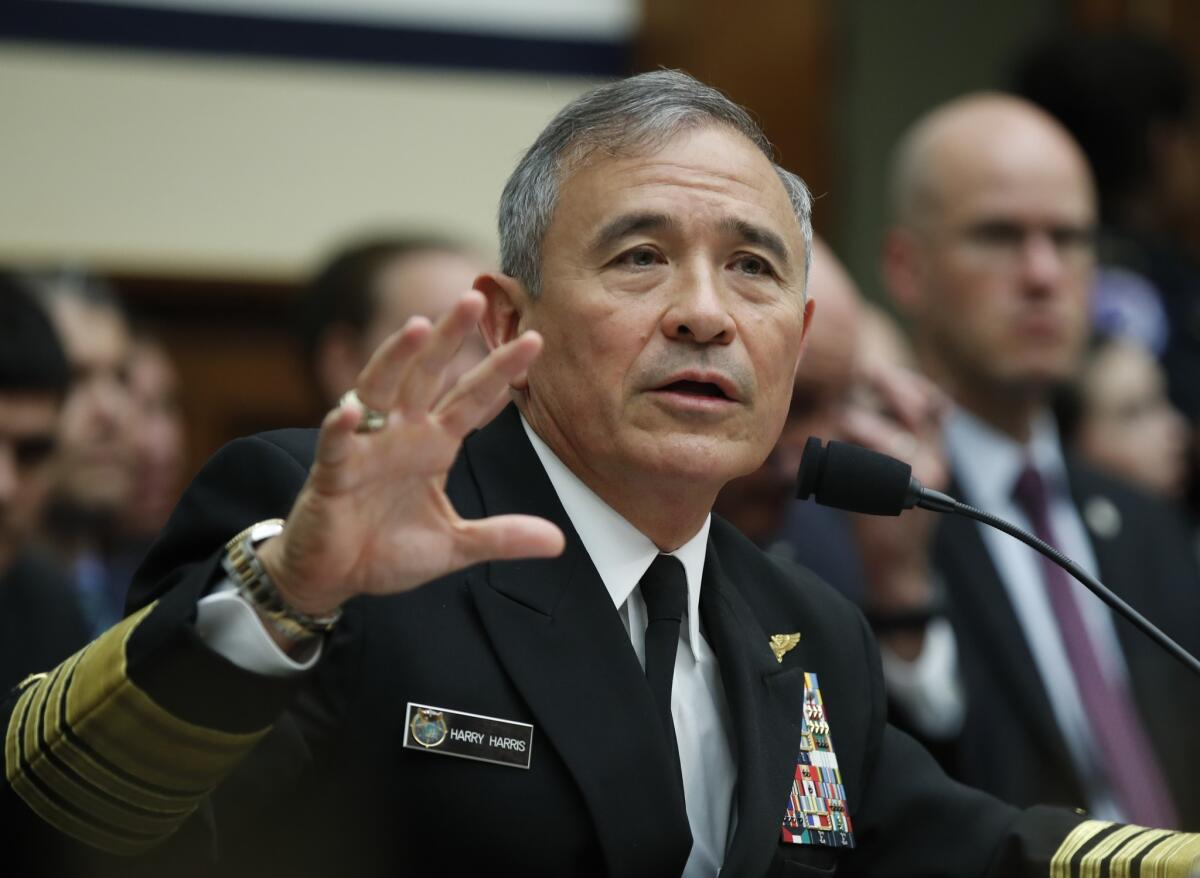
The commander of U.S. forces in the Pacific Ocean took personal responsibility Wednesday for a series of White House and Pentagon misstatements that led to global confusion about an aircraft carrier strike group supposedly headed to North Korea.
“That’s my fault,” Adm. Harry Harris told the House Armed Services Committee. “I’ll take the hit for that.”
The embarrassing episode began on April 8 when the Navy announced that the Carl Vinson strike force was being diverted north from Singapore as a show of force during rising tensions with North Korea.
The carrier group instead conducted exercises in the Indian Ocean for a week, and was still in Indonesian waters last weekend. It is now east of Okinawa, or about 1,000 miles southeast of North Korea, Harris said.
The carrier’s announced detour north contributed to concerns that a conflict might be imminent, especially because it came shortly after the Trump administration had launched a missile strike in Syria and dropped the so-called mother of all bombs in Afghanistan.
Harris also told the committee that North Korea was making steady progress in its efforts to develop intercontinental ballistic missiles tipped with nuclear warheads capable of reaching the United States. It is believed to be several years away from reaching that goal.
Pyongyang has conducted five underground nuclear tests over the last 11 years. But it has not mastered the ability to produce a warhead small enough and hardy enough to withstand the extreme heat a ballistic missile reentering the atmosphere would be subject to.
In an April 15 parade, it showed off missile tubes that experts said appeared capable of crossing the ocean, but North Korea has not tested any of them yet.
Harris warned, however, that achieving the goals set by North Korea’s leader is only a matter of time.
“With every test, Kim Jong Un moves closer to his stated goal of a preemptive nuclear strike capability against American cities,” Harris told the House Armed Service Committee.
Regional tensions have soared in recent weeks with satellite photos indicating Pyongyang was planning a sixth nuclear test to mark a national holiday. It launched a mid-range missile instead that crashed into the ocean seconds after launch.
Several days later, Vice President Mike Pence stood on the deck of aircraft carrier Ronald Reagan docked in Japan and warned North Korea not to “test” the Trump administration.
The U.S. nuclear submarine Michigan arrived off Pusan, South Korea, on Tuesday in what is meant as a show of U.S. resolve, Harris said.
“As President Trump and [Defense Secretary James] Mattis have made clear, all options are on the table,” Harris said. “We want to bring Kim Jong Un to his senses, not to his knees.”
The entire U.S. Senate is scheduled to visit the White House on Wednesday for a briefing on North Korea amid questions about how the Trump administration intends to address Pyongyang’s advances.
Existing North Korean missiles are grossly inaccurate by U.S. standards. But they could still cause widespread casualties in South Korea and Japan, where the U.S. military has stationed more than 70,000 troops.
Harris acknowledged a “capability gap” over what North Korea could achieve with a missile attack, but said “we have to look at North Korea as if Kim Jong Un will do what he says.”
The Pentagon recently moved a missile defense system, called the Terminal High Altitude Area Defense system, to South Korea, and Harris said it would be operational “in the coming days” to help protect the country.
He advocated expanding the U.S. ground-based missile defense system, possibly to Hawaii.
“We need more interceptors,” Harris said.
The current system, which is designed to shoot down incoming warheads in space before they reach the United States, has 37 operational interceptors -- 33 at Ft. Greely, Alaska, and four at Vandenberg Air Force Base in Santa Barbara County.
‘We’ll see them in the Supreme Court’: Trump plans to defend his order threatening funding for ‘sanctuary cities’
President Trump plans to fight a U.S. judge’s decision to freeze his order threatening funding to state and local governments that refuse to cooperate fully with immigration agents.
“We’ll see them in the Supreme Court,” Trump said Wednesday in response to a question from a reporter while signing an executive order to look into rolling back the designation of some national monuments.
U.S. District Judge William H. Orrick III ruled Tuesday that Trump’s Jan. 25 order to cut some federal funding to so-called sanctuary cities and counties was unconstitutional.
The Trump administration plans to appeal the ruling from the district court, which falls under the U.S. 9th Circuit. If Justice Department lawyers lose the case before the left-leaning appeals court, they can ask the Supreme Court to weigh in.
Asked if he was surprised by the ruling, Trump said, “I’m never surprised by the 9th Circuit.”
Ninth Circuit judges also knocked down Trump’s order temporarily halting the U.S. entry of refugees and nationals from several countries in Africa and the Middle East.
On Twitter earlier Wednesday, Trump accused opponents of “judge shopping,” bringing the case in front of judges that would give favorable ruling.
Healthcare repeal gets boost from House Freedom Caucus
The conservative House Freedom Caucus is backing the latest healthcare proposal as the White House tries to revive efforts to repeal President Obama’s signature law.
In a statement Wednesday, the 40 or so hard-line members who helped scuttle the earlier bill announced their support for the plan crafted by New Jersey Rep. Tom MacArthur, a moderate, and North Carolina Rep. Mark Meadows, head of the House Freedom Caucus.
While the endorsement is a boost for the effort, some 50 moderate Republicans are still uncertain or oppose the latest plan.
The group said the new proposal will give states flexibility — and while it isn’t a full repeal of the 2010 Affordable Care Act, they are prepared to support it.
The proposed changes would let states get federal waivers to some coverage requirements Obama’s law imposed on insurers, such as providing basic services including maternity and newborn care, and preventive and wellness visits.
Trump’s executive order jeopardizes some national monuments
President Trump signed an executive order Wednesday intended to eventually reduce or eliminate some national monument designations, in particular those that are at least 100,000 acres.
The monuments received federal protection under Presidents Clinton, George W. Bush and Obama under the 1906 Antiquities Act, which gives presidents the power to limit use of public land for historic, cultural, scientific or other reasons.
The order could affect more than two dozen monuments that have been established since 1996. Interior Secretary Ryan Zinke said one region in particular will get special notice: the remote desert canyon lands of southeastern Utah. At the time, the designations of Grand Staircase-Escalante National Monument and Bears Ears National Monument prompted an angry backlash from Utah’s leaders.
But the monuments have been widely praised by the outdoors industry, environmental groups and Native American tribes that have inhabited the area for thousands of years.
Mexico’s foreign minister calls Trump’s wall ‘a hostile act’
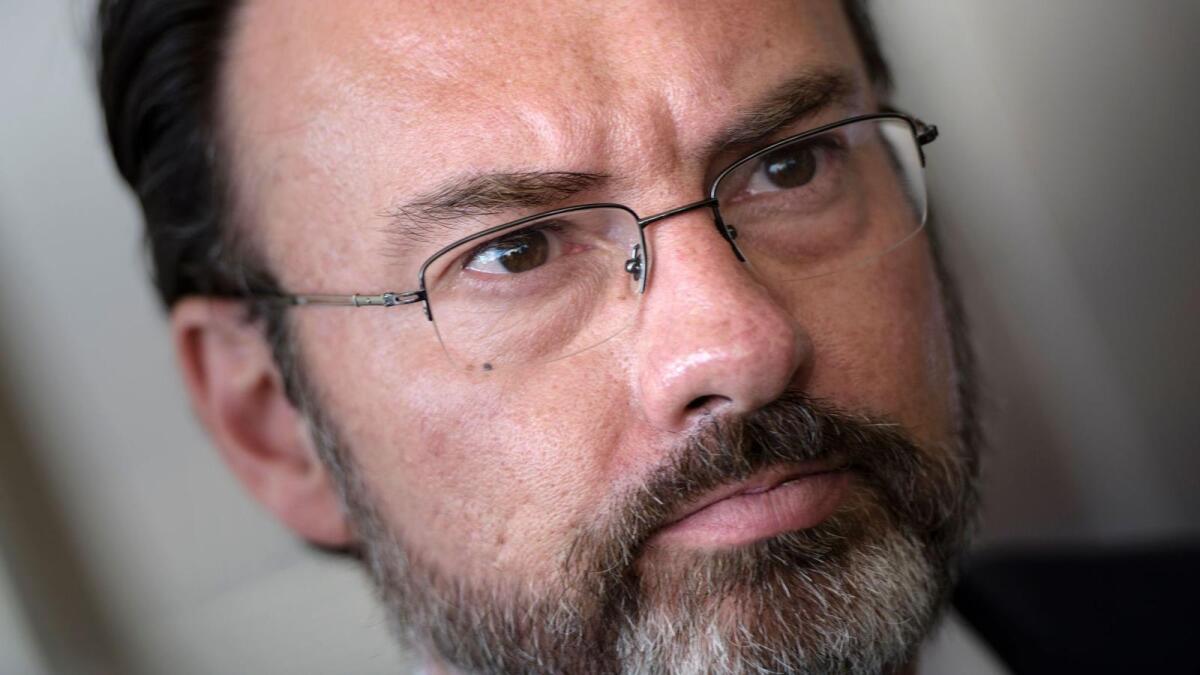
Mexico’s top diplomat called President Trump’s proposal to build a border wall “an unfriendly, hostile act” that will further aggravate increasingly tense relations between the longtime allies.
While Trump has repeatedly vowed to build a wall and make Mexico pay for its construction, Foreign Secretary Luis Videgaray told a meeting of Mexican legislators Tuesday that there is absolutely no way that will happen.
“It is not part of a bilateral discussion, and we will not collaborate in the construction,” Videgaray said. “It’s a waste of resources.”
Trump’s repeated criticisms of Latino immigrants and trade deals with Mexico while a candidate and now as president have offended many south of the border, where a surge in nationalism can be felt in the increasingly heated rhetoric of politicians as well as in advertisements and the proliferation of Mexican flags.
But Trump’s vow to make Mexico pay for a border wall is viewed here not only as an insult, but as a direct challenge to Mexico’s sovereignty.
On Tuesday, Videgaray repeated earlier threats that the Mexican government will consider reducing cooperation with the U.S. on security issues if bilateral talks on immigration and trade go badly.
Trump has indicated that he will soon trigger the process to get congressional approval to renegotiate the North American Free Trade Agreement.
Trump had requested that Congress provide U.S. funds to begin the wall, but he signaled Monday that he would not insist on it, saying he might be willing to wait until September for the funding.
Trump wants to lower business rate to 15% in ‘biggest tax cut’ in U.S. history, Mnuchin says
President Trump wants to sharply reduce the tax rate for all businesses -- from multinational corporations to mom-and-pop shops -- to 15% in the “biggest tax cut” in U.S. history, Treasury Secretary Steven T. Mnuchin said Wednesday.
But the Trump administration has not embraced a House Republican proposal to include a controversial border adjustment tax, Mnuchin said during a forum sponsored by the Hill newspaper.
The White House is set to announce “principles” for its tax overhaul later Wednesday although officials stressed it would not be a formal bill ready to go to Capitol Hill or to be formally analyzed by congressional number-crunchers.
Trump proposed a 15% business tax rate during the campaign and will push for that as he and congressional leaders negotiate legislation, Mnuchin said.
The current U.S. corporate tax rate is 35%, the highest among developed economies. Many smaller businesses don’t pay the corporate rate but funnel their income through the individual tax code. The highest individual rate is 39.6%.
Trump’s campaign proposal called for reducing the seven individual tax brackets to four, with the highest rate dropping to 25%.
“We want to make business competitive and we want to simplify the personal tax system, lower taxes and create economic growth,” Mnuchin said.
“So this is going to be the biggest tax cut and the largest tax reform in the history of our country, and we are committed to seeing this through,” he said.
House Republicans have been working on a plan that would reduce the corporate tax rate to 20%. And the House plan would offset some of the lost revenue through a border adjustment tax that would bring in about $1 trillion over the next 10 years.
That tax would subject importers, including retailers, to higher taxes and produce breaks for companies that export. The proposal has split the business community.
Mnuchin said the administration likes some aspects of the border tax but is not backing it right now.
“We don’t think it works in its current form and we’re going to continue having discussions with them about revisions,” he said of negotiations with House leaders.
The non-partisan Tax Policy Center estimated that Trump’s campaign tax plan, which includes eliminating the alternative minimum tax and other changes, would reduce federal revenues by $7.2 trillion over the first decade.
Mnuchin brushed off concerns that the tax cuts would balloon the federal budget debt by saying the plan would fuel stronger economic growth and produce more tax revenue.
The tax cuts will boost annual economic growth to 3% and “that growth will pay for the plan,” Mnuchin said.
Republicans plan to use controversial dynamic scoring, which assumes the effects of economic growth, to determine the tax plan’s budget impact.
While cutting the corporate rate is straightforward, assuring that other businesses that file individual tax returns pay a 15% rate is much more complicated.
Those companies are known as pass-through businesses because their income passes through the individual tax code, Many are small, owner-operated firms. But pass-throughs also can be large partnerships, such as hedge funds, law firms and some of Trump’s own businesses.
Mnuchin said the tax plan would be structured so the 15% rate “won’t be a loophole for rich people who should be paying higher rates.” He provided no details.
Democrats and many budget analysts are skeptical that Trump can slash business taxes without causing budget deficits to soar.
“We definitely need tax reform as a way to grow the economy,” said Maya MacGuineas, president of the Committee for a Responsible Federal Budget.
But she said higher economic growth won’t offset the plan’s lost revenues and it needs to be paid for by reducing tax breaks or other measures.
“What I don’t want to see is that this tax reform is going to be paid for by magic,” she said.
Cutting money for U.N. would harm U.S. power, ambassadors warn
Nine former U.S. ambassadors to the United Nations on Tuesday warned against Trump administration plans to slash funding of the world body, portraying such a move as a grave danger to American power.
The ambassadors’ warning, contained in a letter to congressional leaders, came a day after President Trump received members of the U.N. Security Council at the White House and gave them an undiplomatic lecture on what they’ve been doing wrong.
Trump has threatened to drastically reduce the sizable U.S. contribution to U.N. peacekeeping, health and other missions, which are made inefficient, as the president put it, by “bloat.”
Madeleine Albright, a former U.N. ambassador and the country’s first female secretary of State, said cutbacks at a time of numerous global crises would in fact weaken U.S. power and its position as a world leader.
“The United States needs to be doing more in the world, frankly, not less,” Albright said in a telephone briefing with reporters.
She was one of nine former ambassadors to the world body, from five Democratic and Republican administrations, who called on congressional leaders to resist the cuts Trump has outlined in budget proposals.
Withholding money, the ambassadors said, “undermines essential U.N. activities that promote core American interests and values,” deprives the U.S. of the moral authority to demand critical reform within the U.N. bureaucracy, and “costs us more over the long term.”
“It also cedes the agenda to countries that can be hostile to our interests and more than willing to see the U.S. give up its seat at the table,” the ambassadors said.
Albright said countries like Russia and China would be eager to fill any leadership void vacated by the United States. And she said the United States loses its ability to demand U.N. reform if it becomes the cause of a severe financial crisis at the organization.
The letter was signed by every living former U.S. ambassador to the U.N. since and including Andrew Young (1977-79), except for three: John Danforth, John Bolton and Zalmay Khalilzad, all of whom served under Republican presidents.
Trump, in public remarks with the Security Council members on Monday, said he had long considered the U.N. an “under-performer” but that it has “tremendous potential.”
He scolded the members for not “taking on certain problems” like Syria’s chemical weapons and North Korea. (He failed to observe that it is Russia, a country Trump never criticizes, that has repeatedly vetoed U.N. resolutions against Syria.)
He said U.N. costs “have absolutely gone out of control.”
“We need the member states to come together to eliminate inefficiencies and bloat,” Trump said.
Trump backs off border wall fight for now, easing government shutdown threat
About that border wall with Mexico.
President Trump backed off demands that Congress fund his promised border wall with Mexico after the political opposition threatened a government shutdown, averting what could have been an embarrassing moment Friday on the eve of marking his first 100 days in the White House.
Trump’s reversal was welcomed on Capitol Hill as tensions cooled and negotiators continued talks Tuesday to reach an agreement. But it does not completely eliminate the drama surrounding the shutdown threat.
Congress will likely be forced to approve a stopgap measure allowing government offices to remain open while budget negotiations continue into next week.
Democrats welcomed Trump’s changed course, but it drew swift criticism from conservatives who support the wall as a way to curb illegal immigration, as Trump promised in one of the most prominent issues of his campaign.
“It looks like President Trump is caving on his demand,” talk radio host Rush Limbaugh said on his show.
Trump tweeted Tuesday that building the border wall remains a top priority for him, but the White House said the president was willing to shelve the fight until the next budget go-round in the fall.
“Nothing has changed on the president’s priorities,” White House Press Secretary Sean Spicer said. “In that next budget, we’ll go for the next group of money.”
House and Senate negotiations have been working nonstop on a compromise to fund the government for the remainder of the 2017 fiscal year by Friday’s deadline.
Even though Republicans have the majority in Congress, they are almost certain to need Democratic votes to pass the measure because their own party remains split over how much to spend on government functions.
Republicans submitted their latest proposal Tuesday — minus the $5-billion border wall funds, sources said — but outstanding issues remain.
Democrats want assurances that Trump won’t yank funding for subsidies to help some Americans afford healthcare under the Affordable Care Act, as he has suggested.
And both Democrats and Republicans are trying to salvage a coal miners’ pension fund that tanked during the Great Recession and now is at risk of going insolvent unless the government intervenes.
Dozens of miners, many of them retirement age, walked the halls of the Capitol complex in matching camouflage United Mine Workers of America T-shirts on Tuesday to urge support.
Republicans, meanwhile, are seeking to boost defense spending Trump has requested, and have also tried to include anti-abortion measures — including the Abortion Non-Discrimination Act, which would prohibit public agencies that receive federal funds from blocking healthcare facilities or doctors who refuse abortion services.
Trump wanted $34 billion for the military, but talks now appear to be focusing on about half that amount, about $15 billion, sources said.
Instead of the wall money, the final deal will likely include about $1 billion for other security measures — possibly surveillance — on the border.
Trump has long promised that Mexico would pay for the wall along the southern border, something officials in that country have said is not going to happen.
Lawmakers in Congress had little interest in footing the bill — costs could be as high as $70 billion, according to one new report — and even less interest in shutting down the government over it.
The growing criticism of the border wall plan, along with the apparent lack of enthusiasm in Congress to funding it, haven’t yet caused any reassessment of the plan by Homeland Security, the agency that will be tasked to build it.
Spokesman David Lapan said Tuesday that the department will move forward with building barrier prototypes using $20 million redirected from the current budget.
“Our directive is to continue to find ways to meet the mission of building the border wall, but we need the funding to do that,” Lapan said. “We can’t do anything until funding is provided to continue construction.”
Actual construction will have to wait for the 2018 or 2019 budget years, he said.
“No one knows what the wall will cost,” he said.
Trump later Tuesday, though, insisted his wall with Mexico would become a reality.
“The wall’s going to get built, folks,” he said during a White House meeting with agriculture executives. “In case anybody has any questions, the wall is going to get built.”
How killing Energy Star could benefit Trump financially
Among the more puzzling cuts in the Trump administration budget proposal is the one that eliminates all funding for the popular -- and cost-effective -- Energy Star program, which awards its vaunted label to products and properties that utilize the most energy-efficient technologies.
The voluntary program is credited with saving consumers billions of dollars on their electricity bills, curbing greenhouse gas emissions and encouraging companies to innovate. The plan to eliminate it reflects the substantial influence in the administration of a small group of advocates in free-market think tanks who argue that even the voluntary measure reflects too much government interference in industry.
But it turns out those think tanks are not the only organizations that have an interest in seeing the program disappear. Trump’s businesses do too. A report on CNN details how Trump’s buildings consistently receive low Energy Star ratings, which diminishes their value. If the program goes away, so does that business problem.
Conflict of interest? “You bet your life that it is,” Norman Ornstein, a political scientist at the American Enterprise Institute, told CNN. The Trump Organization and the White House did not respond to the network’s requests for comment.
Trump solemnly marks Holocaust during National Days of Remembrance
President Trump delivered a sober and uplifting speech Tuesday recognizing the Holocaust and emphasizing the need to speak out against evil, two weeks after his press secretary apologized for a series of awkward remarks about the dark chapter in Jewish history.
Trump struck a far more formal tone than usual, sticking closely to written remarks in front of a group at the Capitol that included survivors and lawmakers as part of the United States Holocaust Memorial Museum’s National Days of Remembrance.
“We must never, ever shrink away from telling the truth about evil in our time,” Trump said.
“Evil can only thrive in darkness, and what you have brought us today is so much more powerful than evil,” he added. “You have brought us hope.”
Trump told stories of American soldiers liberating death camps, warned against those who would deny the Holocaust and praised survivors who offered hope to the world, including Elie Wiesel, a writer and intellectual who died last year.
“Through their suffering they have persevered, they have thrived and they have enlightened the world,” Trump said.
Trump also pledged to confront anti-Semitism and stand by Israel.
Press Secretary Sean Spicer attracted unwanted attention two weeks ago, the first day of Passover, when he inaccurately compared Adolf Hitler with Syrian President Bashar Assad, stating that Hitler did not use chemical weapons during World War II. Clumsy attempts to clarify included a reference to “Holocaust Centers,” likely referring to death camps.
The administration also neglected to mention Jews in a January statement observing International Holocaust Remembrance Day. And Trump personally lashed out at a reporter in February during a news conference when he was asked how the government would respond to an uptick in bomb threats against Jewish gathering places.
Tuesday’s remarks came a day after some Armenian Americans criticized the White House’s refusal to use the word “genocide” to describe the massacre of more than 1 million Armenians in a statement commemorating the 102nd anniversary of the killings at the hands of Ottoman Turks.
Key lawmakers say Michael Flynn could be prosecuted for failing to disclose Russia, Turkey payments
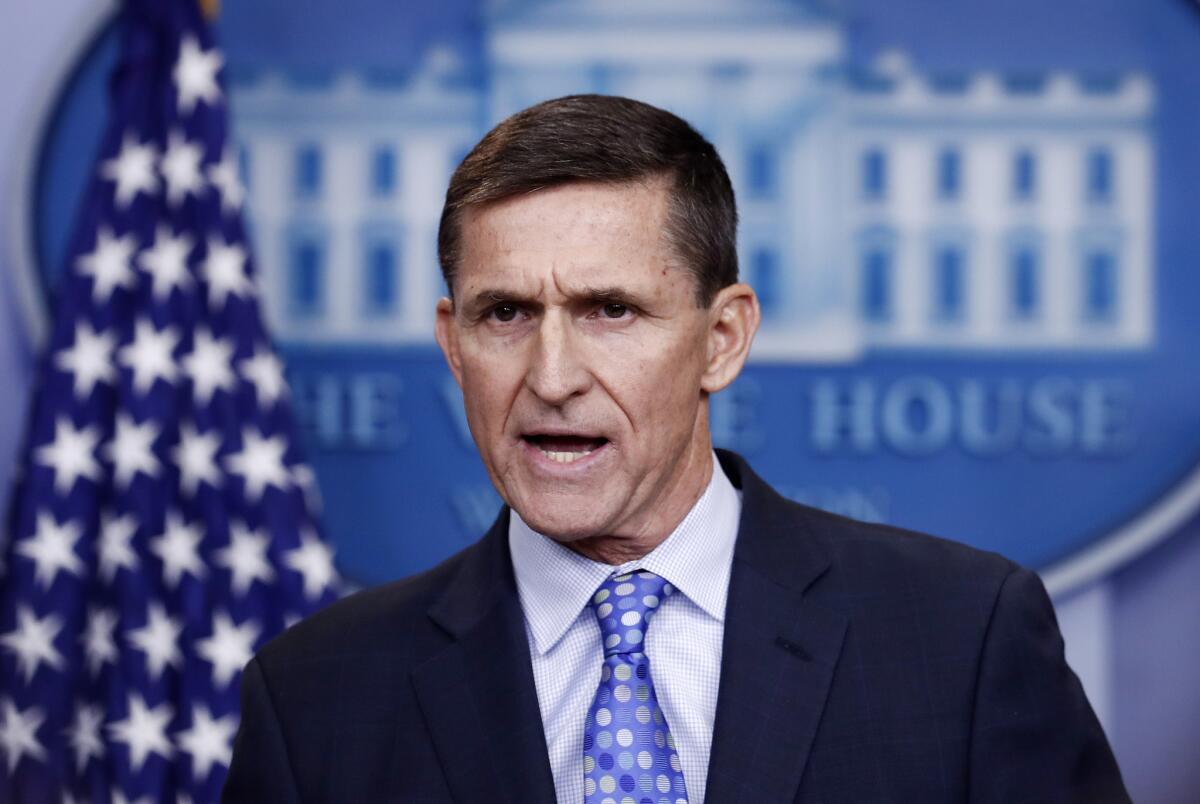
The senior members of the House Oversight Committee say classified military documents show that the Trump administration’s former national security advisor, Michael Flynn, did not ask permission or inform the U.S. government about payments he received for appearances before Russian organizations in 2015 and for lobbying that helped Turkey’s government.
Flynn’s failure to obtain permission from military authorities for the payments raises concern whether Flynn violated a constitutional ban on foreign payments to retired military officers. That’s according to Republican Rep. Jason Chaffetz and Democratic Rep. Elijah Cummings.
The two leaders of the oversight committee said there was no evidence Flynn complied with federal law. They said Flynn could be criminally prosecuted, and they said Flynn should surrender the money he was paid.
Trump wants a border wall, but few in Congress want to pay for it
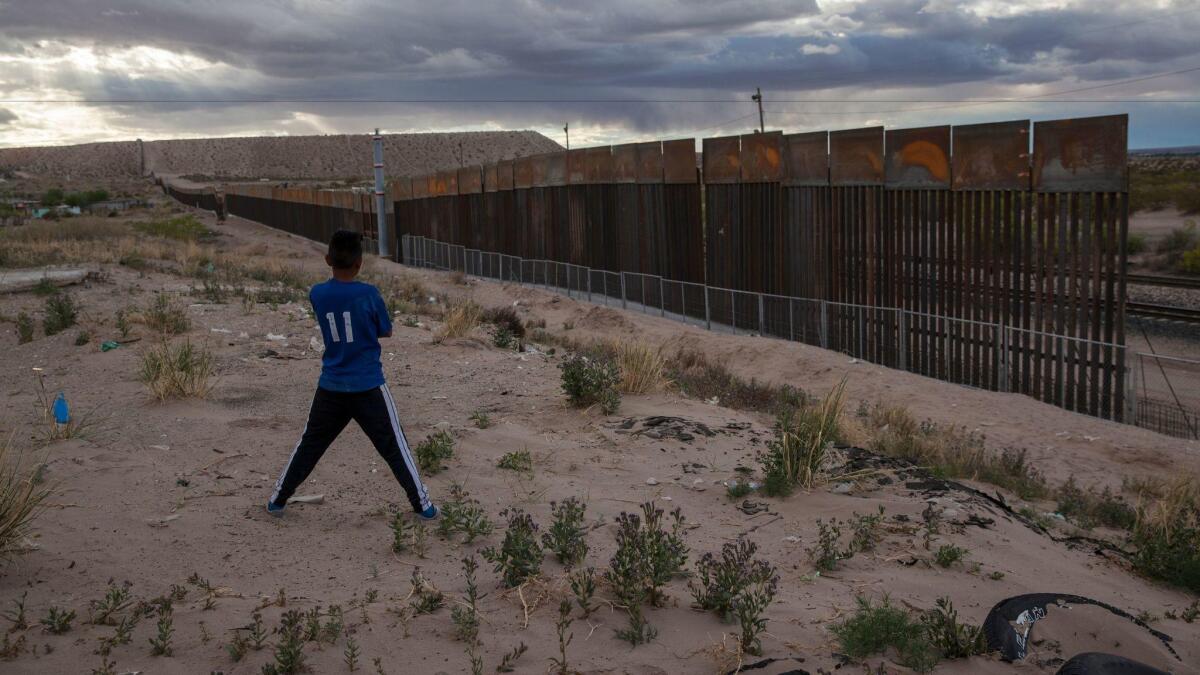
It’s an open secret on Capitol Hill: President Trump wants a “big, beautiful” border wall, but few in Congress are willing to pay for it.
The standoff, between the White House and lawmakers — Republicans and Democrats — has escalated tensions toward a possible government shutdown at midnight Friday as Congress races to meet a deadline to fund federal offices and operations.
Cooler heads will likely prevail. Talks are underway for a stopgap measure to keep the government running for another week or so while negotiations continue.
But the stalemate over Trump’s signature campaign promise — that he would build a wall along the border to deter illegal immigration and that Mexico would pay for it — remains a political divide.
It’s not that Trump’s Republican allies in Congress, who are the majority, don’t support the notions underpinning a border wall. Most of them do.
They just disagree with Trump’s approach for a physical barrier when other deterrents may prove more effective at stopping illegal crossings. And they don’t view the huge expenditure – as much as $70 billion by the latest estimate — a top priority right now.
100-day milestone becomes millstone for the White House
In the closing weeks of his campaign last year, President Trump laid out what he called a “100-day contract” with voters — an ambitious flurry of administrative and legislative steps that he vowed would start the process of “draining the swamp” and protecting American workers.
With many of those promises as yet unfulfilled or abandoned, Trump and his aides scrambled Monday to present a glowing picture of vast accomplishment even as they downplayed the significance of the 100-day deadline looming Saturday.
Trump isn’t the first president to try to balance high expectations against harsh reality in the first months of a new administration. But the traditional temporal benchmark has become a case study for what the news cycle has come to mean in the Trump era.
The media — and cable news, especially — love a good round-numbered milestone, and Trump is a voracious consumer of cable news. So Trump’s aides are contributing to a spectacle that they simultaneously dismiss as meaningless, knowing it is a priority for their boss as he juggles bold campaign pledges against the difficulty of heading the vast U.S. government.
Trump escalates trade dispute with a 20% tariff on Canadian softwood lumber

The Trump administration moved Monday to impose a 20% tariff on softwood lumber entering the United States from Canada, escalating an intensifying trade dispute between the two countries.
The president announced the decision during a gathering with conservative media outlets at the White House on Monday evening. Trump’s initial comments were relayed by four people who were in the room and confirmed by an administration official.
On Twitter, Breitbart News White House correspondent Charlie Spiering quoted Trump as saying, “We’re going to be putting a 20% tax on softwood lumber coming in — tariff on softwood coming into the United States from Canada.”
The Commerce Department later announced it had reached a preliminary determination and would impose countervailing duties ranging from 3%t to 24% on imported softwood lumber, with an average of about 20%.
One person in the room said Trump threatened that dairy could be next.
The U.S. and Canada typically enjoy a friendly trading relationship, but things have soured in recent months.
State Department deletes online blog post that promoted Trump’s Mar-a-Lago

President Trump’s oceanside Mar-a-Lago resort in Florida has gained considerable airtime and tweet time since Trump took office and dubbed it his winter White House.
It now has received official attention from the State Department.
The State Department’s “Share America” website, which shares “compelling stories and images that spark discussion and debate,” published a blog post about the compound ahead of Trump’s April 6 meeting there with Chinese President Xi Jinping. The post has since been deleted.
“We regret any misperception,” it reads.
The original post did not note the discussion and debate over whether the U.S. government should promote Trump’s privately owned club, which charges $200,000 to join.
The post described the history of the Palm Beach estate, which heiress Marjorie Merriweather Post donated to the U.S. government in her will in 1973 – 12 years before Trump purchased it.
At least one U.S. embassy, in London, shared the post online as well.
Washington Post reporter Abby Phillips noted the post Monday on Twitter, and Hillary Clinton’s former campaign spokesperson Josh Schwerin criticized it as inappropriate government promotion of Trump’s business interests.
Trump has visited Mar-a-Lago eight times since he took office in January. According to Politifact, each trip costs taxpayers millions of dollars.
Updated at 4:00 p.m. with information about deletion of post.
Are budget-slashing days numbered? Americans’ support for government spending on the rise, study says
For the first time in years, almost as many Americans want more government spending as those who prefer less, according to a new study released Monday.
The survey from Pew Research comes as Congress and President Trump face a possible government shutdown this week over government spending levels.
After years of Republican-led attempts to slash federal spending, the study shows an emerging shift in Americans’ attitudes in recent months.
Now, 48% of Americans prefer increased spending and 45% favor less, a narrowing not seen since then-President Obama was elected in 2008.
That’s a seven-point difference from September, when 50% wanted fewer government services and 41% wanted more.
Support for increased spending was found among 14 government programs surveyed but was particularly high for expenditures involving veterans, education, infrastructure and healthcare. Backing for programs for Americans in need shot up from 27% to 45%.
The findings, however, may do little to bridge the partisan divide in Congress.
Overwhelmingly, among Republicans, 75% supported smaller government. Among Democrats, 65% preferred more government programs.
The divide narrowed in only a few areas -- spending on veterans and infrastructure -- providing just a few opportunities for common ground.
Trump declines to use the word ‘genocide’ in describing Armenian deaths
President Trump prides himself on speaking bluntly on the international stage and, at times, breaking with diplomatic norms. But he continued a tradition on Monday that has infuriated many Armenian Americans -- refusing to use the word “genocide” in describing the killings of more than 1 million Armenians at the hands of Ottoman Turks.
Trump issued a statement on Monday, the 102nd anniversary of the massacre, commemorating “one of the worst mass atrocities of the 20th century.”
“Beginning in 1915, one and a half million Armenians were deported, massacred, or marched to their deaths in the final years of the Ottoman Empire,” he said. “I join the Armenian community in America and around the world in mourning the loss of innocent lives and the suffering endured by so many.”
The language was similar to that of President Obama and other Trump predecessors who were concerned with upsetting Turkey, which disputes that a genocide took place, and potentially impacting U.S. foreign policy priorities in the Middle East.
The Turkish government has spent millions lobbying Congress on the issue, succeeding in persuading Obama to reverse a campaign promise to label the killings a genocide. Trump has forged a close relationship with Turkish President Recep Tayyip Erdogan, becoming the first Western leader to congratulate him by telephone after a referendum last week granted him sweeping new powers. Trump drew heavy criticism from human rights and pro-democracy groups for the move.
Activists in the United States continued to voice frustration over the omission of the word “genocide” in marking the history. It is a particularly sensitive issue in California, which is home to the country’s largest population of people of Armenian descent, with more than 200,000 living in Los Angeles County.
Aram Hamparian, executive director of the Armenian National Committee of America, said in a statement that “President Trump is effectively outsourcing U.S. genocide-prevention policy to Recep Erdogan, an arrogant and authoritarian dictator who clearly enjoys the public spectacle of arm-twisting American presidents into silence on Turkey’s mass murder of millions of Armenians, Greeks, Assyrians, and other Christians.”
Trump’s spokesman, Sean Spicer, was asked twice about the omission during Monday’s briefing with reporters. “It is perfectly in keeping with the language that’s been used over and over again,” Spicer said.
Sessions: We’ll go after white-collar criminals too
In his first weeks as attorney general, Jeff Sessions has kept a relentless focus on his plans to crack down on illegal immigration and violent crime.
On Monday, he said that doesn’t mean corrupt businesses will get a pass.
“As we re-double our efforts to combat violent crime, we will still enforce the laws that protect American consumers and ensure that honest businesses aren’t placed at a disadvantage to dishonest businesses,” he said. “These kinds of frauds are always paid for by innocent people.”
Sessions was trying to counter concerns that under President Trump, who still owns vast worldwide business holdings, the Justice Department would ease back on pursuing white-collar fraud and corporate corruption.
“Focusing on these challenges does not mean we will reduce our efforts in other areas,” Sessions said.
An early draft of the speech cited the department’s recent case against Takata Corp., which pleaded guilty to a criminal charge and was fined $1 billion for providing false test data about its automotive air-bag inflators.
The assembled lawyers handle compliance work, making sure companies are on the right side of the law. Good compliance procedures will help companies get a break when prosecutors make charging decisions, Sessions said.
Sessions also pledged that Justice would aggressively enforce the Foreign Corrupt Practices Act, which makes it a crime for businesses to pay bribes to foreign officials to win deals.
“Companies should succeed because they provide superior products and services, not because they have paid off the right people,” Sessions said.
Trump has in the past been harshly critical of the anti-bribery statute, saying it was “a horrible law’ that placed American businesses at a “huge disadvantage” overseas.
Answering questions afterward, Sessions said the department will look toward charging individuals responsible for corporate misbehavior or mismanagement – and less about prosecuting the corporations, which could affect the stock price.
“I just have always felt that having stockholders paying the price for corporate mismanagement isn’t always the best solution,” he said.
“We do not need good companies, trying to run a good ship, be subject to criminal penalties,” Sessions added.
Sessions made headlines last week when he appeared to ridicule a federal judge in Hawaii who had ruled against the White House attempt to block people from mostly-Muslim countries from traveling to the United States.
“I really am amazed that a judge sitting on an island in the Pacific can issue an order that stops the President of the United States from what appears to be clearly his statutory and Constitutional power,” Sessions said Wednesday in a radio interview.
His comment quickly spurred a backlash, with critics accusing Sessions of speaking as if Hawaii wasn’t a state or was less important because of its location.
Sessions appeared to acknowledge the flap on Monday.
“Some of us and all of us get frustrated with judges’ rulings we’ve had at various times,” he said.
U.S. announces ‘sweeping’ sanctions on Syrian scientists for chemical attack
Following up on a limited U.S. military strike against Syria, the Trump administration on Monday announced new “sweeping” sanctions on the Syrian government agency it blames for producing chemicals used in a deadly attack on Syrian civilians earlier this month.
The announcement names 271 members of the Syrian Scientific Studies and Research Center in what the Treasury Department called one of its largest sanctions actions in history.
It said the Syrian agency was responsible for developing and producing “nonconventional weapons and the means to deliver them.”
“These sweeping sanctions target the scientific support center for Syrian dictator Bashar Assad’s horrific chemical weapons attack on innocent civilian men, women and children,” the department said in a statement.
Later, appearing at a White House press briefing, Treasury Secretary Steven Mnuchin amplified the U.S. will to punish users of chemical weapons.
“We intend to hold the Assad regime accountable,” he told reporters.
A senior administration official said the 271 people cited included chemists and other scientists or researchers who have worked for the agency since at least 2012.
The sanctions mean that those individuals named may not have business dealings with U.S. companies or persons, and any assets they might have in the United States would be frozen. The move also complicates travel for some.
Successive U.S. administrations have used economic sanctions for punishment in cases involving such wrongdoing as human rights abuse and drug trafficking, but the success of the measures is spotty. Countries such as North Korea often find ways to circumvent the prohibitions.
Monday’s action came in response to several chemical attacks blamed on Assad’s government, most notably the April 4 massacre of nearly 100 people, including children, in northern Syria. U.S. officials blamed the attack on Assad’s forces, backed by Russia, and said the banned nerve agent sarin was used.
In immediate response, the U.S. military blasted a Syrian military airfield with 59 Tomahawk missiles.
The sanctions send the message that “we will hold those responsible accountable,” the senior administration official said, “and will serve as a strong deterrent.”
Officials briefed reporters on the condition of anonymity.
The administration suspects Assad still has chemical weapons despite a 2015 agreement to get rid of them.
In January, the administration also imposed sanctions on 18 senior Syrian government officials and five branches of the Syrian military in response to Assad’s use of chlorine gas in three attacks in 2014 and 2015.
American detained by North Korea a ‘bargaining chip,’ Nikki Haley says
North Korea expects to use the American citizen it detained last week as a “bargaining chip” to force negotiations with Washington, U.S. Ambassador to the United Nations Nikki Haley asserted Monday.
She also warned Pyongyang: “It’s not gonna work.”
“What we’re dealing with is a leader who is flailing right now,” Haley said of North Korean leader Kim Jong Un. “And I think what he’s trying to do is show his citizens that he has muscle, whether it’s through his rhetoric, or whether it’s through his actions.”
Haley, speaking on the CBS “This Morning” television program, was commenting on the reported detention in North Korea of Tony Kim, a 58-year-old academic who also goes by his Korean name, Kim Sang-duk.
He was reported arrested at the Pyongyang international airport, where he was attempting to board a flight after a monthlong teaching stint at a university just outside the capital.
The arrest comes at a time of particularly high tensions, as Kim and the Trump administration have traded high-pitched insults over North Korea’s continued pursuit of nuclear power.
Previous detentions of American citizens by the hermetic nation have triggered visits by high-level envoys, including former U.S. presidents and ambassadors, to secure their release.
North Korea apparently sees these moves as a way to force engagements with the United States, though successive U.S. governments, including the Trump administration, have refused a dialog with the regime.
“I think it’s absolutely a bargaining chip; I think that’s what their intentions are,” Haley said.
But she remained adamant that the administration will not “appease” a “misbehaving” North Korea by opening formal talks.
Haley echoed President Trump in praising China for its support in trying to pressure North Korea, its ally.
Trump tells astronauts to get to Mars ‘at worst, during my second term’
“Station, this is your president, do you hear me?”
President Trump spoke live for about 20 minutes Monday morning with a pair of astronauts at the International Space Station, including commander Peggy Whitson, who set a new record for accumulated time in space at more than 534 days.
Trump -- asking questions from the Oval Office with his daughter Ivanka by his side, and with astronaut Kate Rubins and top advisers filling out the room -- clearly relished the drama of the unusual call. He mentioned several times that it was being streamed live in classrooms across the country, and asked the astronauts about their daily routine and how they successfully did their jobs.
“That’s what we like, great American equipment that works,” Trump responded when Whitson told the president that his voice was being heard at the space station.
Jack Fischer, the second astronaut speaking from the space station, seemed just as impressed with his trip, noting that he had been drinking a “floaty ball-form coffee” the morning before.
“Now, I’m talking to the president of the United States while hanging from a wall,” Fischer said. “It’s amazing.”
He added that even drinking recycled urine to save precious water in space was “really not as bad as it sounds.”
Trump, an avowed germaphobe, deadpanned: “That’s good. I’m glad to hear that.”
Trump was eager to talk about the potential for further space travel, including a greater role for entrepreneurs and a human trip to Mars. When Whitson said a Mars trip would likely happen in the 2030s, Trump joked that NASA would have to speed up its timeline to complete the mission, “at worst, during my second term.”
Trump congratulated Whitson and repeatedly praised her work. He said he would never travel 17,000 mph “but that’s what you do.”
Whitson said she was proud of the honor but credited the vast crew on Earth for making it possible.
“I’ve been dealing with politicians so much,” Trump said. “I’m so much more impressed with these people.”
Watch live: President Trump congratulates astronaut Peggy Whitson on U.S. record for time in space
Astronaut Peggy Whitson has another record under her space belt.
Early Monday, the International Space Station commander surpassed the record of 534 days, two hours and 48 minutes for most accumulated time in orbit by an American. That record was set last year by Jeffrey Williams.
Whitson already was the world’s most experienced spacewoman and female spacewalker and, at 57, the oldest woman in space. By the time she returns to Earth in September, she’ll have logged 666 days in orbit over three flights.
As part of the celebration, Whitson is getting a special phone call. President Trump will speak to Whitson from the Oval Office, along with his daughter Ivanka and NASA astronaut Kate Rubins.
The world record — 879 days — is held by Russian Gennady Padalka.
Trump’s ‘big announcement’ on tax reform this week won’t be that big
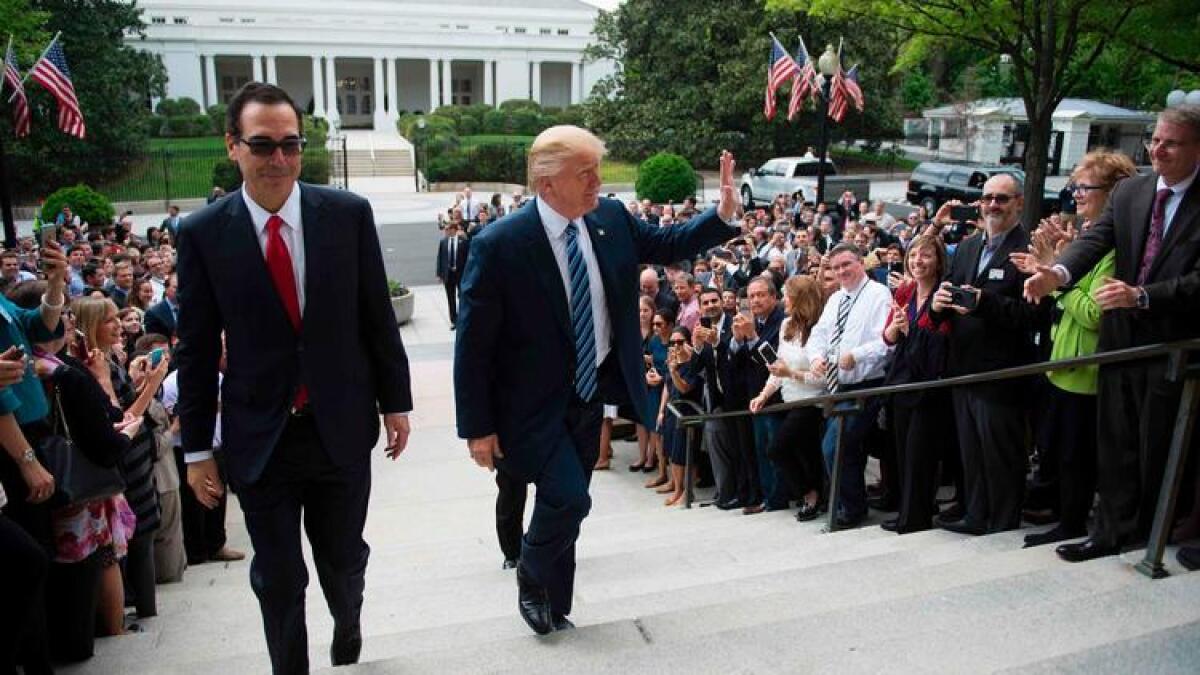
President Trump promised a “big announcement” this week on one of his signature issues -- tax reform.
But if you’re looking for all the long-awaited details of his promised “massive tax cut” for businesses and individuals, you’ll have to wait a while longer.
The White House now says that Trump simply “will be outlining principles for tax reform” during his much-ballyhooed Wednesday event.
That’s a far cry from what Trump promised last week.
“We’ll be having a big announcement on Wednesday having to do with tax reform,” Trump said during a speech at the Treasury Department on Friday.
“The process has begun long ago, but it will formally begin on Wednesday,” he said.
Earlier on Friday, the told the Associated Press in an interview that,”I shouldn’t tell you this, but we’re going to be announcing, probably on Wednesday, tax reform.”
He provided no new details then, but said, “It will be bigger, I believe, than any tax cut ever. Maybe the biggest tax cut we’ve ever had.”
Trump took to Twitter on Saturday to again tout his “big tax reform” announcement this week.
But on Sunday, Mick Mulvaney, director of the White House Office of Management and Budget, downplayed what was coming.
“I think what you’re going to see on Wednesday is some specific governing principles, some guidance,” he said on “Fox News Sunday.”
“Also some indication of what the rates are going to be,” Mulvaney said. “I don’t think you’re going to see something and I don’t think anybody expects us to rollout bill language on Wednesday. In fact, we don’t want to do that.”
Details will be limited to “here are some of the ideas that we like, some of the ideas we don’t like...here are some of the rates we’re talking about,” Mulvaney said.
A White House spokeswoman on Monday said there would be “no further comment beyond what the president has said on this.”
Trump outlined his principles and proposed rates during the campaign, He said he wanted to lower the corporate tax rate to 15% from 35%. And Trump said he wanted to reduce the seven individual tax brackets to four, with the highest rate dropping to 25% from 39.6%.
But House Republicans are working on their own plan that has smaller tax cuts. And it includes a controversial border adjustment tax.
Trump also promised his tax overhaul would be “revenue-neutral,” meaning the cuts would be offset by the elimination of other tax breaks to keep from increasing the budget deficit.
Treasury Secretary Steven T. Mnuchin said Saturday that would be accomplished through the use of controversial “dynamic scoring,” which assumes those cuts would fuel faster economic growth.
“There’s no question we’re looking at reforms that will pay for themselves with growth,” he said during a public question-and-answer session with Christine Lagarde, managing director of the International Monetary Fund.
“Under dynamic scoring this will pay for itself,” he said. Under conventional “static scoring,” which doesn’t incorporate growth estimates, “there will be short-term issues,” he said.
Trump’s budget director suggests wall fight won’t trigger shutdown
The White House budget director, Mick Mulvaney, says he thinks a government shutdown can be averted before the Friday deadline.
Congressional Republicans and Democrats are negotiating a temporary funding measure to keep the federal government from running out of money on Friday. Mulvaney said in an TV interview aired Sunday that there could be an accord in place soon to ensure a shutdown won’t occur.
“The negotiations are ongoing, and there’s no reason we can’t have an agreement there as early as today,” Mulvaney said on “Fox News Sunday.”
“I don’t think anybody foresees or expects or wants a shutdown,” he added.
President Trump is demanding that the spending measure include $5 billion to begin building a massive wall along the border with Mexico and to enhance enforcement of immigration laws -- one of Trump’s most ardent campaign pledges.
Democrats have balked at adding that money to the measure that must be enacted to temporarily fund the government until Sept. 30, the end of the fiscal year.
John Kelly, secretary of Homeland Security, interviewed on CNN’s “State of the Union,” suggested Trump would fight to add money for the wall in the stopgap funding measure.
“I would suspect he will be insistent on the funding,” Kelly said.
Democrats have denounced linkage of the wall funding and money to keep the government afloat.
“I hope the president will back off,” said Sen. Dick Durbin (D-Ill.), also interviewed on CNN. “To think that he would consider shutting down the government of the United States of America over this outlandish proposal of a border wall.... That would be the height of irresponsibility.”
Some Republicans, too, say the stakes are too high to allow a shutdown.
Sen. Mario Rubio (R-Fla.) said the message sent by disarray in Washington would be dangerous at a time of high tensions over North Korea and other international hot spots.
“We just cannot shut down the government right now,” Rubio said on CBS’ “Face the Nation.” He said allowing that to occur would have a “very destabilizing” impact on global affairs.
Thousands turn out for science march in nation’s capital
Scientists and their supporters took to the streets of Washington and other cities around the world Saturday, with many expressing worries about a diminishing role for fact-based research under the Trump administration.
Waving signs with slogans like “Science is Real” and “Ask for Evidence!” the marchers in the nation’s capital gathered under drizzly skies at the base of the Washington Monument, a short distance from the White House. The crowd swelled by the thousands even as the light rain turned to a downpour.
The event, timed to coincide with Earth Day, was billed as nonpartisan, with scientists, students, researchers and advocates worldwide seeking to promote the role of science in policymaking and public life.
Organizers encouraged participants to wear work gear such as their lab coats, or to dress as a science hero. Nancy Davis of Baltimore came to the Washington march decked out in full Revolutionary War-era regalia as Benjamin Franklin; she said her chemist sister approved of the tribute to the Founding Father and part-time electricity experimenter.
Marcher Jeanne Walton, 51, an eighth-grade science teacher at Central York Middle School in York, Pa., said she worried about the effect of some current political rhetoric on her young students.
“I’m watching science being denied and undermined,” said Walton, who was marching with her 18-year-old son, Trey, a mechanical engineering major at Temple University in Philadelphia. “We’re replacing facts with propaganda.”
Hours before the Washington march, parallel events took place in later time zones. Among the larger events were marches in Berlin, London and Geneva.
More marches were taking place in other U.S. cities, including Boston and Los Angeles. Arctic scientists tweeted their support from the North Pole.
New York soft on crime? “Outrageous,” says the mayor
The New York City mayor and police commissioner held an emergency press conference and fired off tweets to contest a letter sent Friday by the U.S. Justice Department saying that the city is soft on crime.
“It’s unacceptable,’’ said Mayor Bill De Blasio. “It’s outrageous and it’s absurd.”
New York City’s past three months were among the safest on record, city officials said.
Police Commissioner James P. O’Neill reeled off statistics showing a dramatic drop in crime since 1993: murders down 82%; shooting down 81%; and overall crime down 76%.
So far in 2017, crime is down 5.4% from last year. There have been eleven murders in the city of 8.4 million.
“I like to think of myself as a pretty calm and measured person, and I think most of the time I present myself that way, but when I read that statement by [the Justice Department] this afternoon, my blood began to boil,’’ O’Neill said.
The clash is the latest round in an escalating dispute between New York City and the presidential administration of its native son, Donald Trump. The Justice Department is cracking down on so-called “sanctuary cities,’’ threatening them with loss of funding if they do not cooperate with immigration authorities.
Letters went out to nine jurisdictions on Friday. Besides New York, those targeted were the California Department of Corrections and Rehabilitation, Chicago, New Orleans, Philadelphia, Las Vegas, Miami, Milwaukee, and Cook County, Ill.
The letter to New York said “New York City continues to see gang murder after gang murder, the predictable consequence of the city’s ‘soft on crime’ stance.”
Last week, four young men were found brutally murdered in Islip, New York, in a crime that authorities have linked to the MS-13 gang. Islip is located on Long Island and is not part of New York City.
9th Circuit appeals court declines wider review of Trump’s travel ban

A San Francisco-based federal appeals court declined Friday to convene an 11-judge panel to consider President Trump’s moratorium on admitting refugees and travelers from six predominantly Muslim countries.
In a brief order, the U.S. 9th Circuit Court of Appeals said the judges voted to reject a request by Hawaii to skip the standard first step of review by a three-judge panel and move directly to an “en banc” panel.
The order did not provide any details about the judges’ vote or reasoning.
Normally an appeal is first heard by a three-judge panel. That panel’s decision can then be appealed to an 11-judge en banc panel or to the U.S. Supreme Court.
The 9th Circuit will hear the Trump administration’s appeal of a Hawaii judge’s national injunction against the travel ban during a May 15 hearing in Seattle.
The U.S. 4th Circuit Court of Appeals, which is reviewing a more limited injunction against Trump’s executive order, decided without being asked to go directly to en banc review. The Virginia-based court has scheduled a hearing for May 8.
Israeli American teen suspected of Jewish center bomb threats faces federal charges

Federal officials on Friday filed charges against an 18-year-old Israeli American in connection with hundreds of hoax bomb threats this year that had put U.S. Jewish institutions on edge.
A criminal complaint filed in federal court in Orlando, Fla., said Michael Ron David Kadar was behind at least 245 “threatening telephone calls involving bomb threats and active shooter threats” from Jan. 4 to March 7.
In another complaint filed in federal court in Macon, Ga., Kadar was also charged with a series of calls to public schools and residences that either threatened attacks or made false reports about attacks to trick police into showing up, an illegal prank known as “swatting.” The calls began in 2015 and continued through this year.
He used Google Voice and other digital phone services as well as computerized voice manipulation to disguise his identity, according to the complaints.
The arrest was part of a joint operation between the FBI, Israel law enforcement, and police from Australia, New Zealand and Europe. Kadar, who is a dual citizen, was arrested March 23 in Israel, where he lived in the southern city of Ashkelon.
“Today’s charges into these violent threats to Jewish Community Centers and others represent this Department’s commitment to fighting all forms of violent crime,” Atty. Gen Jeff Sessions said in a statement. “These threats of violence instilled terror in Jewish and other communities across this country and our investigation into these acts as possible hate crimes continues.”
Kadar isn’t the first person charged with making bomb threats against Jewish centers.
On March 3, Juan Thompson was arrested in St. Louis on suspicion of making threats to seven Jewish community centers and the Anti-Defamation League’s New York headquarters. Police said Thompson, a former journalist with the Intercept, was a copycat who made the threats in an attempt to frame an ex-girlfriend.
House panel’s Russia hearing with Obama officials is back on
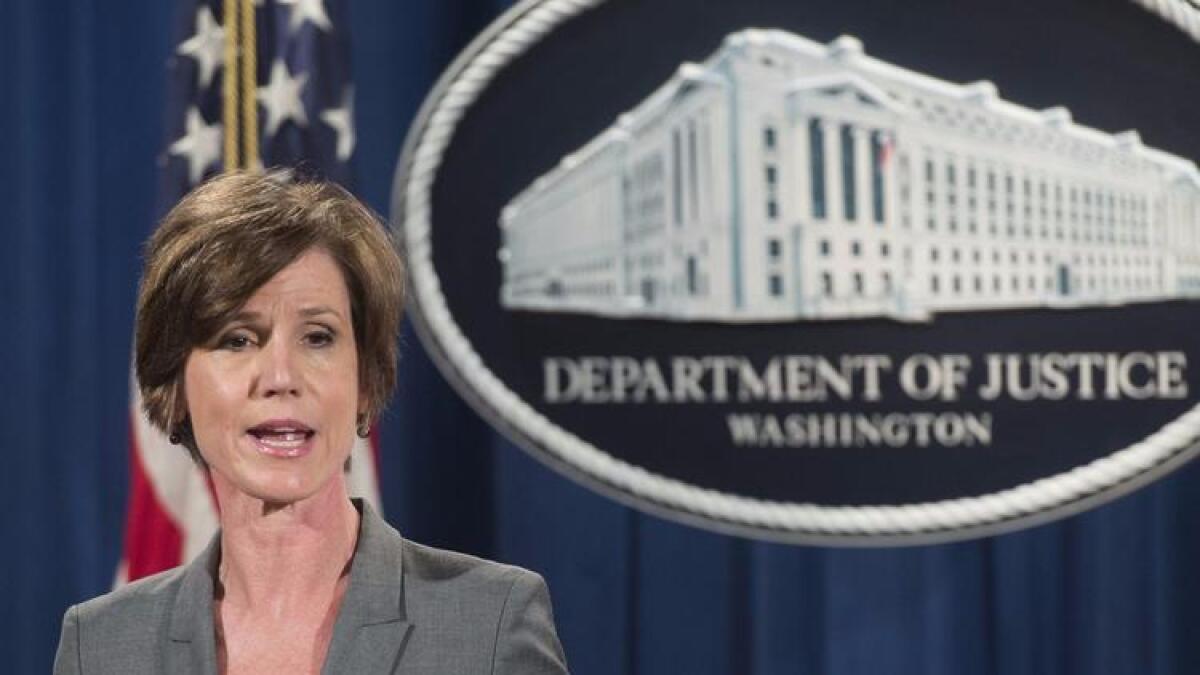
A previously canceled House Intelligence Committee hearing to receive testimony from three former top Obama administration officials about Russia’s attempts to influence the 2016 election is back on for next month.
The panel said Friday it had invited Sally Yates, the former acting attorney general fired by President Trump, former Director of National Intelligence James R. Clapper and former CIA Director John Brennan, to testify sometime after May 2 in an open hearing after their original testimony was abruptly canceled in March by Chairman Devin Nunes (R-Tulare).
The announcement indicates that the panel’s Russia investigation, which was thrown into turmoil last month after Nunes stepped aside as head of the probe following allegations he may have improperly disclosed classified information, is getting back on track.
Rep. K. Michael Conaway, (R-Texas) took over as head of the investigation after Nunes’ decision.
A committee news release on Thursday also said that FBI Director James B. Comey and Adm. Mike Rogers, the head of the National Security Agency, would testify in a closed session on May 2.
Nunes’ decision to call off the original hearing with Yates, Brennan and Clapper came only days after the committee’s first public hearing in which Comey confirmed that the bureau was investigating Russia’s ties to President Trump’s associates.
Rep. Adam Schiff (D-Burbank) called the cancellation of the hearing a “dodge” by Nunes to aid the White House. Schiff said Nunes’ connections to the White House raised insurmountable public doubts about whether the committee could credibly investigate the president’s campaign associates.
Yates, who was fired in January after she refused to defend the Trump administration’s proposed travel ban, was expected to be questioned about her role in the firing of Trump’s first national security advisor, Michael Flynn.
Yates alerted the White House in January that Flynn had misled the White House about whether he had discussed sanctions in a December phone call with the Russian ambassador to the United States. Flynn was not ousted from the White House until the discrepancies were made public.
Nunes came under fierce criticism from Democrats for making public information provided him to him last month by White House aides concerning classified intelligence reports that apparently referred to Trump associates -- information that Nunes did not provide to members of his committee.
He stepped aside as head of the Russia investigation after the leaders of the House Ethics Committee said it is investigating whether Nunes improperly disclosed classified information, apparently when he held a news conference last month to claim that Trump associates’ names had been revealed in intelligence reports.
Nunes has denied wrongdoing.
‘Dreamers’ should ‘rest easy,’ Trump says
President Trump says young immigrants shielded from deportation — often referred to as “dreamers” — should “rest easy” about his immigration policies.
Trump told the Associated Press he is “not after the dreamers, we are after the criminals. That is our policy.”
President Obama changed enforcement priorities to protect from deportation many young people brought to the country illegally as children.
Attorneys say 23-year-old Juan Manuel Montes was recently deported to Mexico despite having qualified for deferred deportation. Montes sued Tuesday for access to records on his deportation.
Trump says Montes’ case is “a little different than the Dreamer case,” though he did not specify why.
Trump welcomes aid worker freed after years in Egyptian jail
Free after having been detained in an Egyptian jail for nearly three years, Aya Hijazi was welcomed to the Oval Office on Friday in what the Trump administration cast as a diplomatic triumph.
“We are very happy to have Aya back home and it’s a great honor to have her in the Oval Office,” President Trump told reporters.
Hijazi, a dual American Egyptian citizen who founded a non-governmental organization to help Egyptian street children, was imprisoned in 2014 on what U.S. officials and human rights advocates said were unsubstantiated charges of human trafficking.
After multiple delays, Hijazi’s case finally was heard in an Egyptian court Sunday and she and her co-defendants were acquitted. She returned to the United States on Thursday on a U.S. government plane, accompanied by deputy national security advisor Dina Powell.
White House Press Secretary Sean Spicer on Friday said Trump and his team had “worked behind the scenes” to bring her home.
Trump’s recent welcome of Egyptian President Abdel Fattah Sisi, who has been widely criticized for cracking down on dissent and freedom of expression in his country, marked a significant thaw in relations between the U.S. and Egypt.
The Obama administration temporarily suspended a $1.3-billion aid package to the country after Sisi and the military seized power from the elected government led by the Muslim Brotherhood, which took office after the ouster of longtime Egyptian strongman Hosni Mubarak.
The Trump White House made it clear that it was willing to at least publicly downplay human rights concerns while instead prioritizing Egypt’s ability to help combat terrorism within its borders and in the broader region.
“We understand the concern, and I think those are the kind of things that I believe progress is made privately,” Spicer had told reporters as Sisi was visiting with Trump.
On Friday, Spicer said Trump had engaged directly on Hijazi’s behalf “and made it clear to the Egyptian government how important it was to him that this American be released and returned.” But he would not say if Trump had raised the issue to Sisi in their private meetings.
In an interview with Fox News during his visit to Washington, Sisi indicated that Hijazi’s case would be resolved in short order.
“Whenever there is a case within the authority for the president and according to the law and the constitution, we take action in it,” he said.
Obama to hold first public event since leaving office
Former President Obama is set to return to Chicago on Monday for what will be his first public event since leaving the White House.
Obama is to discuss civic engagement and community organizing at the University of Chicago’s Logan Center for the Arts, his office announced Friday.
Hundreds of people are expected to attend, chosen from area universities that were given tickets for distribution, said Kevin Lewis, a spokesman for the former president. About six young people will appear on stage with him for the discussion, Lewis said.
The event will be a homecoming for Obama on multiple levels. He formerly taught constitutional law at the university, and his family has a home nearby.
It also lets the former president, who came to Chicago to work as a young community organizer, fulfill one of the commitments he set out for his post-presidential years: to engage and work with the country’s next generation of leaders, Lewis said.
Former First Lady Michelle Obama is not expected to accompany her husband on the trip, Lewis said.
Justice Department warns sanctuary cities in California, 8 other jurisdictions to cooperate with immigration enforcement

California leaders say they will continue to protect people in the country illegally despite an announcement by U.S. Atty. Gen. Jeff Sessions that the U.S. Department of Justice would soon cut federal grants from so-called sanctuary cities.
The Justice Department on Friday fired an opening shot in the Trump administration’s crackdown on so-called sanctuary cities, sending letters to nine jurisdictions asking for proof that they are cooperating with immigration enforcement, and indicating they are at risk of losing federal grants.
The letters went to the California Board of State and Community Corrections, as well as officials in Chicago, New Orleans, Philadelphia, Las Vegas, Miami, Milwaukee, New York and Cook County, Ill.
All have laws or policies that restrict the ability of police and jails to hand over people who are in the country illegally to federal immigration officers.
The sanctuary cities were a reaction to Obama-era policies that enlisted local police in immigration enforcement. They have come under heavy attack from President Trump and Atty. Gen. Jeff Sessions.
In a statement, the Justice Department said the cities are “crumbling under the weight of illegal immigration and violent crime,” mentioning an increase in Chicago murders and gang violence in New York City.
“And just several weeks ago in California’s Bay Area, after a raid captured 11 MS-13 members on charges including murder, extortion and drug trafficking, city officials seemed more concerned with reassuring illegal immigrants that the raid was unrelated to immigration than with warning other MS-13 members that they were next,” the release said
The letters say a lack of cooperation might mean the jurisdictions are in violation of their agreements concerning Justice Department grants.
The department hands out $2.2 billion each year to localities to support anti-crime efforts.
Some cities already have begun an effort to resist the pressure from the Trump administration. Seattle has already filed a federal lawsuit asking a court to declare that it can refuse to help the new immigration crackdown.
------------
FOR THE RECORD
April 24, 11:30 a.m.: An earlier verison of this post said a Justice Department letter had been sent to the California Department of Corrections and Rehabilitation. It was sent to the California Board of State and Community Corrections.
Trump: Latest Paris shooting will have ‘big impact’ on French presidential race

Commenting again on a Paris shooting that he had been quick to label a terrorist attack, President Trump said Friday that the latest scare in the French capital would “have a big effect” on presidential elections set for this weekend.
“The people of France will not take much more of this,” the president tweeted.
The statement, like many of the president’s social media postings, is open to interpretation: Was it just conjecture, political punditry or an implicit endorsement of far-right candidate Marine Le Pen, who has called for a crackdown at France’s borders as part of an anti-terror policy?
Trump has not endorsed a candidate in the race -- presidents seldom do that in foreign elections -- and White House officials have been reluctant to weigh in on the race, even as Le Pen and Trump have often been compared to one another.
Whether Trump’s backing would help Le Pen is also unclear.
The comment comes one day after former President Obama placed a call to the leading centrist candidate, Emmanuel Macron. A spokesman for Obama said the call was not an endorsement, but simply an opportunity to discuss the campaign.
Macron’s campaign posted an edited video of the call on Twitter.
Trump targets Dodd-Frank rules designed to wall off risky banks

President Trump, who has vowed to dismantle the landmark Dodd-Frank financial reform law, took aim at two of its pillars Friday.
During an appearance at the Treasury Department, Trump signed two presidential memos ordering six-month reviews of the 2010 law’s authority for regulators to designate large firms as a risk to the financial system and to try to shut them down with minimal collateral damage if they’re on the verge of failing, the White House said.
Although the regulations were designed to end the problem of too-big-to-fail banks, Republicans have complained they do the opposite because the government would still step in instead of letting a firm fall into bankruptcy.
“These regulations enshrine too-big-to-fail and encourage risky behavior,” Trump said.
Trump also signed an executive order directing Treasury Secretary Steven T. Mnuchin to review significant changes to the tax code since the start of 2016 to determine whether they “impose an undue financial burden on American taxpayers,” “add undue complexity” or “exceed statutory authority,” the White House said.
Trump sees cooperation from China in dealing with North Korean ‘menace’
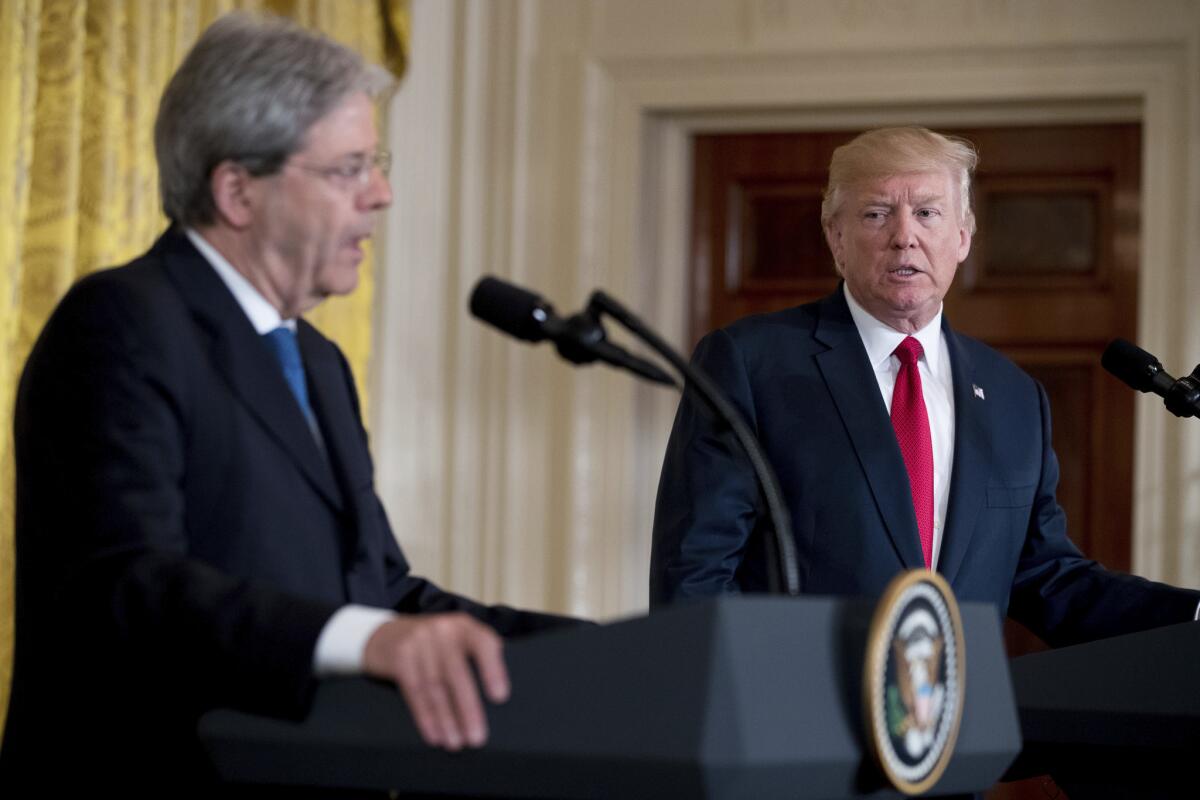
President Trump declined to speculate about the mental health of North Korean leader Kim Jong Un amid escalating tensions in the region, but expressed hope the issue will be “taken care of” with the assistance of China.
Speaking at a news conference Thursday, Trump cryptically referred to “some very unusual moves” made by the Chinese that he indicated were intended to pressure North Korea to back away from missile tests and its nuclear program.
Weeks after he and Chinese President Xi Jinping met at his Mar-a-Lago estate in Florida, Trump repeated that he had told Xi that China could secure more favorable economic deals with the U.S. if it would “get rid of this menace” on its doorstep.
Trump addressed the array of foreign policy challenges his administration is facing during the question-and-answer session with reporters in the East Room alongside visiting Italian Prime Minister Paolo Gentiloni.
Trump praised Italy as a committed partner in the fight against terrorism, including its commitment of troops in Iraq and Afghanistan and its efforts seeking political stability in Libya.
But there was daylight between the two leaders on at least one issue. In a jarring exchange, Gentiloni spoke of what he called the “critical” role the U.S. could play in helping to support Italy’s efforts in Libya to bring about a stable government.
Trump immediately followed by saying: “I do not see a role in Libya.”
“I think the United States has right now enough roles. We’re in a role everywhere,” he said.
At the same time, Trump pressed Gentiloni -- as he has other allies -- to live up to commitments of NATO members to spend at least 2% of their nation’s gross domestic product on defense.
Gentiloni, Italy’s former foreign minister who took office late last year after the resignation of Prime Minister Matteo Renzi, said there were “limitations” with the nation’s budget that would prevent it from meeting that goal, but he said Italy was also “proud of the contribution that we give to the security of the alliance in so many areas of the world.”
Trump also told reporters his administration was analyzing the Iran nuclear deal “very carefully,” and would have more to say about its fate in the “not-too-distant future.”
“They are not living up to the spirit of the agreement, I can tell you that,” Trump said.
Italy will host the G-7 Summit next month, part of what will be Trump’s first foreign trip as president. He will also attend a NATO leaders meeting in Brussels at a critical time for Europe, with elections scheduled France, Germany and now the United Kingdom in coming months.
Trump, in a departure from some rhetoric of his campaign, said it was very important to him to have a “strong Europe.”
“We will help it be strong, and it’s very much to everybody’s advantage,” he said.
Trump sees chance for success of ‘evolving’ GOP healthcare bill
President Trump offered an optimistic assessment of his stalled legislative agenda Thursday, touting a revived healthcare bill that he said could pass as soon as next week.
At an East Room news conference, Trump said he had never given up on his effort to repeal and replace the Affordable Care Act, known as Obamacare. His tone had been far more circumspect a month earlier, after House Republican leaders shelved their initial bill amid faltering support from both conservative and centrist Republicans.
At that time, Trump signaled his intent to move on to tax reform even as he held out some possibility of making tweaks to the existing healthcare law if Democrats came on board.
On Thursday, Trump said the Republican bid to repeal President Obama’s signature health law was “evolving.”
“Remember, it took Obamacare 17 months. I’ve really been negotiating this for two months — maybe even less than that,” he said.
Negotiations among Republicans have produced a bill that “gets better and better and better,” Trump said.
“We have a good chance of getting it soon,” the president said. “I believe we will get it, whether it’s next week or shortly thereafter.”
Despite some reports that White House officials expected a vote as soon as next week when lawmakers return from a two-week Easter recess, a House leadership aide said it was unlikely that legislative language would be ready to share among Republicans by week’s end.
The more urgent priority for Congress is passing a temporary funding measure before the current one expires on April 29. Failure to do so would prompt a government shutdown just as Trump marks the milestone 100th day in office, and would represent a major setback for him and his party at a time when it has total control of Washington.
For Trump, agreeing to a temporary funding measure that largely extends current spending levels would deprive him of an opportunity to begin acting on high-profile promises like a border wall and ramped-up defense spending.
“We want to keep the government open,” Trump said.
Jeff Sessions refers to Hawaii as an ‘island in the Pacific’ while questioning judge’s decision to block travel ban
Hawaii became the 50th U.S. state in 1959, but Atty. Gen. Jeff Sessions seemed to overlook that fact in a recent interview on “The Mark Levin Show.”
During the Tuesday evening discussion, which was posted online Wednesday, Sessions questioned a Hawaii judge’s decision to block the Trump administration’s travel ban. Rather than referring to the state by name, Sessions called it “an island in the Pacific.”
“We are confident that the president will prevail on appeal and particularly in the Supreme Court, if not the 9th Circuit. So this is a huge matter. I really am amazed that a judge sitting on an island in the Pacific can issue an order that stops the president of the United States from what appears to be clearly his statutory and constitutional power,” Sessions said.
Hawaii Sens. Mazie Hirono and Brian Schatz, and much of the Internet, were not pleased with the description, and quickly reminded Sessions’ of Hawaii’s status.
Last month, Judge Derrick Watson blocked the Trump administration’s 90-day ban that would have prevented travel to the U.S. from citizens of six Muslim-majority countries. The Justice Department is appealing that decision.
The Iran nuclear deal that Trump once vowed to tear apart is holding — at least for now
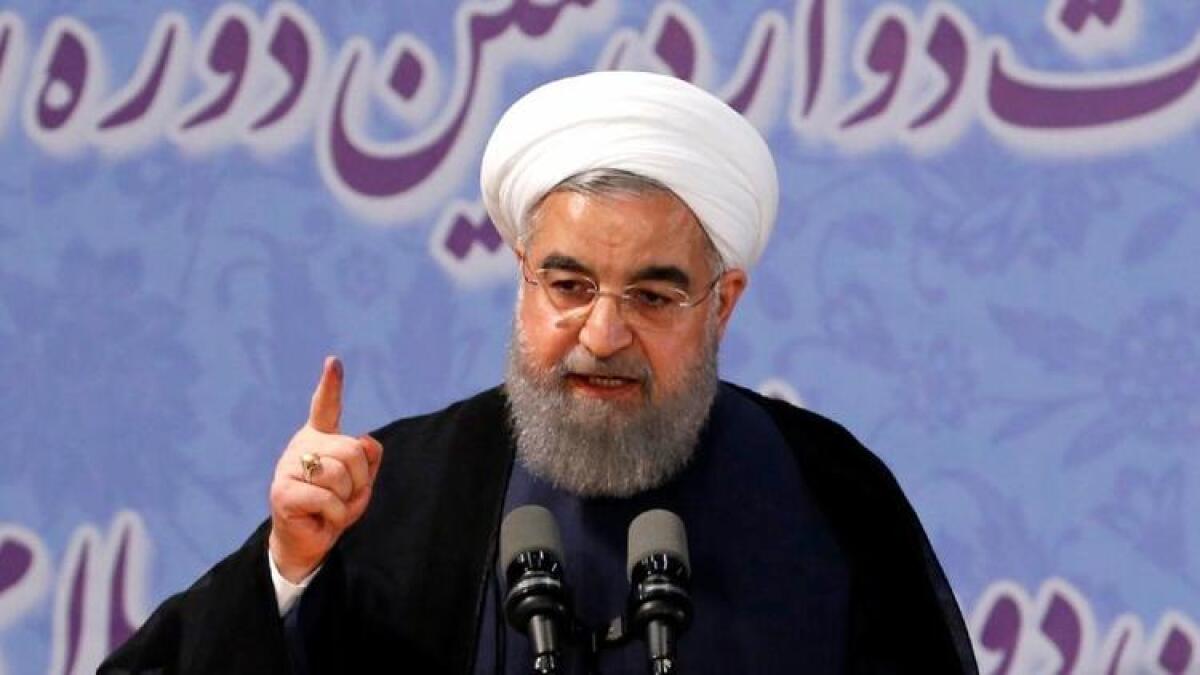
A skeptical Trump administration has confirmed that Iran continues to comply with the 2015 nuclear disarmament deal but says the White House is conducting an internal review of the landmark arms control accord that President Trump once called “the worst deal ever.”
Secretary of State Rex Tillerson said in a letter to Congress that the National Security Council will lead an interagency review of whether easing economic sanctions against Iran as part of the accord “is vital to the national security interests of the United States.”
“Iran remains a leading state sponsor of terror through many platforms and methods,” Tillerson wrote.
The Treasury Department still maintains Obama-era sanctions aimed at Tehran’s support for terrorist groups and its ballistic missile program, and those conceivably could be tweaked. But any moves to impose a major new regime of penalties could undermine the accord and spur a new nuclear crisis in the Middle East.
Is Trump’s secret meeting with Colombian ex-presidents meant to undercut peace deal?
President Trump has met secretly with two former Colombian presidents before holding any face-to-face talks with one of their political enemies: the sitting president, Juan Manuel Santos.
The unusual meeting with former presidents Alvaro Uribe and Andres Pastrana has led to speculation in Colombia that the pair was enlisting Trump’s support against a historic peace accord brokered by Santos with left-wing guerrillas.
Trump received Uribe and Pastrana on Good Friday at his Florida resort, Mar-a-Lago. The meeting was widely reported in the Colombian news media but never announced by the White House.
When White House Press Secretary Sean Spicer was asked about it at a briefing this week, he responded that he was unfamiliar with the event.
Trump has spoken to Santos twice on the telephone, but they have not met in person. Negotiations were under way for a possible White House encounter next month, Colombian officials said.
In Bogota, the Colombian capital, the Santos government was said to be livid at news of the Mar-a-Lago session. Uribe and Pastrana are vehemently opposed to the hard-fought peace accord that ended more than half a century of civil war.
Santos’ stewardship of the accord, signed with Marxist guerrillas who long battled successive Colombian governments, was enthusiastically championed by the Obama administration.
And it earned Santos last year’s Nobel Peace Prize.
But critics like the right-wing Uribe and Pastrana oppose the deal because they say it grants too many concessions to the guerrillas, and they have courted support in some U.S. conservative circles.
The pair apparently hoped to bring the deal to Trump’s attention and enlist his backing against it. Reports in Colombia said the meeting was brokered by Sen. Marco Rubio (R-Fla.); Rubio’s office would neither confirm nor deny that.
Uribe followed up with a letter to members of the U.S. Congress, claiming the peace agreement would lead to an increase in cocaine production.
In response, a group of 40 Colombian lawmakers wrote to Congress in a bid to counter Uribe’s claims, accusing him and Pastrana of waging an overt campaign against the peace accord for domestic political reasons. Colombia holds presidential and parliamentarian elections next year, and Uribe is hoping his political party can make a comeback.
“It is not standard diplomatic practice for a president to receive opposition politicians before meeting with a legitimately elected head of state,” Virginia Bouvier, senior advisor for peace processes at the Washington-based U.S. Institute of Peace, told The Times via email.
“The Trump administration would be wise to steer clear of internal divides within a polarized Colombia and keep its eye on the prize — the opportunity for peace after half a century of war,” she wrote.
She said it was not clear the episode would have an impact on U.S. relations with Colombia, but that it was likely to deepen the political divide within Colombia as the nation attempts to recover from a conflict that cost more than a quarter of a million lives and brought the nation to the brink of collapse.
Watchdog group that includes former Obama staffers sues FBI and DOJ over Trump wiretap claims, Russia investigation
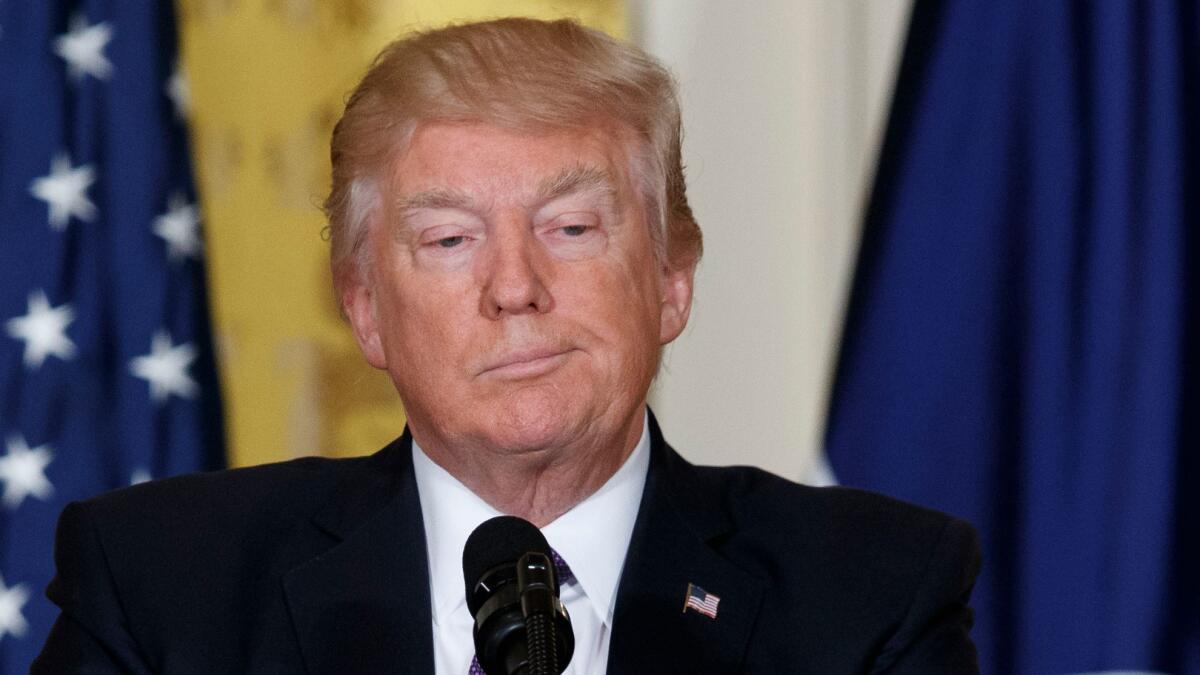
American Oversight, a newly formed ethics watchdog group, has gone to court over President Trump’s unsubstantiated claims that he was wiretapped by the Obama administration and an ongoing FBI investigation into whether the Trump campaign cooperated with Russian intelligence agencies.
After their Freedom of Information Act request for documentation was rejected by the Justice Department and the FBI, the group is suing both agencies.
The first lawsuit, filed Wednesday, demands proof to back Trump’s explosive charge, initially made on Twitter on March 4, that his predecessor had wiretapped Trump Tower last year.
So far, no evidence has emerged to support that claim, and numerous senior intelligence and law enforcement officials, as well as President Obama, have denied it. A president has no authority to order a wiretap.
The second lawsuit is seeking documents related to the FBI’s counterintelligence investigation into whether members of the Trump campaign actively assisted or coordinated with Russian attempts to interfere with the 2016 presidential race.
That probe began last July and remains open, according to the FBI. Several former members of Trump’s team, including his former national security advisor Michael Flynn, have come under scrutiny. All have denied any impropriety.
The group is specifically asking for the release of Atty. Gen. Jeff Sessions’ foreign contacts and White House Chief of Staff Reince Priebus’ communications with the FBI about the investigation.
Sessions recused himself from any role in the FBI investigation last month after news reports revealed that he had failed to tell his Senate confirmation hearing that he had met several times with the Russian ambassador to Washington last year when Sessions was still in the Senate but was advising Trump.
“Nearly 100 days into President Trump’s term, there are more questions than answers about the president and his associates’ contacts with Russia,” Austin Evers, director of American Oversight, said in a statement.
Although American Oversight calls itself nonpartisan, it was specifically launched this year with a mission to hold the Trump administration accountable.
At least two of the lawyers connected to the group worked for the Obama administration.
Supreme Court orders refunds for people whose criminal convictions are overturned
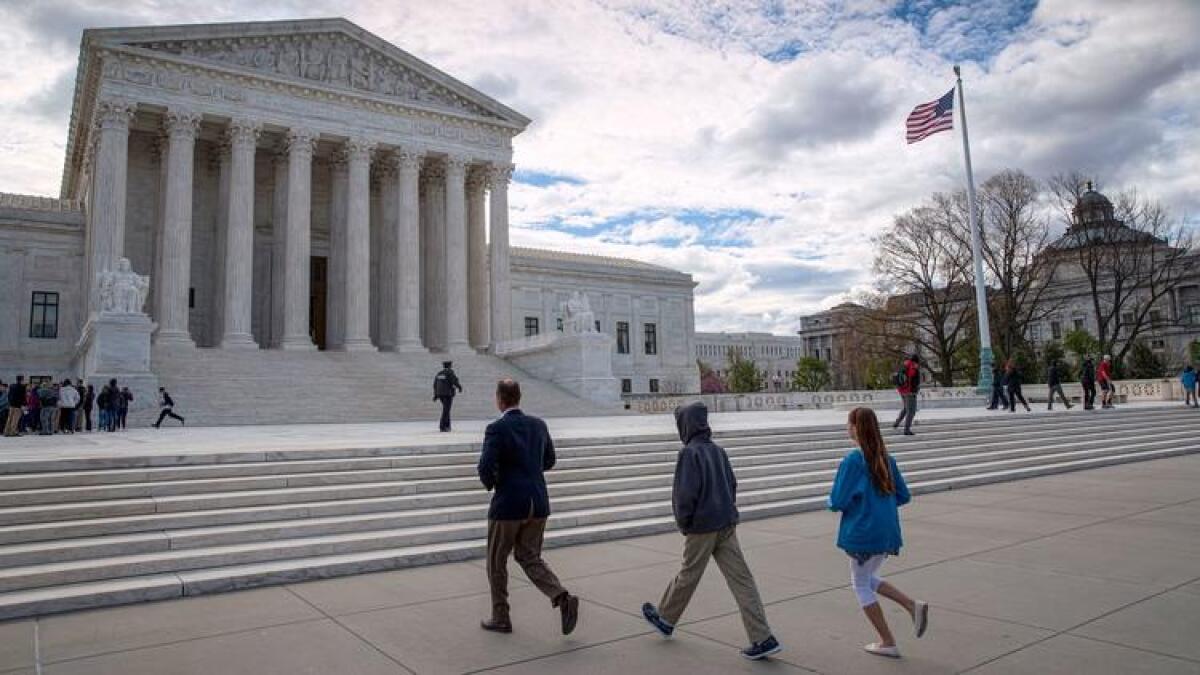
People who are freed from prison when their convictions are reversed deserve a refund of what they paid in fees, court costs and restitution, the Supreme Court ruled Wednesday.
“They are entitled to be presumed innocent” once their convictions are thrown out, said Justice Ruth Bader Ginsburg, and the state “has zero claim” to their money.
The 7-1 decision orders the state of Colorado to refund several thousand dollars to two defendants, a woman and a man, who were convicted of sex crimes but had their convictions reversed. Shannon Nelson, who was charged with abusing her children, was acquitted in a retrial, and the prostitution-related charges against Louis Madden were dropped.
In both instances, the state insisted on keeping the restitution they had paid.
Supreme Court appears ready to break down a church-state barrier in certain circumstances
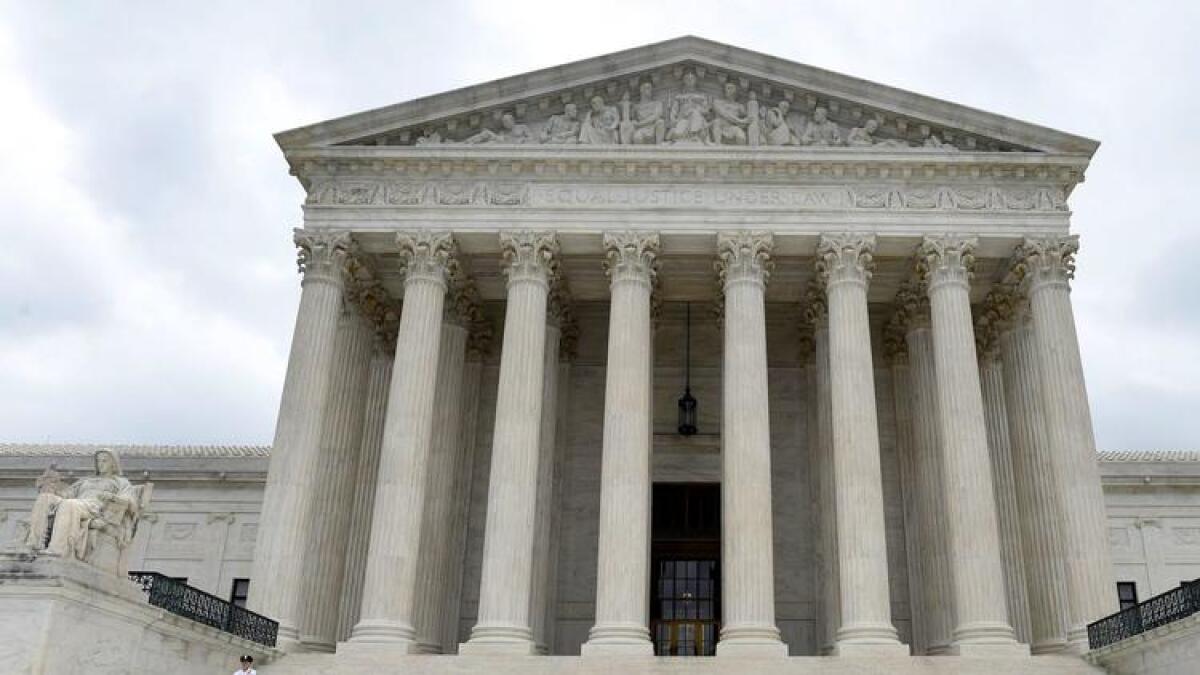
The Supreme Court on Wednesday appeared ready to break down at least part of the longstanding church-state barrier that has prevented religious schools from receiving public funds.
The justices gave a skeptical hearing to a Missouri lawyer who was defending the state’s decision to reject a grant request from a Lutheran preschool seeking to participate in a state program that provides money to schools to rubberize the surface of their playgrounds.
Missouri’s constitution, like those in at least 36 other states, bars sending tax money to churches and church schools.
But most of the justices signaled they would rule for the church on the grounds that the refusal to fund the playground amounts to unconstitutional discrimination based on religion.
Carl Vinson carrier group is finally heading to North Korea, commander says
The U.S. aircraft carrier strike force that is finally steaming toward North Korea, more than a week after the White House said it was doing so, has had its deployment extended by a month.
Rear Adm. Jim Kilby, commander of the force, posted the news on a Facebook page used by the crew of the Carl Vinson and their families.
Kilby wrote that the 30-day extended tour was intended “to provide a persistent presence in the waters off the Korean peninsula.”
The strike force -- which includes the Nimitz-class aircraft carrier, two guided-missile destroyers and a guided-missile cruiser -- was steaming north on Wednesday toward the Sea of Japan, officials said.
The warships’ movements came under scrutiny after the Navy announced on April 8 that the group had been diverted from Singapore to the Western Pacific as the Trump administration sought to defuse a crisis with North Korea.
Over the next week, President Trump, Secretary of Defense James Mattis, national security advisor H.R. McMaster, White House spokesman Sean Spicer and other officials all spoke of the carrier’s positioning as a dramatic show of force against Pyongyang.
On Tuesday, it became clear that the Carl Vinson was actually thousands of miles away in the Indian Ocean last week on joint exercises with the Australian navy and did not head north until after the weekend crisis with Pyongyang had passed.
The Navy posted a photograph showing the Carl Vinson still in the Sunda Strait, between the Indonesian islands of Sumatra and Java, about 3,500 miles south of the Korean peninsula. The photo was taken Saturday.
Spicer deflected all questions about the embarrassing episode at Wednesday’s White House press briefing, insisting that the Trump administration was honest from the beginning.
“The president said we have an armada going to the peninsula,” Spicer said. “That is a fact. It has happened; it is happening, rather.”
“We said it was ‘heading’ there,” he said. “It is ‘heading’ there.”
In the Facebook post, Kilby did not indicate why the Pentagon did not correct administration officials who indicated that the Carl Vinson was near North Korea last weekend in response to the possibility that Pyongyang would conduct a sixth underground nuclear test or try to test launch an intercontinental ballistic missile for the first time.
North Korea held a massive military parade on Saturday to celebrate a major national holiday and conducted a midrange missile test Sunday that fizzled immediately after launch.
“Our mission is to reassure allies and our partners of our steadfast commitment to the Indo-Asia-Pacific region,” Kilby wrote.
“We will continue to be the centerpiece of visible maritime deterrence, providing our national command authority with flexible deterrent options, all domain access, and a visible forward presence.”
Sean Spicer should cool down and stick to the facts, predecessors say
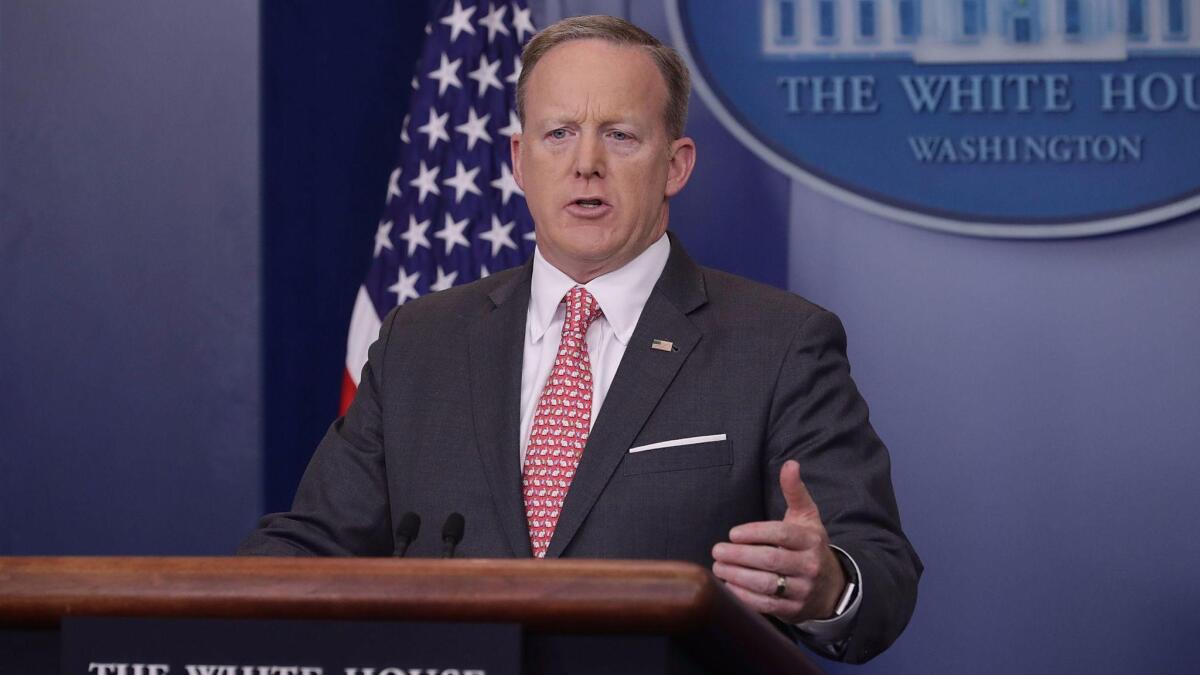
In the 88 years since President Hoover named a former Minneapolis Tribune reporter as the first White House press secretary, nobody who has held that job has stumbled as quickly or dramatically as Sean Spicer.
Millions have gaped at the spectacle of Spicer’s daily briefings on cable news. Melissa McCarthy’s impersonation of him on NBC’s “Saturday Night Live,” most recently in an Easter bunny outfit similar to one he once wore at a White House holiday event a few years ago, has turned Spicer into an improbable pop culture figure. She portrays him as a lying buffoon who badgers the press.
By all accounts, a White House press secretary’s job is hard, and missteps are inevitable. “Even the best trip themselves up,” said Joe Lockhart, who took the job just weeks before President Clinton was impeached in the Monica Lewinsky sex scandal.
Last week, Spicer profusely apologized for saying that Adolf Hitler did not use poison gas against his own people the way Syrian President Bashar Assad did. If it wasn’t the worst blunder of any White House press secretary since 1929, it was close.
But anyone who has held Spicer’s job knows what it feels like to make a gaffe at the White House lectern.
“When you get to a place where it doesn’t sound right, you just literally have to stop, even if it’s uncomfortable, and do a quick damage assessment in your head, and — particularly if it’s not what you meant — take a step back and overtly say, ‘I misspoke there,’” Lockhart said.
And so it might benefit Spicer to look over a list of “lessons learned” from previous press secretaries compiled by the White House Transition Project, a nonpartisan group that helps new administrations organize their takeover of the government.
Utah Rep. Jason Chaffetz says he won’t run for reelection
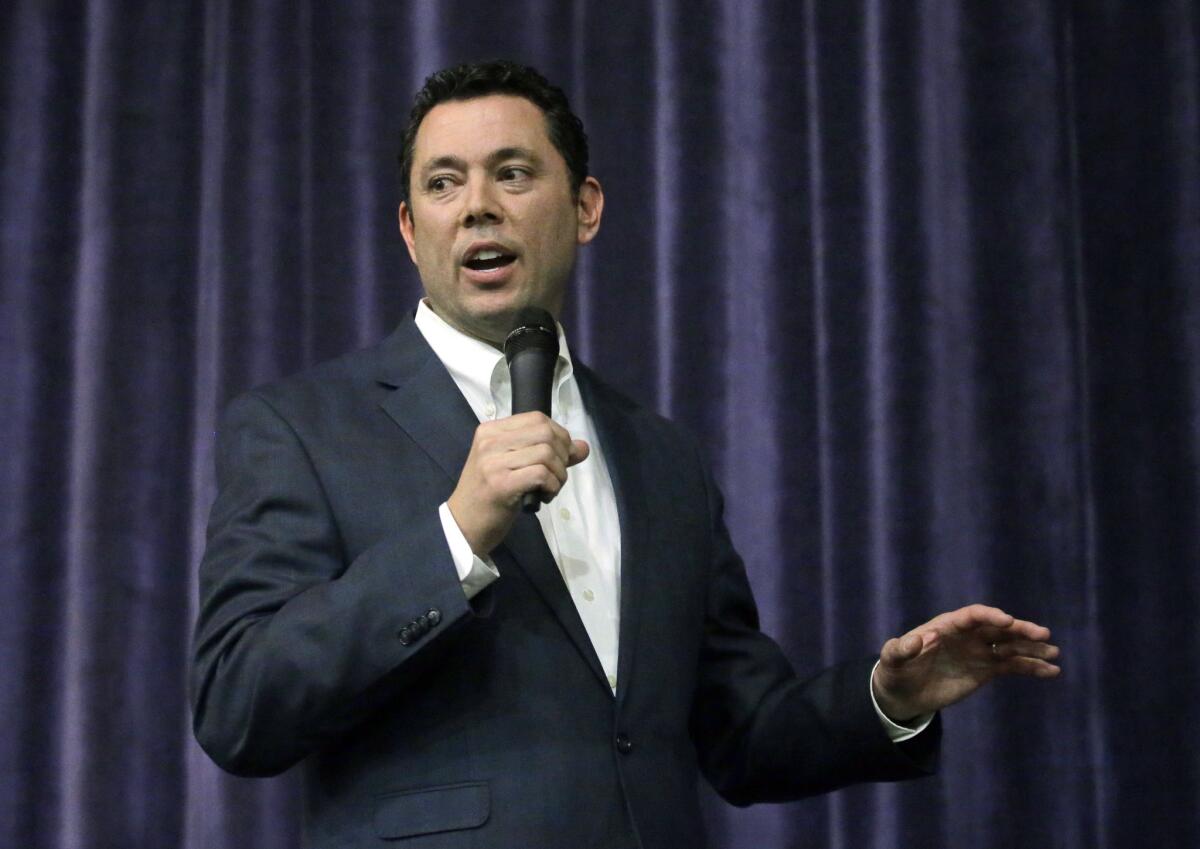
Utah Rep. Jason Chaffetz, a Republican who chairs the House Oversight Committee, said Wednesday that he won’t for reelection or any other office in 2018.
Chaffetz, who has been rumored as a possible candidate for Senate or governor, said that after consulting with his family and “prayerful consideration, I have decided I will not be a candidate for any office in 2018.”
Chaffetz, 50, in his fifth term, said in a statement on Facebook that he has long advocated that public service should be for a limited time and not a lifetime or full career.
He said that after more than 1,500 nights away from home, “it is time” to step aside.
Chaffetz said he has “no ulterior motives,” is healthy and is confident he would be reelected if he had chosen to run.
Mike Pence’s warning to North Korea: ‘The sword stands ready’
From the wind-swept deck of a massive aircraft carrier, Vice President Mike Pence on Wednesday warned North Korea not to test the resolve of the U.S. military, promising that it would make an “overwhelming and effective” response to any use of conventional or nuclear weapons.
Pence, dressed in a green military jacket, said aboard the Ronald Reagan that President Trump’s administration would continue to “work diligently” with Japan, China and other global powers to apply economic and diplomatic pressure on Pyongyang. But, he told the sailors aboard the vessel, “as all of you know, readiness is the key.”
“The United States of America will always seek peace but under President Trump, the shield stands guard and the sword stands ready,” Pence told 2,500 sailors wearing blue fatigues and Navy baseball caps on a sunny, windy morning aboard the carrier at the U.S. Yokosuka naval base in Tokyo Bay.
“Those who would challenge our resolve or readiness should know, we will defeat any attack and meet any use of conventional or nuclear weapons with an overwhelming and effective American response,” Pence said.
The vice president said the U.S. would honor its alliances with Pacific Rim nations and protect freedom of navigation in the South China Sea, which has the sea lanes vital to global shipping and where China has been staking claim to disputed territory.
From two continents, Pence and Defense Secretary James N. Mattis warned that North Korea’s latest failed missile launch was a reckless act of provocation and assured allies in Asia that the U.S. was ready to work to achieve a peaceful denuclearization of the Korean Peninsula.
Mattis denounced North Korea’s attempted missile launch as he began a Middle East tour, telling reporters traveling with him to Saudi Arabia, “the leader of North Korea again recklessly tried to provoke something by launching a missile.” The term “reckless” is one the North Koreans have used to describe ongoing large-scale U.S. and South Korean military exercises, which the North calls a dress rehearsal for an invasion.
Mattis did not identify the type of missile but said it was not of intercontinental range, meaning it could not reach U.S. territory. He did not comment on what might have caused the missile to fail.
Another official, speaking on condition of anonymity to discuss an intelligence matter, said the missile was a Scud variant that the U.S. calls a KN-17.
Mattis credited China with trying to help get the North Korea situation “under control” with the goal of denuclearizing the peninsula.
Pence’s speech on the aircraft carrier followed meetings Tuesday in Tokyo with Japanese Prime Minister Shinzo Abe, where he noted that “all options are on the table.”
Abe said that it was a “matter of paramount importance for us to seek diplomatic efforts as well peaceable settlements of the issue.”
“But at the same time,” the prime minister said, “dialogue for the sake of dialogue is valueless and it is necessary for us to exercise pressure on North Korea so that it comes forward and engages in this serious dialogue.”
The Trump administration has signaled a forceful U.S. stance on North Korea’s recent actions, dispatching Pence to the Demilitarized Zone dividing North and South Korea on Monday in a show of American resolve. But it remains unclear what might come next.
Behind the heated rhetoric, Trump’s strategy in the region looks somewhat similar to predecessor Barack Obama’s — albeit with the added unpredictability of a new president who has shown he’s willing to use force.
Pence said Trump was hopeful China would use its influence in the region to pressure North Korea to abandon its weapons program. But the vice president expressed impatience with the unwillingness of the North to move toward ridding itself of nuclear weapons and ballistic missiles.
In Moscow, Russian Foreign Minister Sergey Lavrov told reporters he hopes “there will be no unilateral actions like those we saw recently in Syria and that the U.S. will follow the line that President Trump repeatedly voiced during the election campaign.”
China made a plea for a return to negotiations. Foreign Ministry spokesman Lu Kang said tensions need to be eased on the Korean Peninsula to bring the escalating dispute to a peaceful resolution. Lu said Beijing wants to resume the multi-party negotiations that ended in stalemate in 2009 and suggested that U.S. plans to deploy a missile defense system in South Korea were damaging its relations with China.
Democrat hovers near the 50% needed to capture Atlanta-area House race

A hotly-contested House election in the Atlanta suburbs remained up in the air Tuesday night as Republicans fought to deny a first-time Democratic candidate the right to claim the seat outright in a race that served as a referendum on President Trump.
Democrat Jon Ossoff was easily leading in the race for the 6th Congressional District seat, but hovering near the 50% mark he had to exceed to avoid a June 20 runoff. Areas yet to be counted appeared likely to provide Republican votes.
In distant second place as votes were tallied late Tuesday was former Georgia Secretary of State Karen Handel, a Republican.
The first-place finish by Ossoff, a 30-year-old former congressional aide and filmmaker, was greatly aided by millions of dollars in donations from restive Democrats and by the presence on the ballot of nearly a dozen Republicans, which split the party’s vote. The seat had been held until February by Trump’s Health and Human Services secretary, Tom Price.
Ossoff’s odds would lengthen in a runoff, as Republicans will have the opportunity to coalesce around one candidate instead of being split.
The fight over the 6th District is a precursor of what is expected to be a huge battle for the House in 2018, assuming that Trump remains unpopular and Republicans remain in disarray. Republicans hold a margin of more than 40 seats at present, and the only opportunity for gains by Democrats depends on flipping seats where voters are less attached to the new president.
Polls close in close-fought Georgia House race seen as test of Trump
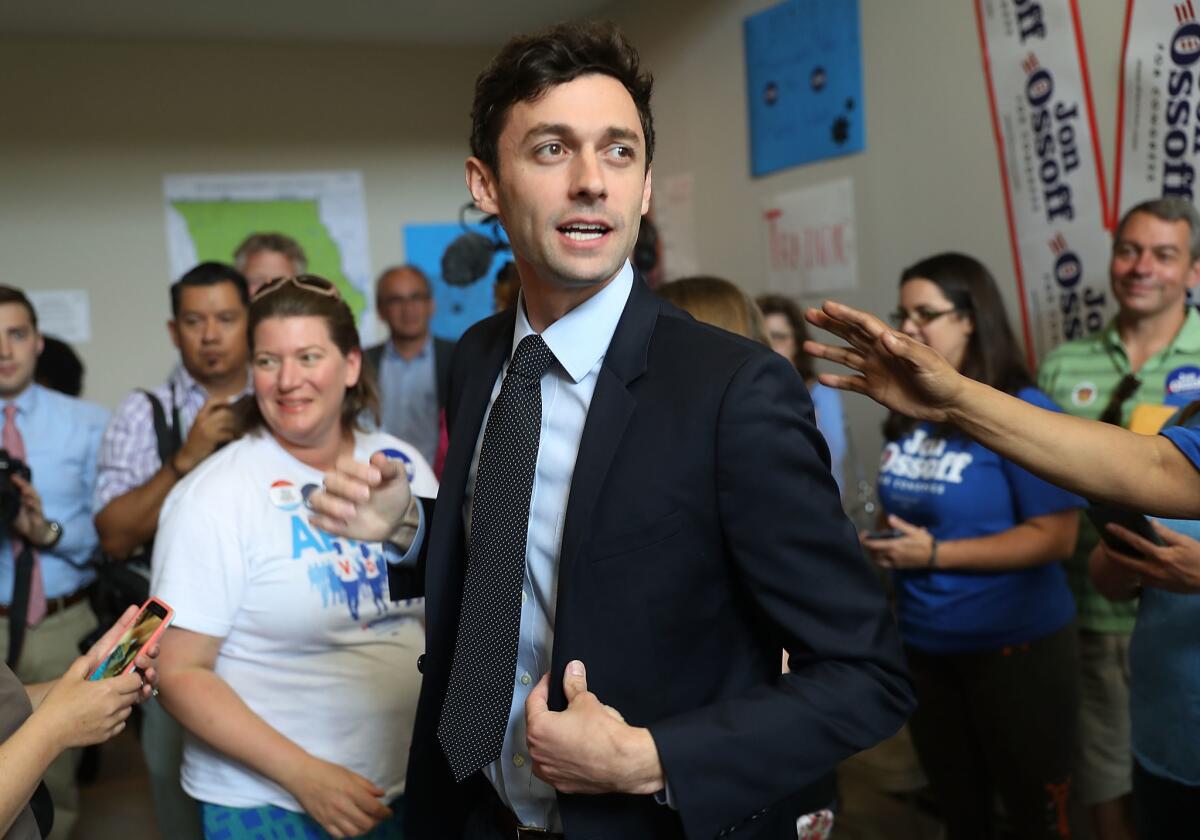
Polls are closing in Georgia this evening in a House special election that has emerged as a surprisingly white-knuckled referendum on President Trump’s early presidency.
The first returns from the 6th Congressional District, in the north Atlanta suburbs, are expected to benefit Democrat Jon Ossoff, given his multimillion-dollar effort to round up early votes and the appearance on the ballot of nearly a dozen GOP candidates who split the district’s majority Republican vote.
By the time the final returns are in, Democrats hope Ossoff can get just over 50% of the vote, allowing him to win the seat outright in the all-candidates primary.
Republicans hope to deny Ossoff an outright victory, allowing them to consolidate voters for the June 20 runoff. Taken together, as election day neared, the polling percentages for all Republicans combined narrowly outdistanced the Democratic total.
Trump issued a series of tweets in the closing days of the race, exhorting Republicans to turn out and prevent Ossoff from winning the seat without a runoff.
“Republicans must get out today and VOTE in Georgia 6. Force runoff and easy win! Dem Ossoff will raise your taxes-very bad on crime & 2nd A,” Trump tweeted Tuesday.
The Georgia special election comes five months after Trump won the district by less than 2 percentage points, far below the 20-points-plus victories usually awarded Republican nominees by its voters. That gave Democrats an opening, but also raised the stakes involved in trying to flip the seat to their side of the aisle.
Carrier strike group wasn’t headed to Korean peninsula, despite Trump’s saber-rattling
An aircraft carrier strike group that the Trump administration had said was headed toward North Korea in a powerful show of force has instead spent the last week thousands of miles away – and heading in the opposite direction.
Adm. Harry Harris, who heads U.S. Pacific Command, initially announced in a news release on April 8 that he had directed the Carl Vinson carrier strike group to “sail north” from Singapore, adding that the ships were being diverted from planned port visits to Australia.
The Trump administration cited the deployment of the naval strike force, which includes the carrier and four warships, as a clear warning to North Korea, which was said to be planning a nuclear test last weekend in conjunction with a national holiday.
“We are sending an armada, very powerful,” to the waters off Korea, President Trump told Fox Business News on April 12.
A day earlier, Defense Secretary James N. Mattis told Pentagon reporters that the aircraft carrier was “on her way up there.”
Some news organizations cited the armada’s apparent race northward as a sign of a possible preemptive attack on North Korea, spurring global concerns of a possible war.
While the Pentagon sought to downplay those reports late last week, at no point did it or the White House suggest the Carl Vinson was not, in fact, nearing Korea to give Trump a more robust military option should he decide he needs one.
Pundits cited the warships’ approach as evidence of Trump’s muscular style days after he had ordered a cruise missile strike on Syria in response to a poison gas attack, and the Air Force had dropped the so-called Mother of All Bombs on an Islamic State stronghold in Afghanistan.
But on Saturday, a full week after the initial news release, the Navy posted a photograph showing the Carl Vinson transiting south through the Sunda Strait between the Indonesian islands of Sumatra and Java, about 3,500 miles southwest of the Korean peninsula.
As Defense News first reported on Monday, the strike force has been taking part in exercises with Australian forces in the Indian Ocean over the last week
It is now – really – steaming northward and is expected to arrive in the Sea of Japan sometime next week, U.S. officials said.
It wasn’t immediately clear whether the mix-up was due to a deliberate attempt to psych out North Korea’s leaders, or a false narrative that resulted from miscommunications up the chain of command.
On Sunday, North Korea attempted to test a ballistic missile, but it exploded seconds after launch.
White House defends mixed messages from Trump administration over Turkey
The White House on Tuesday sought to defend President Trump’s decision to make a congratulatory telephone call to his Turkish counterpart following a bitterly disputed vote in Turkey that international monitors said was likely fraudulent.
Trump’s call to Turkish President Recep Tayyip Erdogan on Monday contradicted more cautious and concerned voices from within his own young administration. Many fear Sunday’s referendum in Turkey will erode that nation’s attempts to build democracy by making the president all-powerful.
Erdogan’s side in the constitutional referendum, which will greatly expand his powers and likely leave him in office for at least another decade, won narrowly, according to preliminary official results. But the vote was widely denounced by Turkish opposition figures and numerous international observers amid allegations of widespread fraud.
Moreover, human rights and pro-democracy organizations have attacked Erdogan’s plans, saying the new regulations contained in the referendum will solidify his already-autocratic hold on the Turkish political system.
In the call, Trump congratulated Erdogan on his victory, the White House said, making no mention of any controversy. He went on to thank Erdogan for his help in the battle in Syria and the fight against Islamic State, the White House said.
Turkey, a NATO ally, performs a key role in both battles.
On Tuesday, pressed about the call, Trump’s deputy press secretary, Sarah Huckabee Sanders, said the referendum was really just a secondary topic of the conversation and that the emphasis was on continued cooperation in counter-terrorism.
“The president’s No. 1 priority is protecting Americans, keeping Americans safe, and sometimes we’re going to have to work with other countries and some of our NATO partners in order to do that,” she said on Air Force One taking Trump to an appearance in Wisconsin.
Sanders denied there were contradictions between Trump’s call and an earlier statement Monday by the State Department. She also contradicted his main spokesman, Sean Spicer.
Just hours before Trump’s call to Erdogan, Spicer was asked about reaction to the Turkey vote. He said it would be necessary to wait for observers to finish a review of the disputed results, which he said could take 10 to 12 days.
“And so we’ll wait and let them do their job,” Spicer told reporters at the daily White House briefing on Monday. “I think we’d rather not get ahead of that report and start to make decisions without knowing.”
He made no mention of Trump’s call nor of the fact that Erdogan had already claimed victory.
Separately, the State Department issued a more muted and critical statement, also on Monday, calling on Erdogan to “protect the fundamental rights and freedoms” of all Turkish citizens and taking note of “irregularities” reported by international election monitors during and leading up to the vote.
“The United States continues to support Turkey’s democratic development, to which commitment to the rule of law and a diverse and free media remain essential,” State Department spokesman Mark Toner said in a statement. Erdogan has jailed thousands of journalists, teachers, civil servants, military officers and dissidents in the wake of a failed coup last summer.
Trump’s friendlier message seemed to be part of his pattern to favor a nation’s cooperation in the fight against terrorism over other concerns, such as human rights or possible electoral fraud. Similarly, Trump gave an effusively warm White House welcome earlier this month to Egypt’s strongman, President Abdel Fattah Sisi.
Trump has made clear that human rights and “democracy building” are not priorities of his shoot-from-the-hip style of foreign policy.
The mixed messages on Turkey also reflect continued disarray within the administration, now approaching its 100-day mark. Trump deliberately rejects the expertise of his State Department, frequently declining diplomatic briefings before calls and meetings with world leaders.
On numerous occasions, he has made statements in direct contradiction to some of his senior aides, including Homeland Security Secretary John Kelly, Secretary of State Rex Tillerson and the U.S. Ambassador to the United Nations Nikki Haley.
Atty. Gen. Sessions says lax immigration enforcement is enabling gangs like MS-13

Atty. Gen. Jeff Sessions vowed a tougher approach to violent drug cartels Tuesday, calling them “a plague that has spread across our country” because of lax immigration enforcement.
He promised a crackdown hours after President Trump criticized his predecessor for being “weak” on illegal immigration and blamed him, without evidence, for allowing the violent Mara Salvatrucha gang, also known as MS-13, to form in America.
“The weak illegal immigration policies of the Obama Admin. allowed bad MS 13 gangs to form in cities across U.S. We are removing them fast!” the president wrote on Twitter at about 5:40 a.m.
Mara Salvatrucha was started in Los Angeles in the mid-1980s by Salvadoran immigrants fleeing the country’s civil war.
In the latest incident, police said last week that they believe MS-13 members on Long Island, N.Y., had carried out a quadruple homicide against a rival gang.
In prepared remarks for a meeting of organized crime task forces at the Justice Department, Sessions argued that MS-13 has expanded because of a porous Southwest border and “sanctuary cities” that refuse to cooperate with immigration agents.
“Because of an open border and years of lax immigration enforcement, MS-13 has been sending both recruiters and members to regenerate gangs that previously had been decimated, and smuggling members across the border as unaccompanied minors,” Sessions said.
He added that “sanctuary cities dangerously undermine” attempts to battle the group.
“Harboring criminal aliens only helps violent gangs like MS-13,” Sessions said.
As the nation’s top law enforcement officer, Sessions has focused on curbing both legal and illegal immigration, a hallmark of his nearly four terms in the Senate.
Last week, in a speech in Arizona, Sessions called on federal prosecutors to be more aggressive about filing felony charges against people who cross the border illegally.
The FBI created a task force to investigate MS-13 in 2004, and four years later — before Obama was elected — said the violent gang had established a presence in at least 42 states.
“They are not content to simply ruin the lives of adults — MS-13 recruits in our high schools, our middle schools and even our elementary schools,” Sessions said.
Trump to take first step toward restricting H-1B visas, widely used by tech industry
President Trump on Tuesday will take what the White House is calling a “transitional step” toward a revamped immigration system, ordering a review of a visa program meant to attract skilled immigrant labor that administration officials say has been abused to the detriment of American workers.
An executive order Trump is scheduled to sign during a visit to a Wisconsin manufacturer will direct federal agencies to review the H-1B visa program, which is widely used by the tech industry to bring workers in from other countries.
The White House argues that the program has been “abused to the point of being rendered … inoperative,” as an official told reporters Monday, bringing in workers for positions where they earn less than the industry average paid to American workers. That’s a criticism that has also been widely made by outside analysts.
A senior administration official, briefing reporters Monday on the condition of anonymity ahead of the president’s event, said the goal of the review would be to shift the process for awarding H1-B visas to put a priority on higher-skilled and higher-paid workers, making it more difficult to use it to replace American workers.
Trump’s plan, which also directs a separate review of government purchasing requirements, is consistent with the “Buy American, Hire American” credo that was a staple of his campaign, featured prominently in his inaugural address and outlined in his address to Congress in February.
“This is a transitional step to get toward a more skills-based and merit-based immigration system,” the official said.
The executive order is the latest in a series of steps the administration has already taken on H-1B visas. Under guidance issued earlier this month by the Department of Homeland Security, companies seeking to sponsor computer programmers for a guest visa would need to take additional steps to verify the tasks performed qualify as a “specialty occupation.”
On taxes and visitor logs, White House grapples with transparency questions

The Trump White House defended its record on transparency Monday despite two glaring cases in which its practices fell short of those of the Obama administration.
In his first briefing since the administration said it would no longer release logs of visitors to the White House, Press Secretary Sean Spicer said the White House was simply returning to a policy that had been in place until President Obama took office. He dismissed the disclosures made by the last administration as a “faux attempt” at transparency.
The Obama administration, starting in September 2009, voluntarily began releasing records each month of who had visited the West Wing or other offices in the executive complex. There were exceptions, though, for visits deemed to be purely personal or for highly sensitive purposes, including some national security discussions or interviews of candidates for positions like Supreme Court seats.
“We recognize that there’s a privacy aspect to allowing citizens to come express their views. And that’s why we maintain the same policy that every other administration did coming up here prior to the last one,” Spicer said.
“And the last one, frankly, was a faux level of doing that, because when you go through, and you scrub everyone’s name out that you don’t want everyone to know, that really is not an honest attempt at doing it.”
Separately, Spicer also said President Trump would not release his 2016 tax returns, citing the same justification the campaign had offered for not releasing filings from previous years: They are under audit.
“I think the president’s view on this has been very clear from the campaign, and the American people understood it when they elected him in November,” Spicer said two days after a series of demonstrations across the country called for the president to release his tax records.
Although Trump has long claimed his 2015 returns were under audit -- something the IRS as a policy does not confirm -- it is guaranteed that his 2016 filings will be. As USA Today noted last week, all presidents are subject to audit under Internal Revenue Service practice dating back decades. That fact hasn’t stopped past presidents from releasing their tax returns.
On the issue of visitor logs, Obama administration officials believed they never got the credit from the public or the press corps that they believed they deserved for what was a new policy at the time. In 2016, then-Press Secretary Josh Earnest wrote a letter to the New York Times claiming that the policy was just one of several ways in which they were fulfilling Obama’s promise “to lead the most transparent White House in history.”
At the very least, though, Obama’s administration set a standard to which their Republican successor now is being held.
Reporters asked Spicer on Monday about the verdict of some ethics experts that the Trump administration was already the least transparent in decades. He disagreed, citing what he said was increased access reporters have to official events.
“I think we’ve done a fairly good job of making sure that people know who he’s meeting with, who he’s speaking to, and when appropriate, the contents of those calls,” Spicer said in his 30-minute briefing, one far shorter than the ones typically held in the Obama administration.
Tax reform is unlikely to be enacted by August, Treasury secretary says
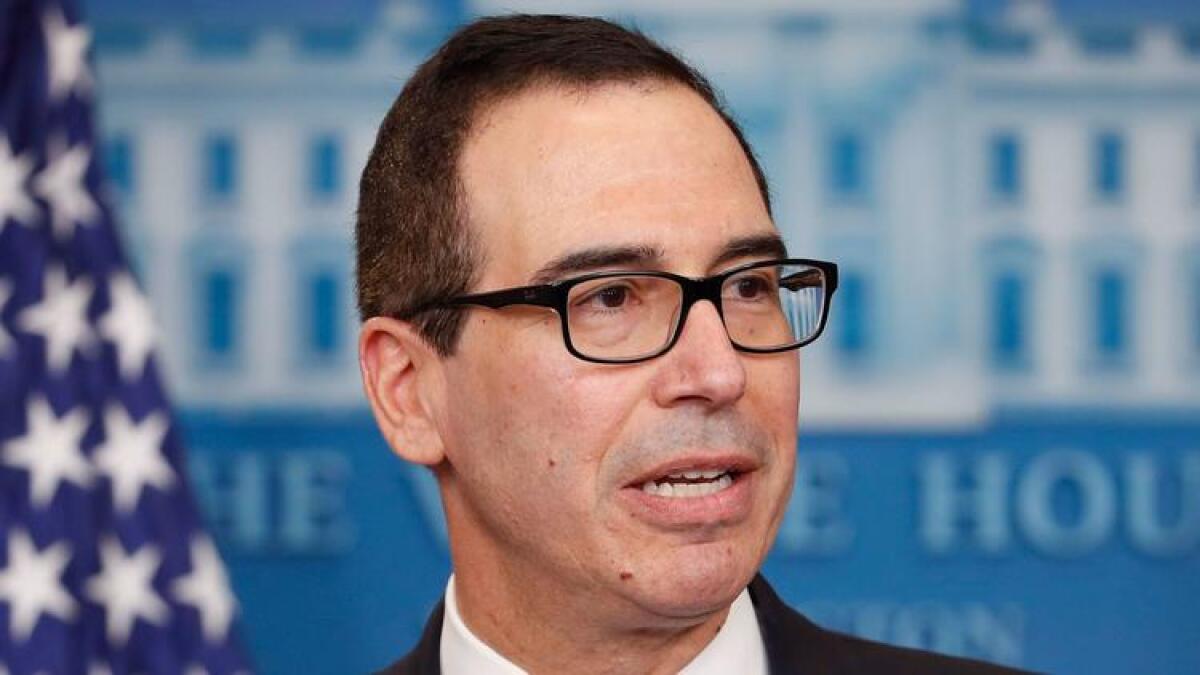
The Trump administration is unlikely to meet its self-declared August deadline for enacting tax reform, Treasury Secretary Steven T. Mnuchin said Monday. That will make it more difficult for companies to factor any changes into their spending decisions for next year.
The failed effort to repeal and replace the Affordable Care Act, also known as Obamacare, threw off a timetable that even Mnuchin had admitted was ambitious for the complex task of overhauling the tax code, he told the Financial Times.
“It started as [an] aggressive timeline,” Mnuchin said. “It is fair to say it is probably delayed a bit because of the healthcare” debate.
Mnuchin said Monday that he still expected tax reform to be enacted this year.
Watch live: Thousands, including former Easter bunny Sean Spicer, turn out for White House Easter Egg Roll
Washington is on the hunt for eggs.
More than 20,000 adults and children are expected to turn out for the White House’s 139th Easter Egg Roll.
First Lady Melania Trump is hosting the event on the South Lawn, where attendees will roll nearly 18,000 eggs.
The tradition officially dates back to 1878, when President Rutherford B. Hayes allowed children to enter the grounds on Easter Monday and roll their eggs.
Speaking of history, Press Secretary Sean Spicer played the role of Easter bunny for President George W. Bush when he served as the assistant U.S. trade representative for media and public affairs.
You can bet he got a photo-op with his successor.
Standing beside his wife, son, Barron, and an Easter bunny, President Trump addressed the crowd.
“We will be stronger and bigger and better as a nation than ever before. We’re right on track,” he said.
Homeland Security chief says ‘confusion’ spurred by the Trump administration is stemming illegal immigration
Tough rhetoric from the Trump administration has injected “confusion” into those who are considering crossing illegally into the United States and made them abandon their travel plans, a senior official said Sunday.
John Kelly, Trump’s secretary of Homeland Security, said President Trump’s talk and actions have helped push illegal border crossings from Mexico to an all-time low. (In fact, illegal migration from Mexico has been declining for many years.)
“The attention being paid to the border certainly has injected into those people ... enough confusion in their minds,” Kelly said on NBC’s “Meet the Press.”
“The very, very, very good news is, for a lot of different reasons, the number of illegal aliens that are moving up from the south has dropped off precipitously.”
Trump has vowed to deport millions of people in the country illegally and build a wall on the United States’ border with Mexico to keep them out.
“The laws on the books are pretty straightforward: If you’re here illegally, you should leave or you should be deported, put through the system,” Kelly said.
Last week, Atty. Gen. Jeff Sessions, on a tour of the border, announced orders to law enforcement officials to crack down harder on immigrants who cross into the United States illegally multiple times. Some cities, including several in California, have declared themselves sanctuaries and say they will refuse to enforce federal laws that target immigrants in the country illegally.
Trump administration warns North Korea over nuclear program
President Trump’s senior security advisor on Sunday warned North Korea to end its nuclear testing or face U.S. reprisals, and he called that country’s leader a global threat.
National security advisor H.R. McMaster said Trump “will take action” if North Korea continues to threaten the U.S.
McMaster was asked on ABC’s Sunday program “This Week” about North Korea’s complaints that aggressive language from the U .S. increases the likelihood of conflict.
“I think it should make clear to the North Korean regime that it is in their best interest to stop the development of these [nuclear and ballistic] weapons, to stop the development of these missiles, and to de-nuclearize the peninsula,” he said.
McMaster spoke as North Korea launched another missile test that apparently failed, and as Vice President Pence arrived in South Korea on an 11-day trip to Asia.
McMaster said it was “clear” that Trump would not allow North Korea to threaten the United States but did not offer specifics about what kind of action the administration is contemplating.
He said North Korea’s leader was “unpredictable” and a threat to the world but also to those who oppose him at home — even his own family members if they get in the way.
“I mean, what Kim Jong Un is doing is a threat to all people in the region and globally as well,” McMaster said.
McMaster reiterated the administration’s contention that China, North Korea’s only big ally, take a greater role in exerting economic pressure on Pyongyang to cease its nuclear ambitions.
Bold promises, fewer results: Trump’s executive orders don’t always live up to his claims
It’s been one of President Trump’s favorite boasts since he took office: By his order, new oil and gas pipelines built in the U.S. will be made from American steel.
As is often the case, Trump has wrapped the claim into an anecdote he often repeats. Referring to his orders to revive the Keystone XL and Dakota Access pipeline projects, Trump recalled last month that he interrupted the signing to ask, “Who makes those beautiful pipes for the pipeline?”
“Sir, they’re made outside of this country,” came the response.
“I said, ‘No more, no more.’ So we added a little clause — didn’t take much — that [if] you want to build pipelines in this country, you’re going to buy your steel, and you’re going to have it fabricated, here. Makes sense, right?”
The story has proved effective with Trump’s audiences, but it’s not an accurate description of what he did. It took the White House only a couple of weeks after the signing to acknowledge that the “Buy America” rule would not apply to Keystone. That would be unfair, officials said, because TransCanada, the company building the line, had long ago bought its pipe, some of it made in the U.S., and the rest in Canada, Italy and India.
Even so, White House officials have insisted that all future pipelines will be covered.
That’s not true, either, according to government documents and interviews with officials in the affected industries.
The actual number of pipelines covered by Trump’s Buy America rule could well be zero.
When it comes to North Korea, U.S. military options range from bad to worse
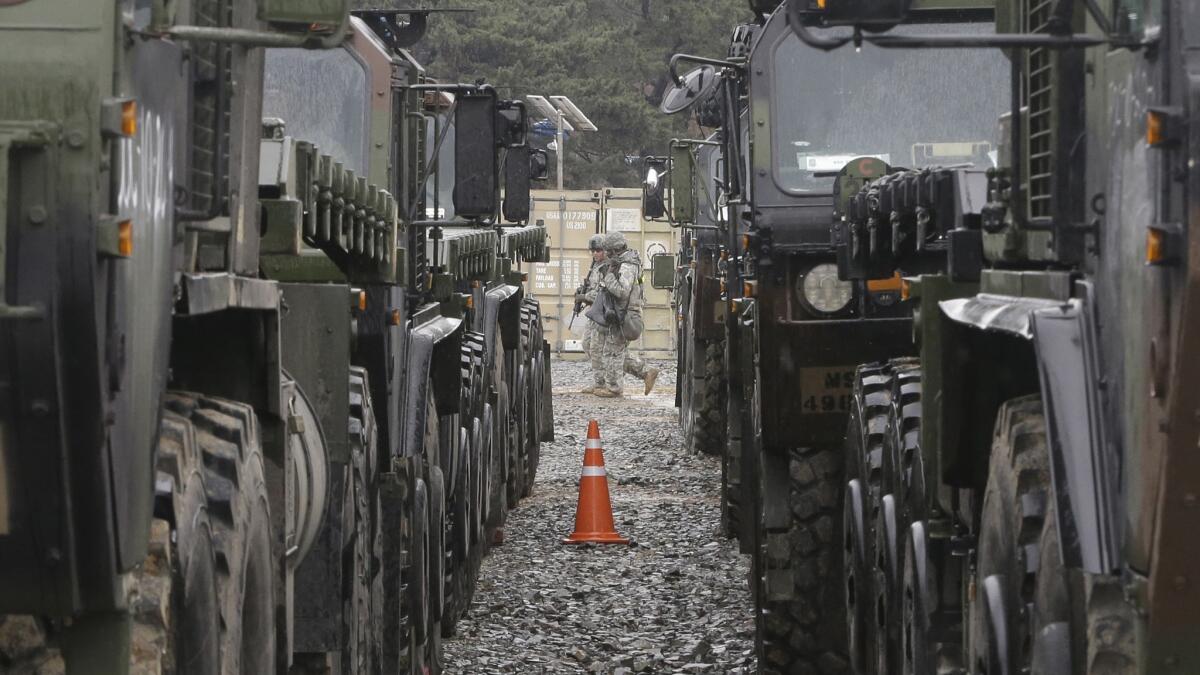
Although the Trump administration has moved an aircraft carrier strike group toward Korea and warned it would respond forcefully if Pyongyang conducts a nuclear test this weekend, likely U.S. military options range from bad to worse.
Satellite imagery has shown preparations at North Korea’s Punggye-ri nuclear weapons site, including more military personnel and mounds of dirt from recent excavations, U.S. officials and outside experts said.
North Korea’s state media has warned that Kim Jong Un’s government may use Saturday’s national holiday, marking the birthday of the country’s founder, Kim Il Sung, for a weapons test, although it could be another ballistic missile or something less provocative.
China urges calm after North Korea pledges to ‘ruthlessly ravage’ the U.S. in the event of a military strike
North Korea threatened merciless consequences to U.S. provocations on Friday, while China warned the two countries to avoid continuing talk of military conflict.
A statement from the Korean People’s Army, released through the state news agency KCNA, said President Trump had “entered the path of open threat and blackmail” against North Korea.
Officials in Pyongyang said the country would “ruthlessly ravage” the U.S. if Washington opted for an attack in response to a North Korean weapons test. Counteractions would occur “in such a merciless manner as not to allow the aggressors to survive,” the army statement said.
The comments follow warnings from the Trump administration that it could take military action against North Korea’s growing nuclear ambitions. The U.S. last weekend redirected an aircraft carrier strike group to the Korean Peninsula.
The isolated nation is celebrating the 105th birthday on Saturday of its first leader, Kim Il Sun. Analysts say the country appears to be preparing a missile launch or nuclear test that may coincide with the anniversary.
China on Friday sought to simmer the flaring tensions. Foreign Minister Wang Yi told reporters no one would win in a military conflict between the U.S. and North Korea.
“Once a war really happens, the result will be nothing but multiple loss,” he said.
Wang, in keeping with China’s preferences, encouraged dialog. “It can be official or unofficial, through one channel or dual channels, bilateral or multilateral,” he said. “China is willing to give support to all of them.”
China, North Korea’s most important ally and trading partner, worries a collapse of the government in Pyongyang would lead to a refugee crisis on its shared border and eliminate the buffer zone between China and U.S. forces stationed in South Korea.
Wang warned conflict could break out “at any moment,” and cautioned the two countries from going down an “irreversible route.”
Georgia voters in this reliably Republican district may be preparing to ‘stick it’ to Trump
This orderly swath of Atlanta suburbs was never supposed to worry Republicans. They’ve had a lock on the congressional seat since 1979, with a string of rock-ribbed conservatives such as Newt Gingrich and Tom Price.
Then Donald Trump happened.
Now the GOP is in an unexpected scramble to prevent a politically inexperienced millennial Democrat — unknown months ago — from turning their longtime stronghold blue.
Party officials are filled with angst ahead of the April 18 special election in Georgia’s 6th Congressional District to replace Price, who vacated the seat to become Trump’s Health and Human Services secretary.
After a scare for Republicans in Kansas on Tuesday, when a congressional race got uncomfortably close in a district Trump had dominated in the presidential election, the Georgia fight teeters on becoming a full-blown crisis for a party that should be relishing its recent success and consolidating power.
Energy Star ratings are cheap, effective and popular. Why does Trump want to kill them?
Commercial real estate giant CBRE is always on alert for shifts in federal government policy that might impact its vast property management and investment business.
But the Los Angeles-based Fortune 500 company never anticipated an effort to eliminate a voluntary, cost-effective initiative that has saved its customers millions of dollars and had almost no critics.
In a reflection of how much influence a handful of free-market think tanks wield over the White House, the Trump administration has decided the immensely popular Energy Star program must go.
The fight centers on the Environmental Protection Agency’s 25-year-old effort to boost efficiency in products and services by encouraging companies to compete for coveted, government-issued labels that certify a product or property meets high standards for saving energy and costs.
Trump’s White House will keep its guest book secret
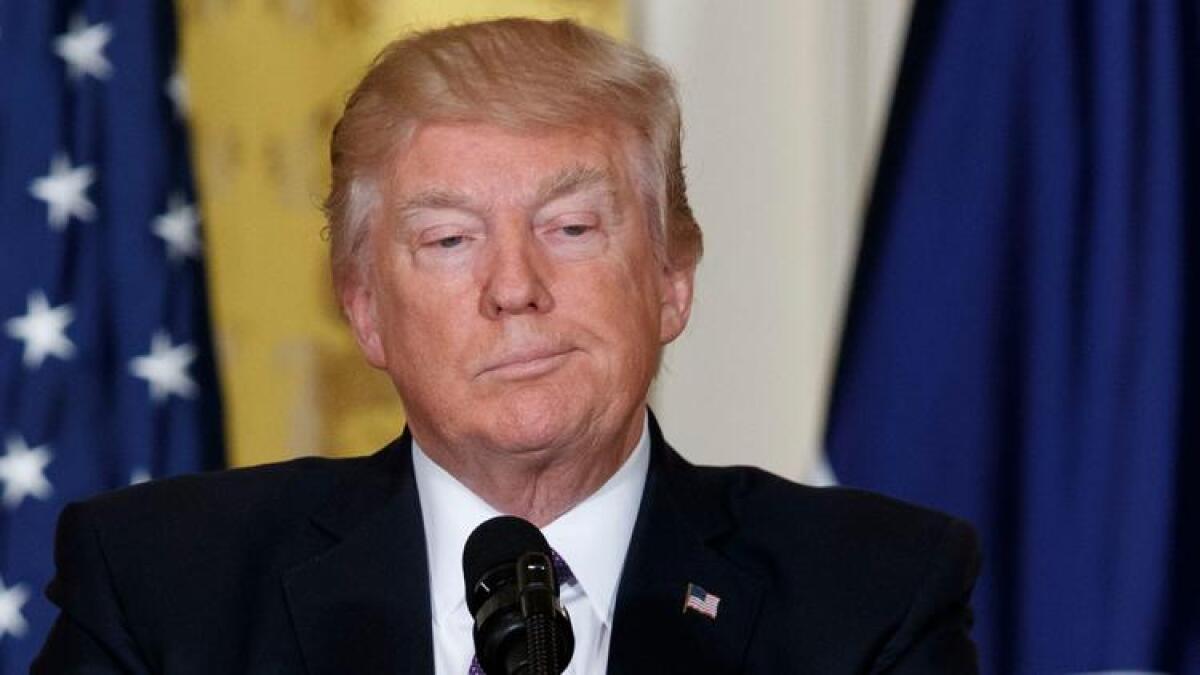
The Trump administration will keep the records of who visits the White House secret, ending a practice started under the Obama administration of partially releasing visitor logs, a White House official said Friday.
Even though President Trump led chants of “drain the swamp” during the campaign and promised to protect government business from special interests, the decision makes it harder for the public to know who is influencing the president and his close advisors.
Keeping the visitor logs hidden from public view will protect the privacy of visitors and is meant to address security risks that may be posed if people are identified publicly as close to Trump, White House communications director Mike Dubke said Friday.
The public and the media will be able to file requests for the logs under the Freedom of Information Act, Dubke said. Such requests often require legal action that can delay the release of records for several years.
“Given the grave national security risks and privacy concerns of the hundreds of thousands of visitors annually, the White House Office will disclose Secret Service logs as outlined under the Freedom of Information Act, a position the Obama White House successfully defended in federal court,” Dubke said in a statement.
The Secret Service conducts background checks and keeps a list of all visitors to the 18-acre White House grounds.
The Obama administration voluntarily released some visitor records, but often omitted the names of visitors that Obama’s aides considered sensitive, such as candidates for judicial posts and personal contacts, including celebrities and some Obama campaign donors.
President Trump’s decision to drop ‘mother of all bombs’ gains plaudits from conservatives after recent flip-flops
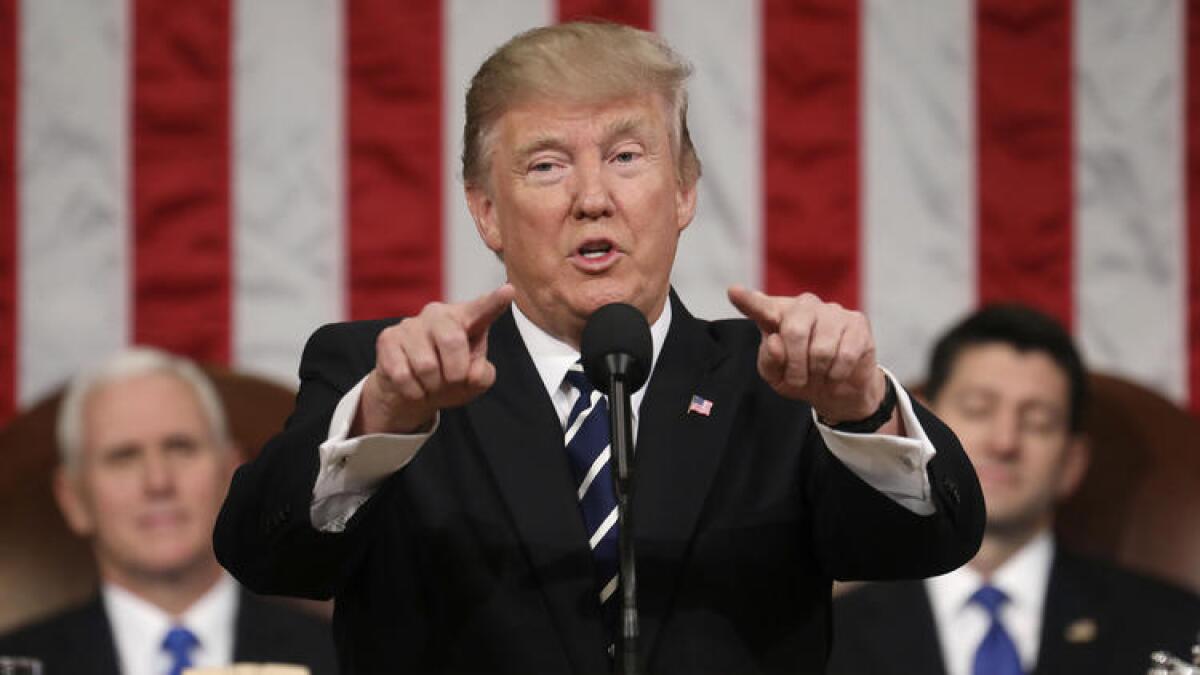
On the campaign trail, then-candidate Donald Trump said he would wipe out Islamic State.
On Thursday he dropped what the military calls the “mother of all bombs” on Islamic State targets in Afghanistan.
Trump, in measured comments after the strike, said he was proud of the military and that he felt it was a “successful” operation.
The move by Trump sticks to a campaign pledge that he’ll focus on defeating the Islamic State, which comes after a week of flip-flops on various campaign promises. On Thursday, in this space, we noted that some in conservative media where not happy with his recent shifts on issues ranging from China to NATO.
It appears at least some in conservative media are now pleased with Trump’s attack on Islamic State.
Here are some of today’s headlines:
The US military just dropped the most powerful non-nuclear bomb on ISIS in its first ever combat use (Independent Journal Review)
“The United States just sent a clear message to the jihadists trying to gain a foothold in the country and its one for the history books. The United States dropped a MOAB bomb (Mother of all Bombs) on the tunnels ISIS uses,” notes the piece. “The MOAB is a 21,000-pound bomb and is the most powerful non-nuclear bomb in the U.S. arsenal.”
…And this from Rush Limbaugh:
“I ask you to think back to the campaign, what did Donald Trump say about ISIS? He said we’re gonna take ’em out. We’ve had a bunch of pansies and wussies that haven’t had a serious moment about it. …So here comes the biggest bomb, nonnuclear bomb, dropped in Afghanistan on an ISIS location.”
Rep. Steve King is ‘very disappointed’ about Trump’s inaction on amnesty (Daily Caller)
He’s an immigration hard-liner, who was drawn to Trump for his vows to crack down on illegal immigration.
But as Trump approaches the 100-day mark of his presidency, Rep. Steve King (R-Iowa) told the Daily Caller he is “very disappointed on the lack of action” from the White House on Deferred Action for Childhood Arrivals (DACA) and Deferred Action for Parents of Americans (DAPA).
Trump has signed executive orders on immigration, vowing to make deportations of immigrants in the country illegally with criminal records a top priority.
He has not, however, sought to focus on those in DACA, which shields people from deportation. Many with DACA status were brought to the country as babies by their parents.
Our three presidents born in 1946 (TownHall)
While Trump, Bill Clinton and George W. Bush are very different, they have at least one thing in common: All were born in the summer of 1946.
Trump in June, Bush in July and Clinton in August.
This piece by Michael Barone in TownHall notes the influence of their generation and their different political paths.
“The U.S. Census Bureau considers 1946 to be the first year of the baby boom, a remarkable and unpredicted sudden surge in births in the United States and numerous other countries,” he writes. “The leading edge of the baby-boom generation, the oldest members of an enormous age cohort, has made its mark on American life. Growing up in an era of postwar conformity, they insisted on doing their own thing.”
36 Islamic State fighters killed by the ‘mother of all bombs,’ Afghan officials say
The attack on a tunnel complex in remote eastern Afghanistan with the largest non-nuclear weapon ever used in combat by the U.S. military left 36 Islamic State group fighters dead and no civilian casualties, Afghanistan officials said Friday.
The Ministry of Defense said in a statement that several Islamic State caves and ammunition caches were destroyed by the giant bomb.
The U.S. military headquarters in Kabul said the bomb was dropped Thursday at about 7:30 p.m. local time, striking a tunnel complex in Nangarhar province where the Afghan affiliate of the Islamic State group has been operating. The target was close to the Pakistani border.
Trump signs law that allows states to deny funding to Planned Parenthood
Donald Trump signed a law Thursday that allows states to deny certain federal funding to Planned Parenthood.
The measure overturns a regulation finalized at the end of President Obama’s administration that explicitly prevented states from denying federal Title X family planning funds to clinics, like Planned Parenthood, that also provide abortion services.
Under longstanding practices, federal funds could not be used for abortions, but they could go to abortion clinics that provided other healthcare services. As of 2014, roughly 3% of the services provided by Planned Parenthood were abortion-related.
Vice President Mike Pence was the tie-breaking vote for the bill in the Senate last month after Lisa Murkowski of Alaska and Susan Collins of Maine broke from their Republican colleagues to oppose it.
The signing was done behind closed doors and without media present.
CIA chief calls WikiLeaks ‘non-state hostile intelligence service’
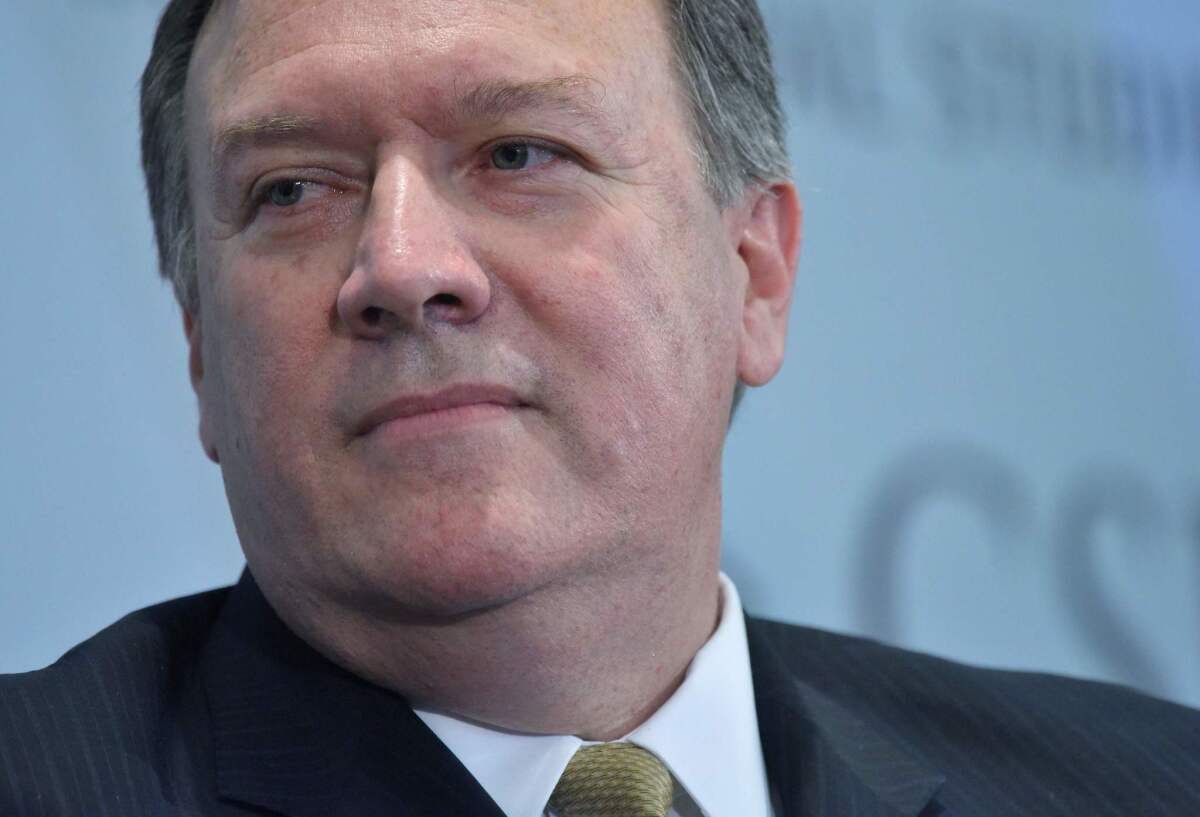
CIA Director Mike Pompeo denounced WikiLeaks founder Julian Assange as a “narcissist” who works in concert with Russia, relying on “the dirty work of others to make him famous.”
Pompeo’s speech on Thursday at a preeminent Washington think tank, the Center for Strategic and International Studies, was marked by harsh accusations against the group’s leaks of classified documents and other materials in what it touts as a campaign for transparency.
“It is time to call out WikiLeaks for what it really is: a non-state hostile intelligence service often abetted by state actors like Russia,” said Pompeo, a former Kansas congressman who was tapped by President Trump to lead the CIA.
Trump himself has a complicated history with WikiLeaks, claiming during the campaign to “love” the organization, which leaked stolen emails from the Democratic National Committee and others that were damaging to his opponent, Hillary Clinton.
Pompeo said the intelligence community had determined that Russia’s military intelligence service, the GRU, used WikiLeaks as a conduit to release data obtained by hacking the DNC and others. The FBI and intelligence committees in the House and Senate are looking into Russian cyber-interference in the U.S. election, and potential collusion by Trump campaign aides.
The first major WikiLeaks release of Pompeo’s tenure came last month, when the group made public a trove of documents that described CIA methods of hacking into phones, computers and even televisions connected to the Internet. In Thursday’s speech, his first public address since assuming his post, Pompeo attacked Assange in highly personal terms.
“Julian Assange and his kind are not the slightest bit interested in improving civil liberties or enhancing personal freedom,” he said, calling Assange a “coward hiding behind a screen.”
In his appearance, Pompeo also offered fresh details about the rationale behind Trump’s decision last week to launch a retaliatory cruise missile strike following a poison gas strike blamed on the forces of Syrian President Bashar Assad, which killed dozens of villagers in northern Syria.
The president, he recounted, wanted to be sure that intelligence officers were certain that Syria was responsible for the chemical attack, which used the banned nerve agent sarin.
“‘Pompeo, are you sure?’” he quoted Trump as asking him in the final moments before ordering the missile strike.
“I can assure you we were challenged by the president,” he added. The White House this week released a declassified report saying U.S. intelligence was confident Assad’s forces were to blame.
Assad, in an interview published Thursday by Agence France-Presse, denied using chemical weapons against his own people. His chief patron, Russia, also has insisted the Syrian government was not responsible for the poison gas attack.
Some conservatives chafe at Trump’s shifts on NATO, other campaign policies
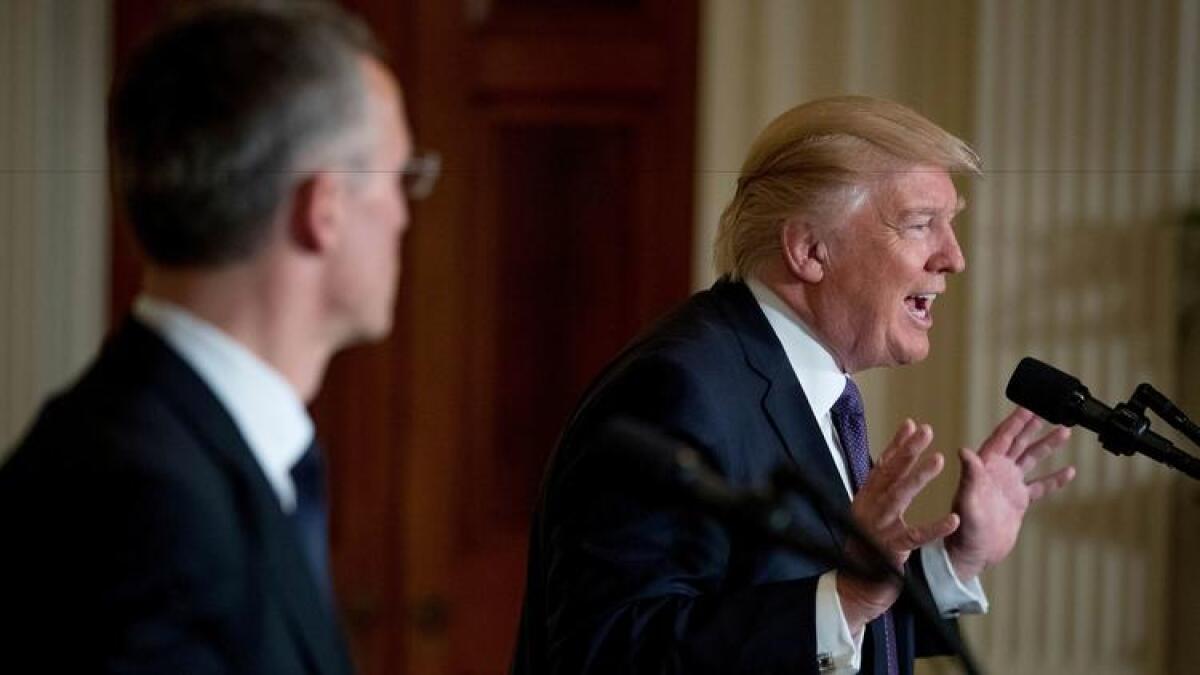
He’s called NATO obsolete, China a currency manipulator and hinted that he would not reappoint Janet Yellen as head of the Federal Reserve.
But that was 2016.
Now, in what amounts to an epic reversal, Trump has shifted on each of those campaign positions.
“I said it was obsolete. It’s no longer obsolete,” Trump said sternly on Wednesday at a joint news conference with NATO Secretary-General Jens Stoltenberg as he talked about the intergovernmental military alliance.
Last week, Trump faced strong pushback from the right for green-lighting a U.S. missile strike on a Syrian air base. (Some right-leaning bloggers and pundits thought Trump had abandoned his “America first” philosophy.)
With Trump’s latest reversals, some in conservative media are growing even more skeptical.
Here are some of today’s headlines:
Lassie, Come Home (Breitbart)
Last year, conservative columnist Ann Coulter tossed her support behind Trump mostly because of his hard-line immigration policies.
While Coulter still supports Trump, she has a message: Stay true to the populist base that helped you win the election.
In this piece, Coulter argues Trump is wavering from his “America first” motto by launching the Syrian strike.
“As awful as it was to see those dead children, Trump knew that America’s first duty is to our own children,” she writes about the attack, which Trump set in motion after charging that Syrian President Bashar Assad had used chemical weapons on his own people. “We leap in, thinking we’re helping the poor devils under the thumb of a dictator — and then the new tribe takes over and oppresses everyone else, usually much more brutally, while hating us even more than the old tribe did.”
She added: “We want the ‘president of America’ back — not ‘the president of the world.’”
Trump is resettling Syrian refugees at a much quicker pace than Obama (Daily Caller)
That’s not exactly a headline you want to read if you’re Trump.
After vowing relentlessly on the campaign trail to block Syrian refugees from entering the country, it seems they’re still arriving.
This piece observes that “since Trump was inaugurated, 1,401 Syrian refugees have been resettled,” citing State Department figures released this week.
“This is more than double the 625 Syrian refugees resettled under President Obama in the same time frame last year,” the Daily Caller says.
Trump has proposed halting all refugee admissions for 120 days, as well as all entry for immigrants from six majority-Muslim countries, including Syria, for 90 days. However, the travel rules remain stalled in federal courts.
The Bannon vs. Kushner brouhaha (American Spectator)
They’re two of Trump’s most senior aides and it appears there’s tension.
Stephen K. Bannon, architect of Trump’s populist/nationalistic message, and Jared Kushner, his son-in-law and close confidant, seem to be at odds. For several days now it has played out in the media, beginning last week when Bannon was booted off the National Security Council.
Both have formed warring factions within the White House and are vying for support from the president.
This piece by Melissa Mackenzie offers a bit of bullet-point analysis on the tiff.
“1. Kushner shouldn’t have the role (even if I like some of his views) because one should never hire someone who can’t be fired.
2. Bannon doesn’t need a seat at the National Security Council.”
In a conservative tilt, she adds: “Jared Kushner is a New York liberal Democrat. I do not count on good things happening if power tips irrevocably in his direction.”
Syrian president calls poison gas attack ‘fabrication’ to justify U.S. strike, according to report
Syrian President Bashar Assad reportedly called the poison gas attack that left dozens dead in Syria a “fabrication” by the United States and the West to justify a military strike.
In an interview in Damascus with the AFP news agency, Assad said it was “not clear” if the attack even happened. His claims are disputed by gruesome images and videos that spread widely on social media after the April 4 attack.
“You have a lot of fake videos now,” Assad told AFP. “We don’t know whether those dead children were killed in Khan Sheikhoun. Were they dead at all?”
In the interview, Assad repeatedly insisted that Syrian forces gave up their arsenal of chemical weapons in 2013, AFP reported.
“Our impression is that the West, mainly the United States, is hand-in-glove with the terrorists,” Assad said. “They fabricated the whole story in order to have a pretext for the attack.”
He said his forces were not obstructed by the U.S. strike.
“Our firepower, our ability to attack the terrorists hasn’t been affected by this strike,” he said.
The Trump administration dismissed the Assad interview and the claims he made.
“Sadly, it’s vintage Assad, throwing up false flags,” state department spokesman Mark Toner said Thursday. He reiterated the administration belief that there is “no doubt” that the chemical attack was the work of the Assad regime. “We believe it was a war crime,” he said.
U.S. officials said the April 4 chemical weapons attack was carried out by Assad’s forces. Following the attack, photos and videos on social media showed lifeless bodies of children next to surviving victims gasping for air, foam bubbling from their mouths.
Two days after the gas attack, President Trump ordered dozens of cruise missiles launched against an airfield in central Syria.
Air Force drops non-nuclear ‘mother of all bombs’ in Afghanistan

The U.S. military dropped the most powerful non-nuclear bomb in its arsenal on a cave and tunnel complex that it said was used by Islamic State fighters in eastern Afghanistan. This is from March 13, 2003.
The U.S. military dropped the most powerful non-nuclear bomb in its arsenal Thursday on a cave and tunnel complex that it said was used by Islamic State fighters in eastern Afghanistan, a stark reminder of a U.S. war now in its 16th grinding year.
The behemoth bomb, officially called the Massive Ordnance Air Blast, or MOAB, is also known as the “mother of all bombs.” It is 30 feet long, weighs nearly 11 tons and produces a devastating above-ground explosion that sends a mushroom cloud roiling high in the sky.
Originally developed for the 2003 invasion of Iraq, the MOAB has never been used in combat before.
Like the U.S. retaliatory missile strike in Syria last Friday, however, use of the monster munition in Afghanistan is more symbolic than tactical since it is unlikely to change the course of America’s longest war.
President Trump praised the attack as a “very, very successful mission.” He indicated that he had given the Pentagon a free hand to use the weapon as part of his vow to step up the war on Islamic State.
“We have given them total authorization and that’s what they’re doing and frankly that’s why they’ve been so successful lately,” he told reporters at the White House. “If you look at what’s happened over the last eight weeks and compare that really to what’s happened over the past eight years, you’ll see there’s a tremendous difference, tremendous difference.”
ALSO: U.S. military says misdirected airstrike in northern Syria killed 18 allied fighters
While the Pentagon’s formal rules of engagement have not changed, military commanders appear to have taken greater liberties in recent weeks — and made more mistakes.
A series of misdirected U.S. attacks in Iraq, Syria and Yemen have led to a noticeable increase in reported civilian casualties. Earlier Thursday, the U.S. military announced an air strike this week had accidentally killed 18 rebel fighters battling Islamic State in northern Syria in the worst friendly-fire incident of that conflict.
The military said the giant MOAB was dropped from the rear door of an MC-130 cargo plane at 7:32 p.m. Thursday as part of a U.S.-backed offensive on an Islamic State stronghold in Achin district in Nangarhar province.
The bomb initially falls with a parachute to slow its descent and give the aircraft time to get away safely. Then a GPS system guides the bomb to its target.
The munition detonates before it hits the ground, igniting a flammable fuel mist that supposedly obliterates everything in a 1,000 yard radius, sends a lethal shock wave more than a mile and a half away, and creates a mushroom cloud nearly five miles high.
“The strike was designed to minimize the risk to Afghan and U.S. forces conducting clearing operations in the area while maximizing the destruction” to the militants, the statement said.
Gen. John W. Nicholson, commander of U.S. forces in Afghanistan, said the militants used bunkers and tunnels to “thicken their defense.”
“This is the right munition to reduce these obstacles and maintain the momentum of our offensive,” Nicholson said.
White House spokesman Sean Spicer said the massive bomb targeted tunnels and caves that militants “used to move around freely, making it easier for them to target U.S. military advisers and Afghan forces in the area.”
He said U.S. commanders “took all precautions necessary to prevent civilian casualties and collateral damage as a result of the operation.”
Speaking by phone from Achin district, Sher Nabi, a commander with the Afghan Local Police, said the bomb landed about a half mile outside the town of Shogal, near the border with Pakistan.
Nabi, who commands a 60-man unit of the government militia, said Afghan security forces have carried out operations in the area for several days against suspected Islamic State supporters.
Nabi said that the bomb killed “many militants” and destroyed their weapons. There were no immediate reports of civilian casualties.
The air strike apparently was in the same area where Army Staff Sgt. Mark R. De Alencar, a 37-year-old Green Beret from Maryland, was killed on Saturday after coming under fire.
He was the first American service member killed in combat this year in Afghanistan, and the 1,833rd since the U.S.-led invasion in late 2001.
The GBU-43 bomb was developed in 2002 to “put pressure on then-Iraqi dictator Saddam Hussein to cease and desist or the United States would not only have the means but use them against the unpopular tyrant,” the Air Force said in 2005 news release.
ALSO: White House calls Russian denials on Syrian gas attack a ‘coverup’
It was tested at Eglin Air Force Base in Florida but was not used in Iraq. On March 11, 2003, a test produced a mushroom cloud visible from 20 miles away, the release said.
Another U.S. munition, officially called the Massive Ordinance Penetrator, or MOP, is designed to penetrate hardened bunkers. At 30,000 pounds, it is even heavier than the MOAB but carries less explosive power.
Special correspondent Sultan Faizy contributed from Kabul, Afghanistan.
Paul Manafort, Trump’s former campaign chairman, may belatedly register as a foreign agent
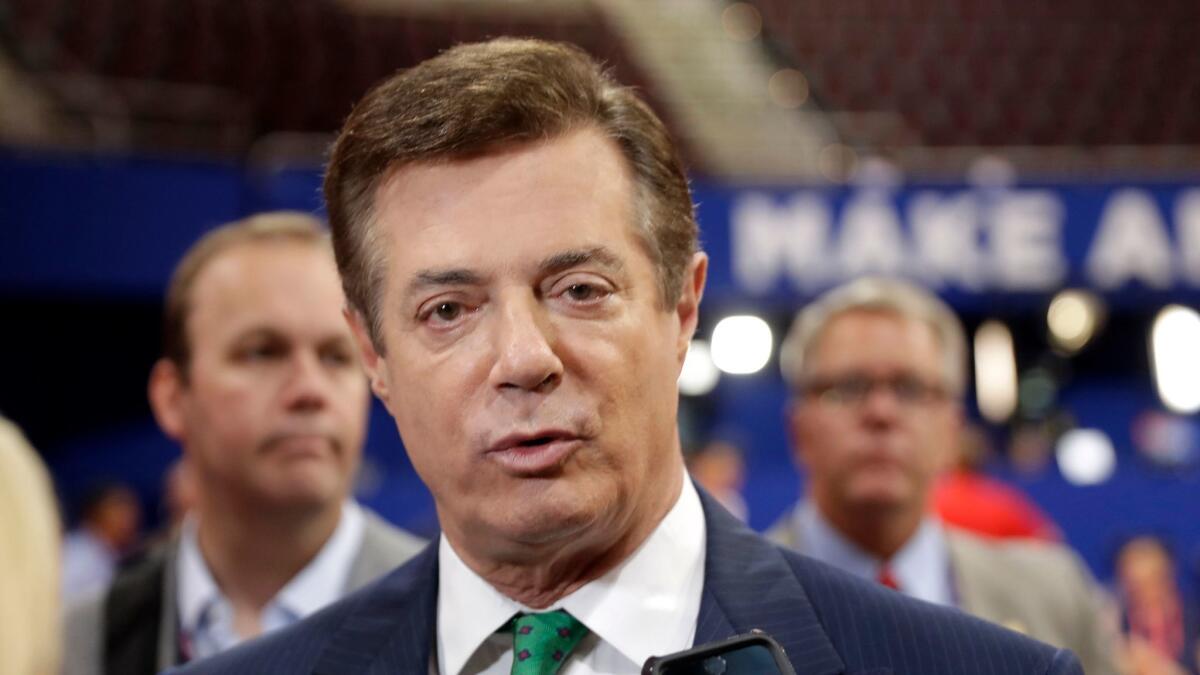
Paul Manafort, facing mounting questions about his work for pro-Russian interests in the Ukraine, may be belatedly registering as a foreign agent.
Manafort, a onetime campaign manager for Donald Trump, has been in talks with the government about registering under the Foreign Agents Registration Act for some of his past political work, according to a statement from his spokesman, Jason Maloni.
“Mr. Manafort received formal guidance recently from the authorities and he is taking appropriate steps in response to the guidance,” the statement said. “The work in question was widely known, concluded before Mr. Manafort began working with the Trump campaign and was not conducted on behalf of the Russian government.”
Maloni would not answer questions about exactly what work Manafort could disclose.
Manafort worked as a political consultant for ousted Ukraine President Viktor Yanukovych, a pro-Russia figure who was driven from office.
Manafort was forced to leave the Trump campaign after investigators in Kiev said they were investigating him for accepting more than $12.7 million in secret payments from Yanukovych’s Party of Regions.
Federal law says U.S. citizens who do work on behalf of other governments must register with the Justice Department, though prosecutors rarely file charges based solely on that law.
Manafort also faces inquiries under congressional and FBI investigations into whether anyone connected with the Trump campaign colluded with Russian government hackers who tried to sway the 2016 presidential election.
He would become the second close Trump advisor pressured to register as a foreign agent. Michael Flynn, Trump’s former national security advisor, submitted a registration in March acknowledging that work he did for a Turkish company was also representing the interests of the Turkish government.
Hawaii asks 9th Circuit Court for an 11-judge panel to review Trump’s travel ban
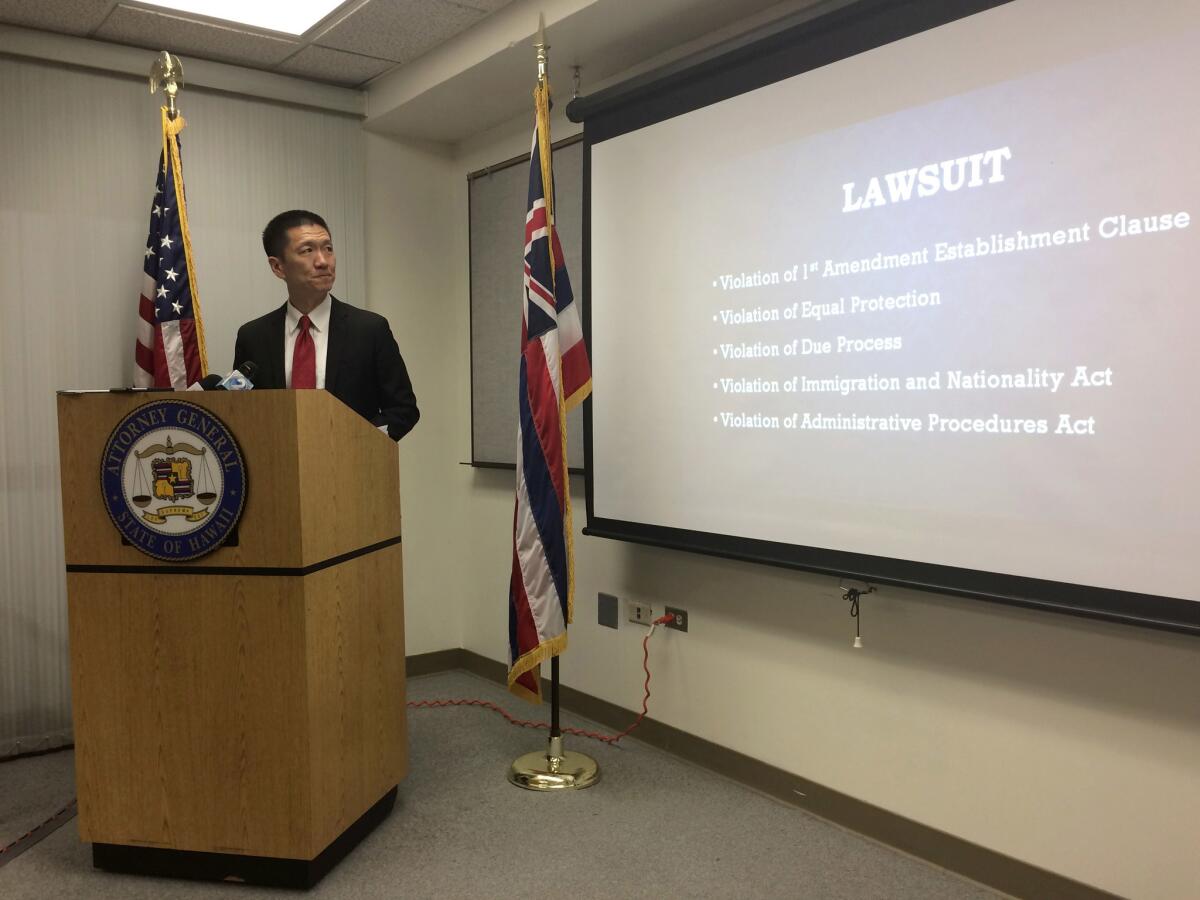
The state of Hawaii wants an 11-judge panel of the U.S. 9th Circuit Court of Appeals to consider whether to lift a hold on President Trump’s revised travel ban.
Normally, an appeal first goes to a three-judge panel. The losing party can then appeal the decision directly to the U.S. Supreme Court or to an “en banc” panel, which in the 9th Circuit includes the chief judge and 10 randomly selected judges.
Hawaii’s request followed a decision by the U.S. 4th Circuit Court of Appeals in Virginia to hear the Trump administration’s appeal of a similar hold “en banc” instead of before three judges.
The 4th Circuit plans to consider Trump’s order temporarily barring travelers from six predominantly Muslim nations on May 8.
The 9th Circuit has scheduled a hearing on the Hawaii case for May 15 in Seattle.
The appeals court is considering a ruling by a federal judge in Hawaii barring nationwide enforcement of Trump’s revised executive order, which also halted resettlement of refugees for 120 days. The judge found Trump’s order was motivated by prejudice against Muslims.
Trump initially issued a broader travel ban, but the 9th Circuit struck it down. The revised order now being considered does not affect holders of green cards or visas.
Amid doubts and recriminations, Putin meets with Tillerson

Ending waves of uncertainty, Russian President Vladimir Putin received Secretary of State Rex Tillerson at the Kremlin on Wednesday, despite deteriorated relations between their countries.
Tillerson was on a day-long mission to Moscow, the first Trump administration official to go to Russia, to press for an end of Russian support for Syrian President Bashar Assad.
But his chances looked bleak. Tillerson acknowledged “sharp” differences between Moscow and Washington as he headed into a meeting with his Russian counterpart, Foreign Minister Sergei Lavrov.
Lavrov, in turn, publicly scolded Tillerson for what he called the “illegitimate” attack that the U.S. launched against a Syrian airfield in retaliation for last week’s chemical bombardment of civilians in northwestern Syria, which U.S. officials blame on Assad and accuse Russia of allowing through “incompetence or complicity.”
It was left up in the air whether Putin would actually receive Tillerson. It is customary for U.S. secretaries of State to see Putin when the arrive in Moscow. But the Kremlin had refused to publicly commit to an appointment until the last minute.
The Putin meeting with Tillerson began shortly after 6 pm local time, the U.S. Embassy in Moscow said.
It appeared Tillerson had to delay his departure from Moscow until Thursday to accommodate the meeting, which comes as heated rhetoric has surged between the two governments.
Putin earlier said U.S.-Russian relations had badly deteriorated, despite Trump’s friendly words for Putin during the election campaign, and suspicions among U.S. officials that Moscow helped Trump get elected.
Russia accuses Washington of faking the Assad responsibility in last week’s chemical attack as a pretext, the way U.S. officials trumped up a case for going to war in Iraq to destroy non-existent weapons of mass destruction in 2003.
But U.S. officials say there is “no doubt” that the Assad regime was behind the attack, possibly with sarin gas, that killed dozens of people including many children. The only question, the officials say, is how much Russia knew in advance.
NATO ‘no longer obsolete,’ Trump says after meeting with alliance chief
President Trump embraced the North Atlantic Treaty Organization as a “bulwark of international peace and security” after a White House meeting Wednesday with the alliance’s chief, reversing a skeptical earlier stance.
“I said it was obsolete. It is no longer obsolete,” Trump said during a news conference with NATO Secretary General Jens Stoltenberg, adding that the alliance was increasing cooperation to stem terror attacks, among other steps.
Trump met with Stoltenberg in the Oval Office for an hour and discussed ways in which the NATO chief plans to get member countries to increase military spending to bolster the alliance.
During the campaign, Trump repeatedly said NATO countries were not shouldering their fair share of defense costs, leaving too much of the burden on the United States.
“The very strong message from President Trump has been very helpful” in getting member states to boost military spending, Stoltenberg said.
A few countries have recently agreed to move toward meeting the goal set in 2014 of spending 2% of gross domestic product on their militaries. That said, defense spending by NATO states had started to increase before Trump became president.
Trump’s outreach to NATO came as Secretary of State Rex Tillerson received a frosty reception in Moscow during a visit that initially was billed as a way to jump-start better relations between Russia and the U.S.
Tillerson’s trip has been dominated by U.S. criticism of Russia’s unwavering support for Syrian President Bashar Assad following a gruesome poison-gas attack in northern Syria last week blamed on Assad’s forces. That attack prompted a retaliatory U.S. missile strike.
In a further irritant to Moscow, Trump signed off Tuesday on Montenegro joining NATO next month, expanding the alliance’s footprint in the Balkans.
U.S. sought to monitor Trump advisor Carter Page last summer, report says
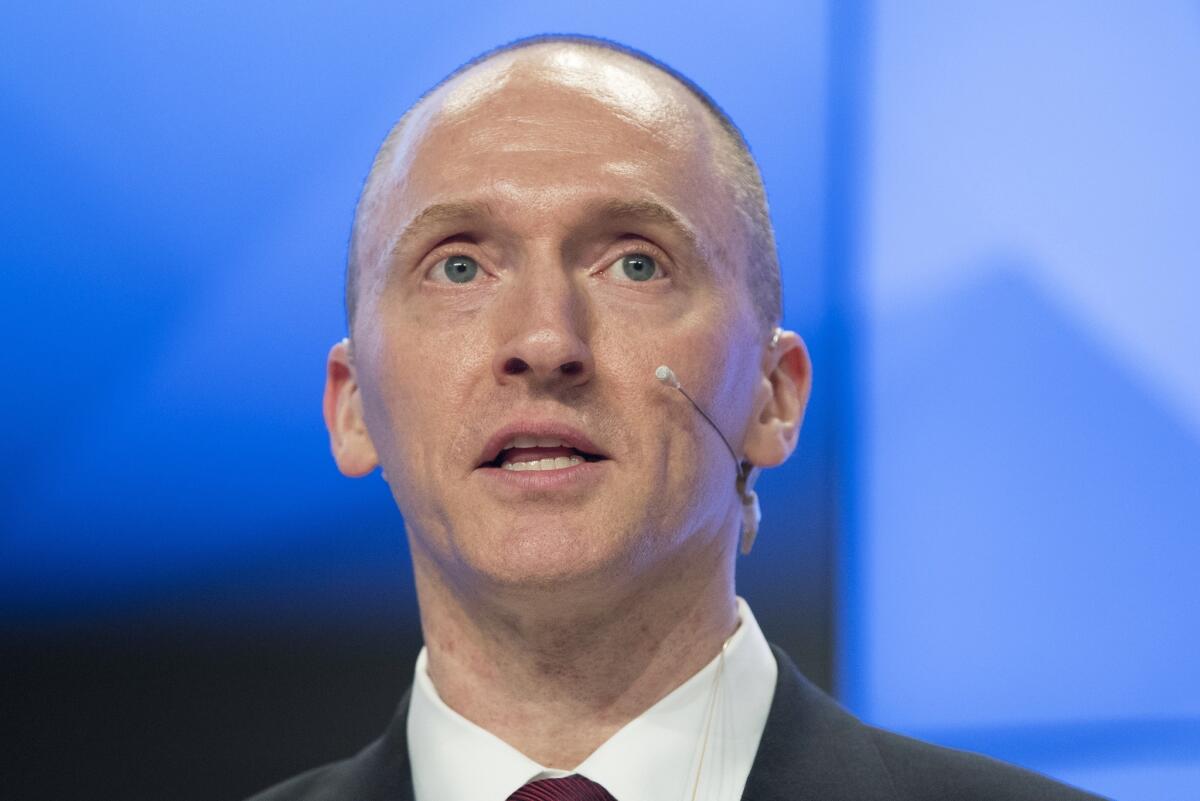
The FBI obtained a secret court order last summer to monitor the communications of Carter Page, an advisor to then-candidate Donald Trump, because the government had reason to believe Page was acting as a Russian agent, the Washington Post has reported.
Page is among the Trump associates under scrutiny as the FBI and congressional committees investigate whether his presidential campaign had ties to Russia’s meddling in the 2016 election. Trump has denied any wrongdoing, but the investigations could shadow his presidency for months or even years.
The Post, citing unnamed law enforcement and other U.S. officials, said Tuesday the government surveillance application laid out the basis for believing that Page had knowingly engaged in intelligence activities on Russia’s behalf. The newspaper said the application includes contacts Page had with a Russian intelligence operative in 2013.
Those contacts are detailed in a 2015 court filing involving a case against three men charged in connection with a Cold War-style Russian spying ring. According to the filing, Page provided one of the men documents about the energy industry. He was not charged as part of that case.
An FBI spokesman did not immediately return a call seeking comment from the Associated Press.
Page, who has denied having improper ties to Russia, told the Associated Press on Tuesday he was “happy” that the court order had been revealed and blamed the Obama administration for trying to “suppress dissidents who did not fully support their failed foreign policy.”
“It will be interesting to see what comes out when the unjustified basis for those FISA requests are more fully disclosed over time,” said Page, referring to the Foreign Intelligence Surveillance Act.
The FISA court and its orders are highly secretive. Judges grant permission for surveillance if they agree there’s probable cause that the target is an agent of a foreign power. Though the standard is a high bar to meet, applications are hardly ever denied.
Trump downplays Bannon’s role: ‘I like Steve, but ...’
President Trump says his chief strategist, Stephen K. Bannon, joined his campaign “very late,” downplaying the notion that Bannon is an influential member of his team.
In an interview with the New York Post, Trump was asked about infighting among top members of his administration in which Bannon is said to be a central figure.
Trump said, “I like Steve, but you have to remember he was not involved in my campaign until very late.”
Trump said he had already jumped major hurdles in the campaign by that time, beating “all the senators and all the governors” before he met Bannon.
The president added, “I’m my own strategist, and it wasn’t like I was going to change strategies because I was facing crooked Hillary,” referring to general election opponent Hillary Clinton.
Putin lashes out at U.S. as Tillerson mulls ‘sharp’ differences with Russian counterpart
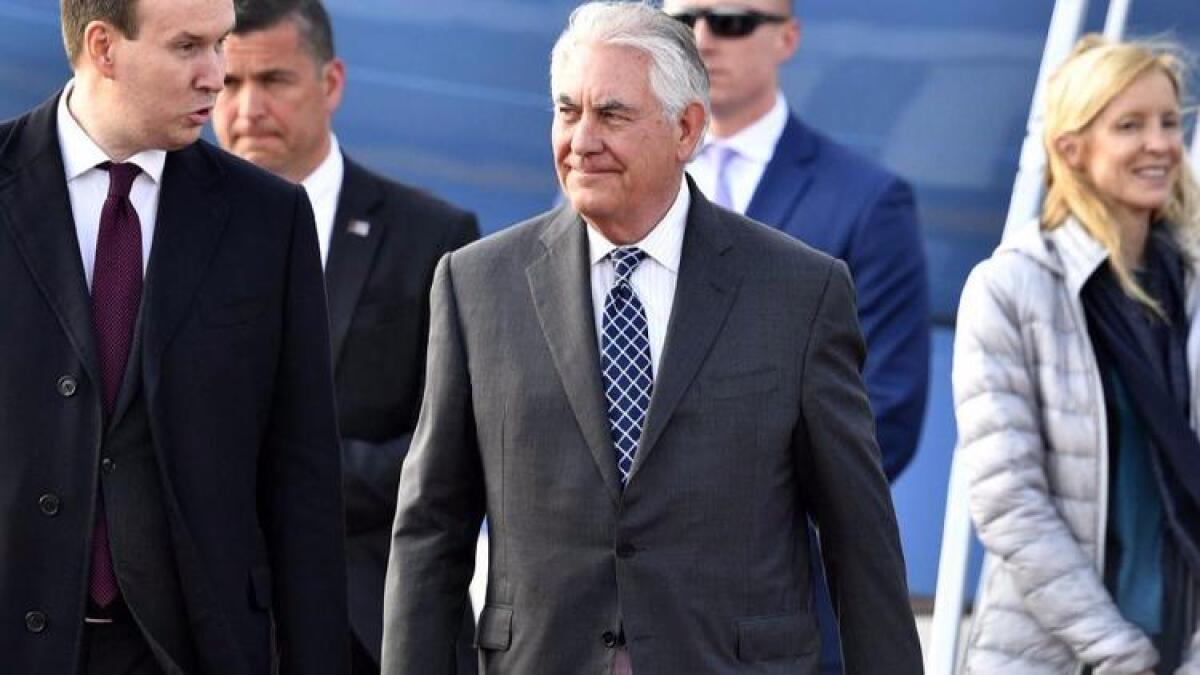
As top diplomats from Russia and the United States held a testy meeting Wednesday, Russian President Vladimir Putin lashed out at the Trump administration, saying relations between Washington and Moscow had deteriorated.
“You can say that the level of trust on a working level, especially on the military side, has not improved but most likely worsened,” Putin said in a television interview, according to a transcript released by the Kremlin.
His comments reflected the palpable tensions infusing Secretary of State Rex Tillerson’s trip to Moscow, the first to Russia by a Trump administration official.
As he stepped into a long session with Russian Foreign Minister Sergei Lavrov, Tillerson said he was trying to confront “areas of sharp difference” with Moscow.
Lavrov, in turn, accused the United States of conducting “an illegitimate attack” against Syria when it fired cruise missiles at a Syrian airfield in retaliation for last week’s deadly chemical attack on civilians, which U.S. officials blame on President Bashar Assad.
Lavrov said his government’s priority was to prevent the “relapse of such actions.”
Lavrov and Tillerson shook hands as they met but did not smile and clearly appeared unhappy with one another.
Russia and the United States disagree over Assad’s fate. The Syrian regime is Moscow’s chief ally in the Middle East.
Tillerson said he wanted “a very open, candid and frank exchange” with Lavrov.
“Our meeting today comes at an important moment in our relationship so that we can further clarify areas of common objectives, areas of common interest -- even where our tactical approaches may be different -- and further clarify areas of sharp difference so that we can better understand why these differences exist,” Tillerson said.
Lavrov said Moscow wants to understand the Trump’s administration’s “real intentions.”
It remained unknown whether Putin would receive Tillerson. It is customary for U.S. secretaries of State to meet with Putin when in Moscow, and Tillerson and Putin are friends from the American’s days as chief executive of ExxonMobil. Putin bestowed one of Russia’s highest honors, the Order of Friendship, on Tillerson just four years ago.
But already bad relations between Moscow and Washington have been further strained by the Syria issue, despite Trump’s campaign pledges to be more friendly with Russia -- and the belief in the U.S. intelligence community that Moscow helped Trump get elected.
Putin, in the television interview, was no kinder to the United States’ NATO allies for their unanimous support for the U.S. retaliatory strike against Assad’s forces.
“Everyone is nodding, like bobbing-head dolls, without analyzing anything that is happening,” Putin said. “Where is the proof the Syrian military used chemical weapons? None. And there is a violation of international law. That’s an obvious fact.”
Trump had studiously avoided criticizing Putin, but finally addressed the matter in an interview with Fox Business Network.
“Frankly, Putin is backing a person that’s truly an evil person,” Trump said, referring to Assad. “I think it’s very bad for Russia. I think it’s very bad for mankind.”
Records show ex-Trump campaign chief Paul Manafort’s firm received payout from Ukraine ledger under investgation
Last August, a handwritten ledger surfaced in Ukraine with dollar amounts and dates next to the name of Paul Manafort, who was then chairman of Donald Trump’s presidential campaign.
Ukrainian investigators called it evidence of off-the-books payments from a pro-Russian political party — and part of a larger pattern of corruption under the country’s former president. Manafort, who worked for the party as an international political consultant, has publicly questioned the ledger’s authenticity.
Now, financial records newly obtained by the Associated Press confirm that at least $1.2 million in payments listed in the ledger next to Manafort’s name were actually received by his consulting firm in the United States. They include payments in 2007 and 2009, providing the first evidence that Manafort’s firm received at least some money listed in the so-called Black Ledger.
The two payments came years before Manafort became involved in Trump’s campaign, but for the first time bolster the credibility of the ledger. They also put the ledger in a new light, as federal prosecutors in the U.S. have been investigating Manafort’s work in Eastern Europe as part of a larger anti-corruption probe.
Separately, Manafort is also under scrutiny as part of congressional and FBI investigations into possible contacts between Trump associates and Russia’s government under President Vladimir Putin during the 2016 U.S. presidential campaign. The payments detailed in the ledger and confirmed by the documents obtained by the AP are unrelated to the 2016 presidential campaign and came years before Manafort worked as Trump’s unpaid campaign chairman.
In a statement to the AP, Manafort did not deny that his firm received the money but said “any wire transactions received by my company are legitimate payments for political consulting work that was provided. I invoiced my clients and they paid via wire transfer, which I received through a U.S. bank.”
Manafort noted that he agreed to be paid according to his “clients’ preferred financial institutions and instructions.”
Previously, Manafort and his spokesman, Jason Maloni, have maintained that the ledger was fabricated and said no public evidence existed that Manafort or others received payments recorded in it.
The AP, however, identified in the records two payments received by Manafort that aligned with the ledger: one for $750,000 that a Ukrainian lawmaker said last month was part of a money-laundering effort that should be investigated by U.S. authorities. The other was $455,249 and also matched a ledger entry.
The newly obtained records also expand the global scope of Manafort’s financial activities related to his Ukrainian political consulting, because both payments came from companies once registered in the Central American country of Belize. Last month, the AP reported that the U.S. government has examined Manafort’s financial transactions in the Mediterranean country of Cyprus as part of its probe.
Federal prosecutors have been looking into Manafort’s work for years as part of an effort to recover Ukrainian assets stolen after the 2014 ouster of Ukrainian President Viktor Yanukovich, who fled to Russia. No charges have been filed as part of the investigation.
Manafort, a longtime Republican political operative, led the presidential campaign from March until August last year when Trump asked him to resign. The resignation came after a tumultuous week in which the New York Times revealed that Manafort’s name appeared in the Ukraine ledger — although the newspaper said at the time that officials were unsure whether Manafort actually received the money — and after the AP separately reported that he had orchestrated a covert Washington lobbying operation until 2014 on behalf of Ukraine’s pro-Russian Party of Regions.
Officials with the Ukrainian National Anti-Corruption Bureau, which is investigating corruption under Yanukovich, have said they believe the ledger is genuine. But they have previously noted that they have no way of knowing whether Manafort received the money listed next to his name. The bureau said it is not investigating Manafort because he is not a Ukrainian citizen.
Still, Manafort’s work continues to draw attention in Ukrainian politics.
Last month, Ukrainian lawmaker Serhiy Leshchenko revealed an invoice bearing the letterhead of Manafort’s namesake company, Davis Manafort, that Leshchenko said was crafted to conceal a payment to Manafort as a purchase of 501 computers.
The AP provided to Manafort the amounts of the payments, dates and number of the bank account where they were received. Manafort told the AP that he was unable to review his own banking records showing receipt of the payments because his bank destroyed the records after a standard seven-year retention period. He said Tuesday the “computer sales contract is a fraud.”
“The signature is not mine, and I didn’t sell computers,” he said in a statement. “What is clear, however, is individuals with political motivations are taking disparate pieces of information and distorting their significance through a campaign of smear and innuendo.”
Leshchenko said last month the 2009 invoice was one of about 50 pages of documents, including private paperwork and copies of employee-issued debit cards, that were found in Manafort’s former Kiev office by a new tenant.
The amount of the invoice — $750,000— and the payment date of Oct. 14, 2009, matches one entry on the ledger indicating payments to Manafort from the Party of Regions. The invoice was addressed to Neocom Systems Ltd., a company formerly registered in Belize, and included the account and routing numbers and postal address for Manafort’s account at a branch of Wachovia National Bank in Alexandria, Va.
The AP had previously been unable to independently verify the $750,000 payment went to a Manafort company, but the newly obtained financial records reflect Manafort’s receipt of that payment. The records show that Davis Manafort received the amount from Neocom Systems the day after the date of the invoice.
Leshchenko contended to AP that Yanukovich, as Ukraine’s leader, paid Manafort money that came from his government’s budget and was “stolen from Ukrainian citizens.” He said: “Money received by Manafort has to be returned to the Ukrainian people.”
Leshchenko said U.S. authorities should investigate what he described as corrupt deals between Manafort and Yanukovich. “It’s about a U.S. citizen and money was transferred to a U.S. bank account,” he said.
A $455,249 payment in November 2007 also matches the amount in the ledger. It came from Graten Alliance Ltd., a company that had also been registered in Belize. It is now inactive.
The AP reported last month that federal prosecutors are looking into Manafort’s financial transactions in Cyprus, an island nation once known as a favored locale for money laundering.
Among those transactions was a $1-million payment in October 2009 routed through the Bank of Cyprus. The money was deposited into an account controlled by a Manafort-linked company, then left the account on the same day, broken into two disbursements of $500,000, according to documents obtained by the AP.
The records of Manafort’s Cypriot transactions were requested by the U.S. Treasury Department Financial Crimes Enforcement Network, which works internationally with agencies to track money laundering and the movement of illicit funds around the globe.
Dozens of Ukrainian political figures mentioned in the Black Ledger are under investigation in Ukraine. The anti-corruption bureau, which has been looking into the Black Ledger, publicly confirmed the authenticity of the signature of one top official mentioned there. In December, the bureau accused Mykhaylo Okhendovsky of receiving more than $160,000 from Party of Regions officials in 2012, when he was Ukraine’s main election official.
The bureau said it would identify more suspects in the coming months.
Melania Trump wins apology and damages from Daily Mail publisher
First Lady Melania Trump has accepted an apology and damages from the publisher of the Daily Mail newspaper for reporting rumors about her time as a model, the two parties in the lawsuit said Wednesday.
Trump sued the Daily Mail in Britain and Mail Online in the United States over an August 2016 article, which ran under the headline “Racy photos and troubling questions about his wife’s past that could derail Trump.”
The first lady’s attorneys argued that the report damaged her ability to build businesses based on her status as a well-known figure and “successful businesswoman.”
Xi warns Trump to embrace a ‘peaceful solution’ on North Korea as tensions build
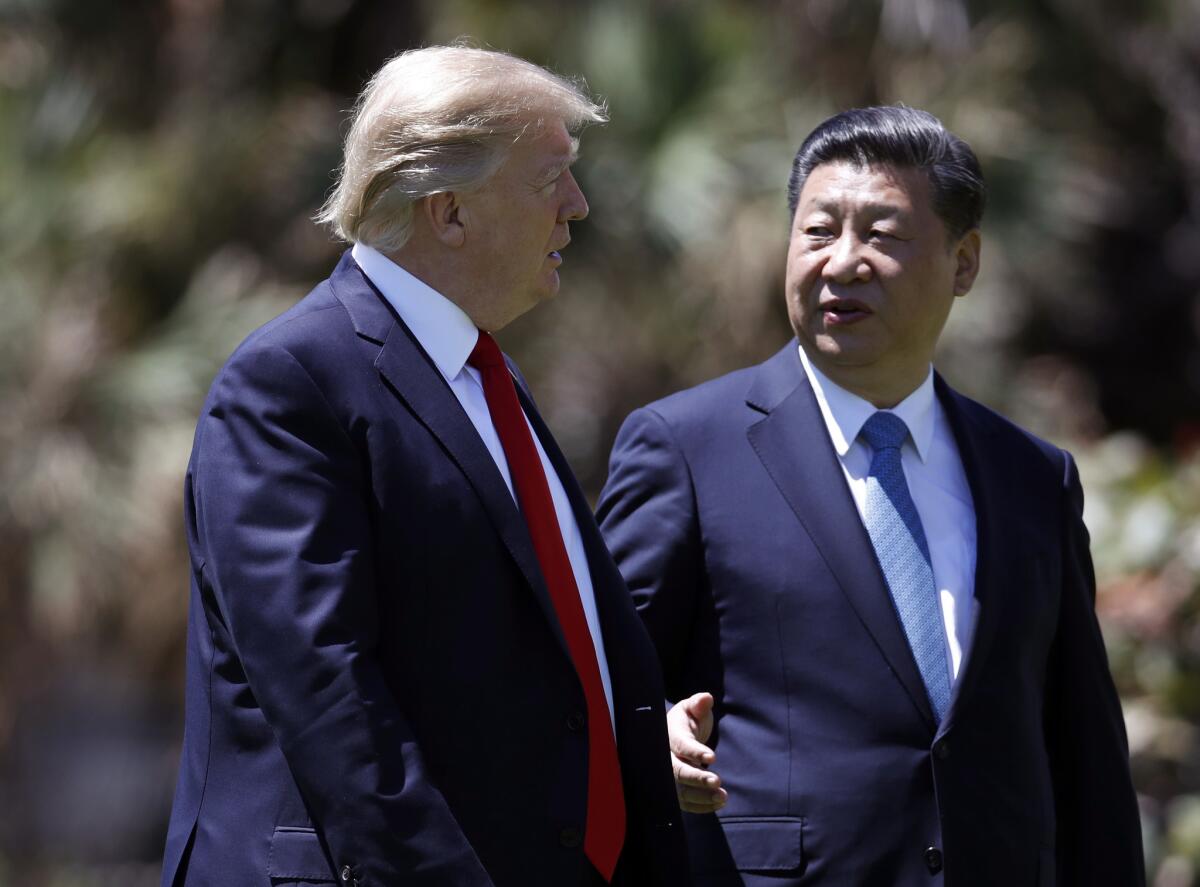
Chinese President Xi Jinping pressed President Trump on Wednesday to avoid military confrontation with North Korea, in a phone call that came after the U.S. deployed warships to the region.
Xi told Trump that China wants a denuclearized North Korea, but urged a “peaceful solution,” according to Chinese state television. He also expressed a willingness to coordinate with the U.S.
China’s Foreign Ministry said Trump initiated the call.
The two leaders discussed North Korea face-to-face last week in Florida, and China has long pushed for talks rather than military action on its doorstep. But the latest conversation followed a series of Trump tweets on Tuesday that suggested he might bargain aspects of his trade agenda for China’s help pressuring Pyongyang.
“I explained to the President of China that a trade deal with the U.S. will be far better for them if they solve the North Korea problem!” Trump said in a tweet Tuesday morning.
He then accused North Korea of “looking for trouble” and said America would handle the threat itself if China decides not to help. He signed the tweet “U.S.A.”
Trump also told Fox News that the U.S. is “sending an armada, very powerful” to North Korea. The Pentagon redirected a Navy strike group towards the Korean Peninsula this weekend, amid fears Pyongyang is preparing for a ballistic missile launch or its sixth nuclear test.
North Korea will hold a weekend celebration for the 105th birthday of Kim II Sung, the country’s first leader, and analysts say an anniversary would serve as an ideal symbolic time to show its might.
China is the rogue nation’s biggest benefactor. Chinese leaders worry that a North Korean regime collapse would lead to a refugee crisis on the border and eliminate the buffer between a democratic South Korea and its allies.
But officials are showing increasing irritation with their neighbor.
The Global Times, a Communist Party-run newspaper, warned North Korea on Wednesday to halt its nuclear ambitions.
“China, too can no longer stand the continuous escalation of the North Korean nuclear issue at its doorstep,” it said. “Instead of accepting a situation that continues to worsen, putting an end to this is more in line with the wish of the Chinese public.”
The paper, which does not represent government policy but often reflects the thinking of Chinese officials, said Beijing would support limiting oil exports if Pyongyang conducted a nuclear test.
Some viewed the conversation as a signal of China’s more proactive approach, and Trump’s willingness to listen.
“The call basically rules out the possibility of a military attack by the U.S.,” said Dingding Chen, an international relations professor at Jinan University in Guangzhou.
Chinese Foreign Ministry spokesman Lu Kang said the talk was part of a regular dialogue the presidents agreed to in Florida. The two leaders also discussed the recent chemical weapons attack in Syria, which Xi called “unacceptable.” He said he hopes the United Nations Security Council can speak on the issue “with one voice.”
The U.S. fired missiles on a Syrian airbase last week in response to the attack, just as Trump and Xi sat down for dinner at the president’s resort.
This post was updated at 3:24 a.m.
Republicans win a special House election in Kansas after an embarrassing red-state scare
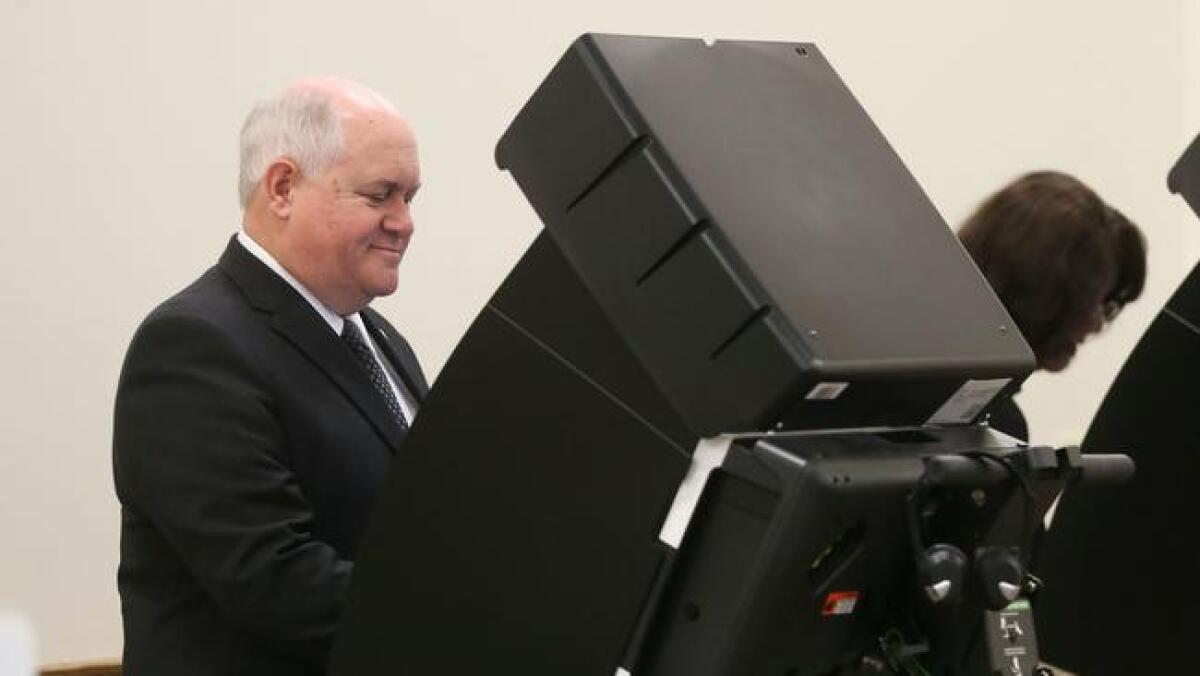
Republicans survived an embarrassing scare and narrowly held on to a Kansas congressional seat Tuesday in a special election that served as a surprising red-state referendum on President Trump.
The single-digit victory for state Treasurer Ron Estes marked a far closer race than Democrats have pulled off in recent years, giving the party bragging rights as it looks to a series of special House elections this year.
Estes trailed in early tallies but then began to build a lead over Democratic civil rights attorney James Thompson, who had sought to translate anti-Trump anger on display at rallies and town halls across the country into a victory in one of the nation’s unlikeliest places.
The 4th District race in the Wichita area was the first of a series of elections spurred by vacancies created when Republican House incumbents moved to the Trump Cabinet. The Kansas seat was held by Mike Pompeo, who resigned in January to take the job of CIA director.
Pentagon chief warns Syria against future use of chemical weapons
Defense Secretary James N. Mattis made clear Tuesday that last week’s U.S. cruise missile strike on a Syrian airfield did not mark the start of a new military campaign, but warned that any future use of chemical weapons by Syrian President Bashar Assad could draw fresh U.S. retaliation.
“If they use chemical weapons, they are going to pay a very, very stiff price,” he told reporters at the Pentagon.
Mattis said he personally reviewed the intelligence and concluded that there was “no doubt” that the Assad government was responsible for the April 4 chemical attack on the rebel-held Syrian town of Khan Sheikhoun. But he could not say whether the Russian government played a role in the incident.
“It was very clear the Assad regime planned it, orchestrated it and executed it,” he said. “Beyond that, we can’t say right now.”
Earlier in the day, White House officials told reporters that Russia was engaged in a “disinformation campaign” over Syria’s chemical attack, but stopped short of saying that the Kremlin knew of it in advance. Russian military forces were deployed at the Shayrat airfield in western Syria, from which the chemical attack was launched.
Two days after the attack, U.S. warships rained dozens of Tomahawk cruise missiles on the base.
“This military action demonstrates the United States will not passively stand by while Assad blithely ignores international law and employs chemical weapons he had declared destroyed,” Mattis said, appearing alongside Army Gen. Joseph Votel, the top U.S. commander in the Middle East.
U.S. military radar and surveillance systems picked up a Syrian Su-22 attack aircraft’s launch from Shayrat before dawn on April 4, officials say. It then flew 75 miles to Khan Sheikoun, according to several U.S. officials who weren’t authorized to speak publicly on the intelligence.
At 6:55 a.m., the U.S. military saw the jet drop a bomb over the town before returning to Shayrat. Within minutes, images began appearing on social media depicting victims, many of them children, shivering and gasping for air.
The closest hospital, located several miles away, quickly filled with patients as trucks arrived loaded with victims. U.S. systems detected a small Russian drone flying above the hospital about five hours later. Shortly thereafter, a Russian-made attack jet dropped a bomb on the hospital.
The Pentagon has launched an investigation into whether that aircraft belonged to Russian or Syrian forces.
The Russian military, which has helicopters and troops at Sharyrat, was notified ahead of time that the cruise missile strikes were coming. The U.S. missiles hit various targets at the base, destroying 23 Syrian aircraft, hardened aircraft shelters, fuel storage and ammunition supply bunkers and advanced Russian-made radars and surface-to-air missile systems, officials said.
Russian aircraft and facilities, located on the north end of the base, were deliberately not targeted, Capt. Jeff Davis, a Pentagon spokesman, has said.
The Pentagon also avoided hitting a suspected chemical facility at Shayrat, officials said, because they didn’t want to risk dispersing toxic agents. However, intelligence officers acknowledged that they did not know whether nerve agents were stored there, or in what amounts.
U.S. officials say it is hard to believe that the Russians did not know about the presence of chemical stores because they work alongside Syrian forces at the airfield.
White House Press Secretary Sean Spicer is under fire for saying Hitler didn’t use chemical weapons

White House Press Secretary Sean Spicer appeared to forget about the Holocaust when he compared Adolph Hitler with Syrian President Bashar Assad, saying Hitler “didn’t even sink to using chemical weapons” during a cringe-worthy televised briefing wi
White House Press Secretary Sean Spicer appeared to forget about the Holocaust when comparing Hitler with Syrian President Bashar Assad during a cringe-worthy televised briefing with reporters on Tuesday.
“You had someone as despicable as Hitler who didn’t even sink to using chemical weapons,” Spicer said, in an attempt to argue that Russia and other countries that are not standing up to Assad are on the wrong side of history.
Spicer’s rendering ignored the horror of the Holocaust, where gas chambers were used as part of a genocide campaign that killed 6 million Jews as well as millions of others including Gypsies and gay people.
You had someone as despicable as Hitler who didn’t even sink to using chemical weapons.
— Sean Spicer
Many expressed shock on Twitter as Spicer went on to field other questions. Spicer was given a chance to recover in a follow-up question, but instead evoked more gasps.
“He was not using gas on his own people the same way,” Spicer said. He referred to the Syria bomb victims as “innocent.”
He then added awkwardly that he was aware of “Holocaust centers” and that he meant that Hitler did not use gas in the middle of towns.
The suggestion that Holocaust victims were not Hilter’s “own people” — intended or not — hit a sore nerve for Jews and other victims who considered themselves loyal subjects of Germany.
There is also a painful and long history of Holocaust deniers who claim, among other things, that gas chambers were not used to kill Jews.
Spicer’s comments came during Passover, in which Jews celebrate freedom from oppression.
After the press briefing ended, Spicer released another clarification in written form:
“In no way was I trying to lessen the horrendous nature of the Holocaust,” he said. “I was trying to draw a distinction of the tactic of using airplanes to drop chemical weapons on population centers. Any attack on innocent people is reprehensible and inexcusable.”
White House calls Russian denials on Syrian gas attack a ‘coverup’
The White House on Tuesday accused Russia of a “coverup” of Syria’s chemical attack on its own citizens, but stopped short of saying that the Kremlin knew in advance of last Tuesday’s poison-gas attack that killed dozens of Syrian villagers.
Russia has consistently denied that the forces of Syrian President Bashar Assad dropped a bomb containing sarin, a banned nerve agent. President Trump responded on Thursday by approving a missile strike on a Syrian air base used to launch the chemical attack.
A declassified intelligence assessment released by the White House asserts that Syria and Russia “have sought to confuse the world community about who is responsible for using chemical weapons against the Syrian people in this and earlier attacks.”
“The coverup is the disinformation,” said a White House official who briefed reporters on condition of anonymity to discuss details of the report. “The Russian narrative is false.”
Russian military advisors were at the Shayrat air base when a Syrian warplane carrying the chemical weapon took off early on April 4, the White House official said, raising questions about whether the Russians knew in advance about the attack.
U.S. intelligence officials do not agree on whether the Kremlin knew about the gas attack beforehand, the official said.
“There is not a consensus on our side” about Russian foreknowledge, according to the official.
But the presence of Russian personnel at Shayrat prompted U.S. intelligence analysts to consider the possibility that Moscow may have known about hidden stores of the nerve agent sarin and knew that the toxic substance was being prepared for use in an attack.
Russia’s repeated denials that Syrian forces launched the attack have driven a deeper wedge between the Trump administration and Russian officials as Secretary of State Rex Tillerson is visiting Moscow for his first official visit.
That trip that was initially billed as following through on Trump’s longstanding campaign promise to try to build a bridge between Washington and Moscow after years of chilly relations.
On Tuesday, Russian President Vladimir Putin told reporters in Moscow that accusations leveled against Syria’s government were a “provocation” and that the gas attack should be investigated by the United Nations.
The White House wants Russia, Syria’s main patron, to “stop the disinformation campaign” and work to prevent Syrian forces from launching additional chemical attacks, a second White House official said, adding that the Kremlin has launched “a very clear campaign to obscure the nature of the attacks.”
Fighters of Islamic State and other terrorist or rebel groups in Syria do not possess sarin, U.S. intelligence officials have asserted.
U.S intelligence officials have assessed that opposition forces were close to taking a strategic airfield near the west-central Syrian city of Hama and had come within striking range of neighborhoods on the outskirts of the city, gains that could have been a factor in the Syrian decision to launch the gas attack on Khan Sheikhoun, 22 miles to the north.
“There was a calculus that the regime and perhaps their Russian advisors” made when using chemical weapons, a White House official said, noting that Assad’s forces were “spread quite thin.”
Here is the intelligence summary released by the White House:
GOP and Trump scrambling to hold House seat in heavily Republican Kansas district

When President Trump plucked conservative members of Congress to fill his Cabinet, it set off a slew of special elections -- starting with Tuesday’s contest in Kansas.
These were supposed to be no-brainer affairs.
Trump easily won the Wichita-area district held by Mike Pompeo, now the CIA director, since 2011. The opening offered an easy elevation for the party-picked candidate, Ron Estes, the state treasurer.
But that’s not what happened. Democratic unrest over Trump made this race -- and the others coming -- a referendum on the new administration.
Democrats have rallied around the underdog, James Thompson, putting him in striking distance.
The political newcomer’s resume made him a candidate to watch: He was homeless as a child, joined the Army and later went to college, becoming a civil rights attorney. He and his wife have one daughter, Liberty.
A Republican loss so early in the special-election season -- with an even closer race shaping up next week in Georgia’s 6th District in the Atlanta suburbs -- has put the party on high alert.
Trump tweeted support of Estes on Tuesday morning and recorded a robocall, according to the Wichita Eagle.
“Ron Estes is running TODAY for Congress in the Great State of Kansas. A wonderful guy, I need his help on Healthcare & Tax Cuts (Reform),” Trump tweeted.
Top Republican lawmakers, including Sens. Ted Cruz of Texas and Pat Roberts of Kansas, offered their services.
Losing one seat to Democrats wouldn’t necessarily be devastating for House Republicans. They are in no immediate danger of losing their robust majority.
But a win would carry big symbolism for Democrats, who continue to struggle to find their political footing after the 2016 loss to Trump.
And it could set the stage for the summer as campaigns start forming for the 2018 midterm elections, when Democrats will try to win back seats from the GOP majority in the House and Senate.
In what is sure to be a low-turnout spring vote, the nonpartisan Cook Political Report shifted its assessment of the GOP’s hold on the Kansas seat from “likely Republican” to “lean Republican.”
“Even a single-digit finish in a seat like KS-04 ... would portend big trouble for Republicans in next week’s special primary election in GA-06,” according to the Cook analysis. “There is a real chance Democrat Jon Ossoff, who is dramatically outspending the rest of the field while the main GOP contenders turn on each other, could hit 50 percent on April 18 and avoid a runoff. As such, we are moving GA-06 to Toss Up.”
Trump signs off on Montenegro’s upcoming entry into NATO

President Trump has signed off on Montenegro’s upcoming accession into NATO, helping pave the way for the military alliance’s expansion in the Balkans.
The White House said in a statement Tuesday that Trump looks forward to welcoming Montenegro as the 29th member of the NATO alliance at next month’s meeting in Brussels.
The Senate in March voted overwhelmingly to ratify the tiny Balkan nation’s entry into the alliance.
Russia strongly opposes the expansion of the Western military alliance in a region it considers part of its strategic sphere of interest.
Trump’s move comes ahead of his White House meeting on Wednesday with NATO Secretary-General Jens Stoltenberg.
Trump tweets that North Korea is ‘looking for trouble’ and signs the message ‘U.S.A.’
President Donald Trump escalated his rhetoric against North Korea on Tuesday, writing on Twitter that the country “is looking for trouble” and encouraging North Korea’s neighbor China to “solve the problem.”
Trump signed the message: “U.S.A.”
In a second message, Trump said he told China’s President Xi Jinping during his visit to Florida last week that China would get a better trade deal with the U.S. if Xi helped reign in North Korea’s missile program, apparently linking China’s cooperation on security issues with its economic actions.
Tensions with North Korea have ratcheted up following a series of American and South Korean military exercises in the region and a U.S. decision to divert an aircraft carrier and other warships from a planned visit to Australia and toward the Korean peninsula in recent days.
Trump appeared to be responding to a statement from a North Korean spokesman threatening “catastrophic consequences” for the U.S. maneuvers, adding that the isolated country is “ready” for “any mode” of war.
“We will hold the U.S. wholly accountable for the catastrophic consequences to be entailed by its outrageous actions,” a North Korean foreign ministry spokesman said in a report published by the state-run Korean Central News Agency. North Korea “is ready to react to any mode of war desired by the U.S.,” the statement said.
The U.S. has long wanted China to intervene more forcefully with North Korea and use its leverage over the North Korean economy to force Pyongyang to give up its nuclear and ballistic missile programs. Chinese officials are afraid of sparking an economic collapse in North Korea that could send thousands of refugees into China.
Trump has said his administration is prepared to act alone if China is unable to restrain North Korea’s missile program.
“If China decides to help, that would be great,” Trump wrote Tuesday. “If not, we will solve the problem without them!”
Experts believe that North Korea may be preparing to conduct its sixth nuclear test on Saturday, to coincide with the birthday of its founder, Kim Il-sung.
Tillerson en route to Moscow with more blame on Russia for Syria attacks
Secretary of State Rex Tillerson, opening an emergency meeting with key allies on the crisis in Syria and hours ahead of his arrival in Moscow, said Tuesday that Russia bore responsibility for chemical attacks by Syrian President Bashar Assad on civilians in that war-ravaged country.
Tillerson was speaking at the end of a two-day summit of foreign ministers from the Group of Seven nations in Lucca, Italy. They were joined Tuesday by representatives of several Arab countries who oppose Assad’s regime.
“Stockpiles and continued use demonstrate that Russia has failed in its responsibility to deliver on its 2013 commitment” to remove chemical weapons from Syria under a U.N.-brokered deal, Tillerson said.
“It is unclear whether Russia failed to take this obligation seriously or Russia has been simply incompetent in its ability to deliver on its end of that agreement,” he said. “This distinction doesn’t much matter to the dead.”
Tillerson has previously said that Russia was either incompetent or complicit in Syria’s illegal use of chemical weapons, used in an attack last week that killed scores of people including many children.
Tillerson said the retaliatory U.S. missile strike that followed “was necessary as a matter of U.S. national security” and to prevent banned weapons from reaching the militant Islamic State organization that is operating in Syria.
He reiterated that the U.S. priority in the region remained defeating Islamic State, and he suggested that Assad could be replaced through negotiations that have so far produced no results. Top officials of the Trump administration have offered different and sometimes contradictory statements on Assad’s fate, leaving many observers guessing just how or whether the dictator would be removed.
“Many nations look to the Geneva process [negotiations] to resolve the Syrian conflict in a way that produces stability and gives the Syrian people the opportunity to determine their own political future,” Tillerson said. “And our hope is Bashar al-Assad will not be part of that future.”
At the conclusion of the G-7 summit, Tillerson departed for Moscow, where tense meetings are expected with his Russian counterpart, Sergei Lavrov. It was not yet known whether President Vladimir Putin would receive Tillerson, as is customary in visits of U.S. secretaries of State to Moscow.
Tillerson and Putin are also friends, dating to the Texas oilman’s career as head of energy giant Exxon Mobil.
The administration is hoping to convince Russia that it can no longer support Assad, its main ally in the Middle East. Relations between Washington and Moscow, already strained, have become newly fraught over Syria.
Top Trump national security official to leave White House, as new national security advisor consolidates power
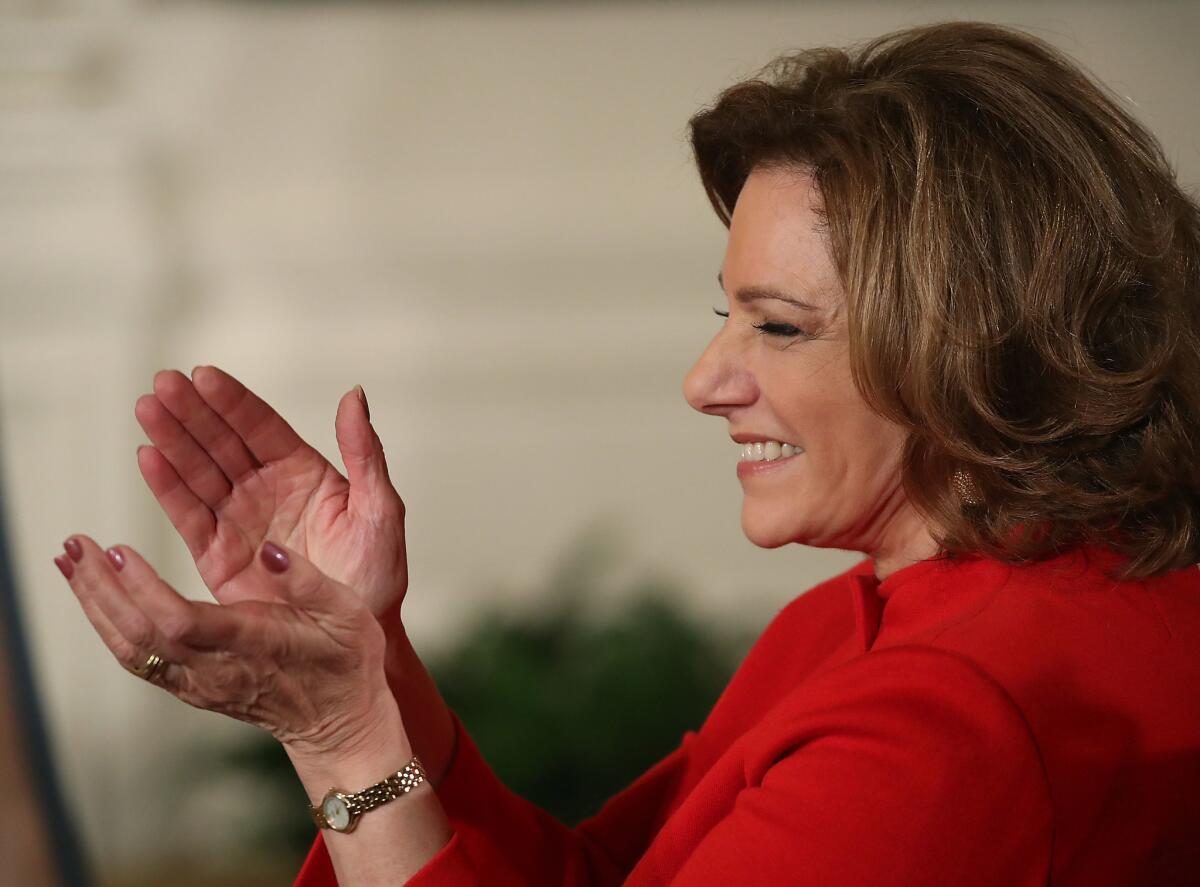
President Trump has signed off on the departure of a top White House national security official, part of a slow-rolling shake-up that consolidates the influence of Trump’s new national security advisor, H.R. McMaster, said a White House official who spoke on the condition of anonymity to discuss her departure.
K.T. McFarland, the principal deputy national security advisor, is expected to leave the White House in the next few weeks once Trump formally nominates her to be U.S. ambassador to Singapore.
McFarland was an early supporter of Trump during the campaign and advocated inside the White House for a military buildup and a muscular U.S. presence overseas. She had previously served in the Nixon, Ford and Reagan administrations and was a Fox News contributor.
McFarland had worked closely with Trump’s first national security advisor, Michael Flynn, who was forced out in February after misleading Vice President Mike Pence about his phone calls with the Russian ambassador.
Since Trump brought in McMaster, an Army lieutenant general, to run the National Security Council, Trump has allowed McMaster to pick his team. McMaster bristled at McFarland’s brash, shoot-from-the-hip style, and her contempt for working through the long-standing, deliberative communications channels with agencies, a U.S. official who has attended meetings with McMaster and McFarland said, speaking on the condition of anonymity to describe internal meetings.
McFarland’s departure is another sign that as Trump nears his 100th day in office, he is empowering cooler heads to run his White House.
Last week, Trump removed chief strategist Stephen K. Bannon from a permanent seat on the National Security Council. Trump was criticized for giving Bannon unusual influence over key military and intelligence decisions.
Singapore is an important financial center in Asia that is seen as crucial to countering China’s influence in the region. In addition, Singapore’s security services work closely with U.S. intelligence.
When asked about McFarland, White House Press Secretary Sean Spicer declined to discuss a personnel change that had not yet been publicly announced.
“McMaster has the president’s confidence to ensure that our National Security Council is shaped in a manner that best serves the president of the United States in every way, shape and form,” Spicer said.
Trump after Gorsuch swearing in: ‘I got it done in the first 100 days!’
Neil M. Gorsuch was sworn in as the newest Supreme Court justice on Monday in a public White House ceremony, less than two hours after a private oath-taking at the high court.
Justice Anthony M. Kennedy administered the oath under bright sunshine in the Rose Garden, with President Trump in attendance.
Gorsuch’s confirmation was the first major victory of the Trump administration, but it came at a cost. The 49-year-old former appeals court judge assumes his post after a bruising battle in which Republicans fought down Democratic objections by changing the rules for approving Supreme Court nominations.
WATCH: Gorsuch is sworn in to the Supreme Court
Trump called the swearing-in an “historic moment” and said it came amid “a process of reviewing and renewing and also rebuilding our country.”
The president declared: “I got it done in the first 100 days!”
Gorsuch said he was humbled by his accession to the high court and promised to be a “faithful servant of the Constitution and laws of this great nation.”
The earlier oath-taking, held at the justices’ conference room, was presided over by Chief Justice John G. Roberts Jr. before a small audience consisting only of Gorsuch’s family and his court colleagues.
The addition of Gorsuch as the 113th Supreme Court justice comes in time for him to take part in crucial high court proceedings in a religious-rights dispute. It centers on a Missouri law that prohibits churches from getting public money for general assistance programs.
Watch: Judge Neil M. Gorsuch is sworn in to the Supreme Court

President Trump speaks at the public swearing in of Neil M. Gorsuch to the Supreme Court.
Gorsuch’s influence on divided Supreme Court will be felt immediately
Neil M. Gorsuch joins the Supreme Court just in time to cast potentially significant votes in cases that pit religious liberty against gay rights, test limits on funding for church schools and challenge California’s restrictions on carrying a concealed gun in public.
Such issues arise either in appeals filed by conservative groups that have been pending before the justices for weeks or in cases to be heard later this month.
In those matters, the votes of Gorsuch -- who took the first of two oaths Monday morning, in a private swearing-in -- may give an early sign of whether the court’s conservatives, with their 5-4 majority restored by his confirmation, will pursue an activist agenda.
The cases include a Colorado baker’s claim that he deserves a faith-based exemption from the state’s anti-discrimination law after he refused to design a wedding cake for a gay couple. The justices have been considering his appeal behind closed doors since December, but have taken no action.
Trump to sell planes to Nigeria to fight Boko Haram despite concerns over human rights abuses

The Trump administration will move forward with the sale of high-tech aircraft to Nigeria for its campaign against Boko Haram Islamic extremists despite concerns over abuses committed by the African nation’s security forces, according to U.S. officials.
Congress is expected to receive formal notification within weeks, setting in motion a deal with Nigeria that the Obama administration had planned to approve at the very end of Barack Obama’s presidency. The arrangement will call for Nigeria to purchase up to 12 Embraer A-29 Super Tucano aircraft with sophisticated targeting gear for nearly $600 million, one of the officials said.
The officials were not authorized to discuss the terms of the sale publicly and requested anonymity to speak about internal diplomatic conversations.
Though President Trump has made clear his intention to approve the sale of the aircraft, the National Security Council is still working on the issue. Military sales to several other countries are also expected to be approved but are caught up in an ongoing White House review. Nigeria has been trying to buy the aircraft since 2015.
The Nigerian air force has been accused of bombing civilian targets at least three times in recent years. In the worst incident, a fighter jet on Jan. 17 repeatedly bombed a camp at Rann, near the border with Cameroon, where civilians had fled from Boko Haram. Between 100 and 236 civilians and aid workers were killed, according to official and community leaders’ counts.
That bombing occurred on the same day the Obama administration intended to officially notify Congress the sale would go forward. Instead, it was abruptly put on hold, according to an individual who worked on the issue during Obama’s presidency. Days later, Trump was inaugurated.
Sen. Bob Corker (R-Tenn.), the chairman of the Foreign Relations Committee, said last week that he supported the A-29 deal to Nigeria as well as the sale of U.S.-made fighter jets to Bahrain that had been stripped of human rights caveats imposed by the Obama administration.
Under Obama, the U.S. said Bahrain failed to make promised political and human rights reforms after its Sunni-ruled government crushed Arab Spring protests five years ago.
“We need to deal with human rights issues, but not on weapons sales,” Corker said.
The State Department said in a 2016 report that the Nigerian government has taken “few steps to investigate or prosecute officials who committed violations, whether in the security forces or elsewhere in the government, and impunity remained widespread at all levels of government.”
Amnesty International has accused Nigeria’s military of war crimes and crimes against humanity in the extrajudicial killings of an estimated 8,000 Boko Haram suspects. President Muhammadu Buhari promised to investigate the alleged abuses after he won office in March 2015, but no soldier has been prosecuted and thousands of people remain in illegal military detention. Nigeria’s military has denied the allegations.
The A-29 sale would improve the U.S. relationship with Nigeria, Africa’s largest consumer market (with of 170 million people), the continent’s biggest economy and its second-largest oil producer. Nigeria also is strategically located on the edge of the Sahel, the largely lawless semi-desert region bridging north and sub-Saharan Africa, where experts warn Islamic extremists such as the Nigeria-based Boko Haram may expand their reach.
The aircraft deal also would satisfy Trump’s priorities to support nations fighting Islamic uprisings, boost U.S. manufacturing and create high-wage jobs at home. The A-29 aircraft, which allow pilots to pinpoint targets at night, are assembled in Jacksonville, Fla.
“It’s hard to argue that any country in Africa is more important than Nigeria for the geopolitical and other strategic interests of the U.S.,” said J. Peter Pham, vice president of the Atlantic Council in Washington and head of its Africa Center.
Once Congress is officially notified of the sale, lawmakers who want to derail it have 30 days to pass veto-proof legislation. That’s a high hurdle given Corker’s support. Sen. John McCain (R-Ariz.), chairman of the Armed Services Committee, also said he backs the sale.
“We’ve really got to try to do what we can to contain them,” McCain said of Boko Haram.
In Trump’s first phone call with Buhari in February, he “assured the Nigerian president of U.S. readiness to cut a new deal in helping Nigeria in terms of military weapons to combat terrorism,” according to Buhari’s office.
A Feb. 15 White House statement that provided a summary of the call said “President Trump expressed support for the sale of aircraft from the United States to support Nigeria’s fight against Boko Haram.”
Sen. Ben Cardin of Maryland, the top Democrat on the Foreign Relations Committee, said in mid-February that he was “leery” of the sale because of the Nigerian military’s impunity. Cardin said this week he’s not trying to block the deal.
“Ultimately we hope that the sale goes forward,” he said. “But there is progress that needs to be made in protecting the civilian population.”
Syria crisis tests Trump’s plan for a new world order
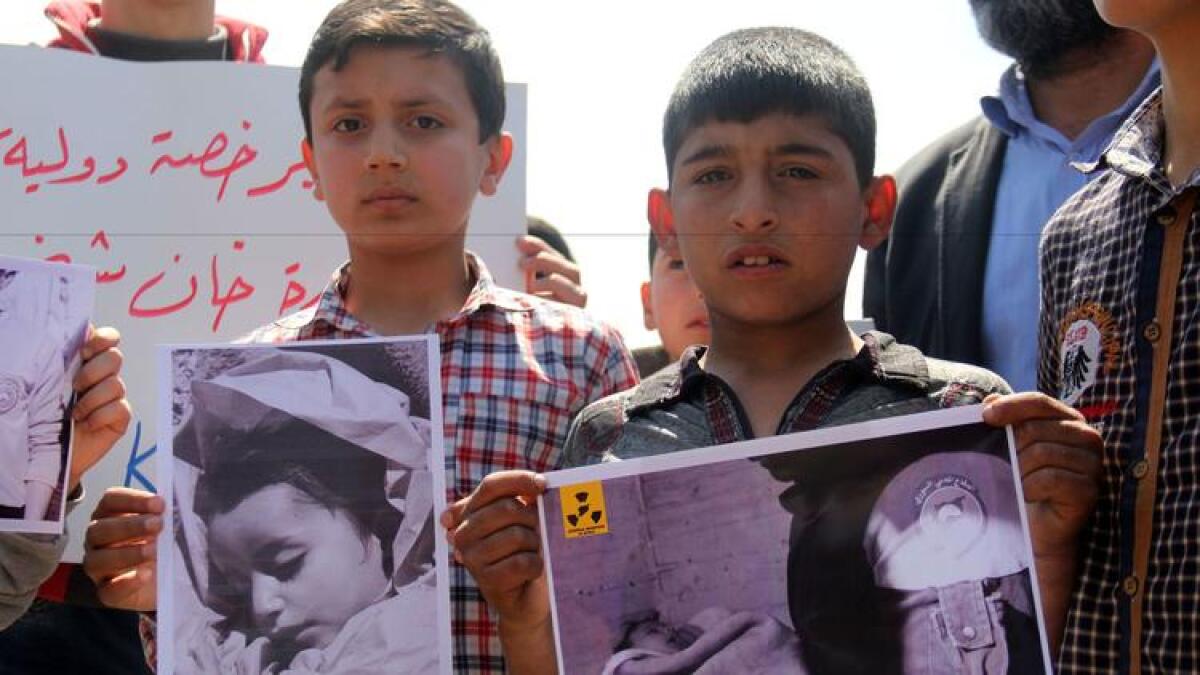
President Trump made an about-face in his approach to the Middle East by launching a fiery salvo of cruise missiles early Friday, and with it came relief to American allies — and many of the president’s critics at home — but its impact in Syria will ultimately depend on what Trump does next.
Attacking one airfield — at least one of the two runways were still in use Friday — hardly diminishes President Bashar Assad’s military capability. And whatever cache of poison gas or other chemical agents the Syrian government has remains intact, including one at the air base that the Pentagon deliberately didn’t target for fear of spreading a toxic cloud.
The volatile situation will quickly test the new administration’s ability to respond to international atrocities or other provocations while upholding Trump’s vow to keep the U.S. military out of prolonged ground wars around the world.
Already, administration officials are signaling the targeting of the Shayrat airfield was a one-and-done — a reassertion of American military might that will not be backed up by a more extensive plan for ousting Assad or protecting Syrian civilians from attacks that involve anything other than banned chemical weapons.
In a consequential week, Trump leans on the Washington establishment he vowed to disrupt

After 10 weeks of pinballing through political and domestic fiascos largely of his own making, President Trump last week faced the kinds of wrenching external challenges no White House occupant can avoid for long.
“No child of God should ever suffer such horror,” Trump said emotionally Thursday night after he ordered a cruise missile attack on a Syrian airfield in response to a poison gas bomb that killed dozens of civilians, including children, and left dozens more writhing in pain.
This was the week a reality-TV presidency faced cold reality.
Trump administration gives mixed messages about its goals in Syria
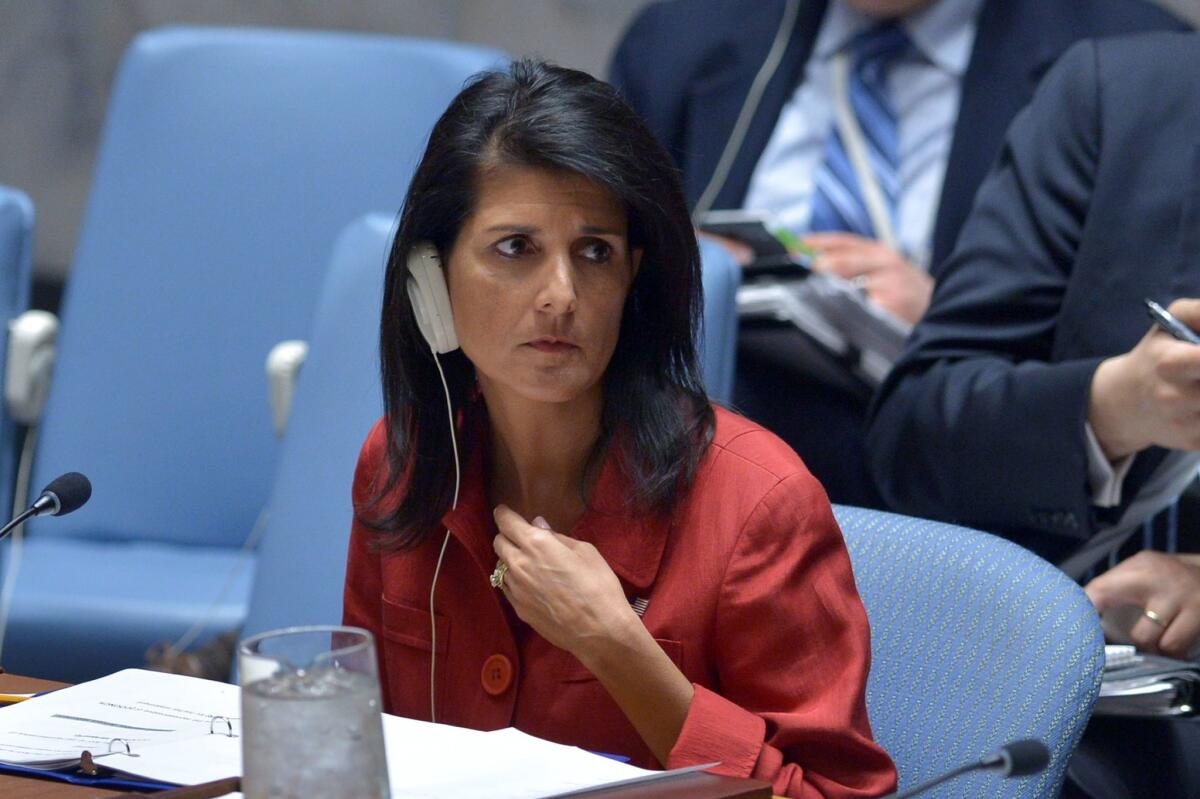
The Trump administration gave mixed messages about its goals in Syria on Sunday, with top officials stressing different priorities in the wake of a U.S. airstrike that marked a deepening involvement in the country’s bitter conflict.
Nikki Haley, the U.S. ambassador to the United Nations, said the departure of Syrian President Bashar Assad is a U.S. priority, just as it was under the Obama administration, and that peace in Syria was probably impossible while he remained in power.
Secretary of State Rex Tillerson took a more nuanced view, asserting that Assad had undermined his legitimacy as a leader but declaring that defeating Islamic State remains the top U.S. goal in Syria.
President Trump’s long-term intentions in Syria thus remained unclear in the days since 59 Tomahawk missiles tore into a Syrian air base that U.S. officials said was used to launch a deadly poison gas attack on April 4 that killed about 80 Syrian civilians and injured dozens more.
The retaliatory airstrike marked a policy reversal for Trump, who had declared throughout his campaign that the United States should not involve itself in local conflicts, an isolationist view consistent with his “America first” policy prism.
On Sunday, Tillerson emphasized that the administration considers defeating the Sunni militants of Islamic State the most pressing concern in Syria, not ousting Assad.
“First and foremost, we must defeat ISIS,” Tillerson said on CBS’ “Face the Nation,” using an acronym for Islamic State. Assad’s eventual fate, he said, “is something that we will be working [on] with allies and others in the coalition.”
That marked an apparent shift from his comments to reporters on Thursday night, when he said, “It would seem there would be no role for him to govern the Syrian people.”
Haley was harsher on CNN’s “State of the Union.” As long as Assad stays in power, she said, “there’s not any sort of option where a political solution is going to happen.”
“If you look at his actions, if you look at the situation, it’s going to be hard to see a government that’s peaceful and stable with Assad,” she added.
The U.S. envoy said “regime change is something that we think is going to happen” in Syria, but she stopped short of suggesting Washington would directly seek that outcome.
Taken together, the comments of Haley and Tillerson suggested senior members of Trump’s foreign policy team may be seeking to shape the president’s views, with Haley more opposed than Tillerson to Assad remaining in power.
Tillerson’s more restrained language may reflect his plans to visit Moscow for meetings this week, however, where he hopes to bridge the latest tensions in ties.
Russia’s government has angrily denounced the missile strike as an act of unwarranted aggression, and denied that Assad’s forces carried out the attack with the banned nerve gas sarin.
But President Vladimir Putin has not personally condemned the U.S. airstrike, and some reports suggest he is unhappy that Assad has boxed him into defending what many consider a war crime.
Trump’s strike on Syria exposes growing GOP divide in Congress on foreign intervention and use of force
The U.S. military action in Syria exposed deepening divisions within the president’s party Friday, an ideological split over foreign policy that could complicate support in Congress.
The fissures among Republicans sent lawmakers into unusual political alliances with Democrats, whose own differences on military involvement are often more muted.
Among skeptics is libertarian-leaning Sen. Rand Paul (R-Ky.), whose reluctance to engage in foreign entanglements often results in common cause with some of the more liberal Democrats.
Both parties are pushing President Trump to seek authorization for the use of military force from Congress under the War Powers Act, though Congress is unlikely to take up debate soon.
“In foreign policy, things are not as simple as they appear, and actions often have consequences well beyond the obvious,” Paul wrote in an op-ed for Fox News. “It is for this very reason that the founders wanted a deliberate, thoughtful foreign policy, and when military action was needed, they wanted it debated and authorized by Congress.”
That non-interventionist approach puts a newer generation of Republicans at odds with the GOP’s more traditional hawks, who saluted Trump’s strikes on Syria as a strategic operation in response to President Bashar Assad’s attack on civilians in Syria.
They largely believe the White House is operating under existing congressional authority, and do not expect a prolonged military campaign.
“I think the president had the authority to do what he did, and I’m glad he did it,” said Senate Majority Leader Mitch McConnell (R-Ky.), who opposed President Obama’s proposed 2013 action in Syria as too tepid.
McConnell said Trump’s action sent a message: “America is back in terms of playing a leadership role and trying to be constructive in a variety of different places around the world.”
Fallout on Capitol Hill was swift as senators were briefed Friday on the operation and lawmakers pressed for fuller understanding of the administration’s Syria strategy.
Minority Leader Nancy Pelosi (D-San Francisco) called on House Speaker Paul D. Ryan (R-Wis.) to recall the House from its spring recess to debate an authorization, but that seemed highly unlikely as Congress left town for a two-week break.
Ryan showed the limits of lawmakers’ appetite to fully immerse Congress in the issue.
“Resolving the years-long crisis in Syria is a complex task, but Bashar al-Assad must be held accountable and his enablers must be persuaded to change course,” Ryan said. “I look forward to the administration further engaging Congress in this effort.”
Lawmakers for years have objected to the White House relying on the 2001 use of force authorization approved by Congress in the aftermath of the Sept. 11 attacks for continue military action abroad.
Yet they have been unable to muster the political will to pass a new one through the House and Senate, in part because lawmakers are hesitant to go on record with a vote perceived as either supporting or opposing a military effort.
Even after Congress cut short a summer recess in 2013 to address the Syria issue, lawmakers failed to bring forward a new agreement.
In 2015, Obama sent Congress a new “Authorization for Use of Military Force” but many lawmakers dismissed it as too narrowly drafted in ways that confine the president’s role.
Rep. Jim Banks (R-Ind.), a Rust Belt lawmaker, has proposed a new authorization, with a Hoosier State colleague, Sen. Todd Young (R-Ind.)
“At this critical moment, it is vital that the United States has a comprehensive strategy that addresses the situation in Syria,” Banks said. “Part of this strategy should include Congress passing a new AUMF. The constitution grants Congress the power of declaring war, and we need to take that obligation seriously.”
Another bill has been proposed by Rep. Barbara Lee (D-Oakland.)
They are among six bills now pending before Congress, from Democrats and Republicans, to update congressional approval for te use of force in Syria.
Republicans getting antsy over special congressional vote -- in ruby-red Kansas, of all places
When it comes to national politics, Kansas is about as red as Dorothy’s famous slippers.
Fewer than a handful of Democrats have been elected to the House in the past generation. Voters haven’t supported a Democrat for president since 1964.
The last time Kansas sent a Democrat to the U.S. Senate was in 1932 – seven years before Dorothy and her transportive footwear showed up in movie theaters.
All of which made it all the more striking this week when national Republicans dumped nearly $100,000 – a not-unsubstantial sum by Kansas standards – into next week’s special election to fill a vacant House seat in the Wichita area.
The contest for the seat, which opened up when three-term Republican Mike Pompeo stepped down to head the CIA, was expected to be an easy victory under nominee Ron Estes, the state treasurer.
The fact Republicans feel obliged to conduct a last-minute ad blitz has heartened Democrats and their candidate, attorney James Thompson, even if an upset still seems unlikely. President Trump carried the district by a whopping 60% to 33%.
But as the Cook Political Report noted, special elections tend to be extremely low-turnout affairs, and given Trump’s slumping approval and signs of increased Democratic activism, the contest appears more competitive than just a few weeks ago.
On Thursday, the nonpartisan handicappers at the Cook Report moved the race from “solid Republican” to “likely Republican.”
In a further sign of GOP nervousness, Vice President Mike Pence has recorded a robocall urging Republican voters to the polls, the Washington Examiner reported Friday.
A Democratic upset on Tuesday would be particularly sweet for the party and its supporters, coming in the hometown of Koch Industries, the conglomerate owned by the conservative bankrolling Koch brothers.
It would also provide an enormous boost walking up to a special election in Georgia on April 18, where Democrat Jon Ossoff has raised a stunning $8 million-plus for his campaign to snatch away a Republican-leaning district in the Atlanta suburbs.
The House seat was vacated when GOP Rep. Tom Price resigned to head the Department of Health and Human Services.
12:20 p.m.: This post has been updated with a report that Vice President Mike Pence has recorded a robocall aimed at GOP voters.
U.S. and Russia still talking on Syria, despite Moscow’s claims it cut off communications

The U.S. and Russia are still talking on a communications hotline about aircraft movement in the crowded skies over Syria, despite Moscow’s claim Friday that it had pulled out of the link.
The Pentagon and the Russian military established the so-called deconfliction line after Russia entered Syria’s multi-sided civil war in 2015, propping up its ally, President Bashar Assad.
The step was meant to ensure that the two countries’ pilots would not mistakenly run into -- or fire on -- one another as they conducted daily bombing runs.
The Russian Foreign Ministry said hours after an overnight U.S. strike on a Syrian airfield that it was suspending the agreement.
However, a regularly scheduled morning call occurred Friday between a U.S. Air Force officer at a command center in the Persian Gulf state of Qatar and a Russian military officer, according to U.S. officials.
The Pentagon said it hopes the practice continues. “The Department of Defense maintains the desire for dialogue through the flight safety channel,” Maj. Adrian Rankine-Galloway, a Pentagon spokesman, said in statement. “It is to the benefit of all parties operating in the air over Syria to avoid accidents and miscalculation, and we hope the Russian Ministry of Defense comes to this conclusion as well.”
The two sides speak three times a week on the deconfliction line, officials said, but that frequency has picked up in recent months due to an increased tempo of fighting.
The talks, which occur over an insecure phone line and a commercial Google email account, have grown in importance as U.S. and Russian forces converge on the same contested towns, including Manbij and Al Bab in northern Syria, and Deir al-Zour in the east.
The communications have proved crucial in staving off an international incident in which U.S. warplanes might inadvertently hit Russian ground forces deployed alongside Syrian government troops, or Russian aircraft might strike U.S. troops aiding Syrian rebels.
U.S. warplanes have carried out thousands of airstrikes in Syria against the Sunni Muslim militants of Islamic State as part of a coalition that has also involved NATO and Arab states’ aircraft. The coalition’s strikes in Syria and in Iraq are coordinated each day by a U.S. command center in Qatar, where officials from dozens of countries are represented.
Russian aircraft have been conducting a separate air campaign to support the Assad government in the country’s blood-soaked civil war, now in its seventh year. Russia began bombing Syrian rebel positions in September 2015.
U.S. intelligence officials are sifting through the bluster out of Moscow following the U.S. strikes on an airfield outside the central city of Homs, and are concerned that Russia’s announced plan to cut off the coordination of air operations would make it harder for the U.S. and its allies to attack Islamic State.
U.S. military officials have also been keeping track of Russian aircraft flying near Islamic State’s de facto capital of Raqqa, where U.S.-backed forces are preparing to mount a major assault.
Senate confirms Neil Gorsuch, Trump’s Supreme Court nominee
Judge Neil M. Gorsuch was confirmed Friday for a lifetime appointment to the Supreme Court, filling a 14-month vacancy after a dramatic Senate showdown that risked long-lasting repercussions to both institutions.
The confirmation will deliver a much needed political victory to President Trump, whose administration is struggling in its first 100 days to make progress on many campaign promises amid infighting in the White House and on Capitol Hill.
The Senate confirmed Gorsuch for the seat that had been vacant since the 2016 death of Justice Antonin Scalia. The Republican-led Senate had refused last year to consider President Obama’s nominee, Judge Merrick Garland, fueling partisan rancor and Democratic opposition to Gorsuch.
The 49-year-old Gorsuch is a respected conservative on the U.S. 10th Circuit Court of Appeals in Denver. He is expected to bring a “textualist” approach to the court, relying on an exact reading of legal language.
Since he is replacing Scalia, a conservative icon, the ideological tilt of the bench is not likely to shift. He will restore a 5-4 majority that Republican appointees have held on the court for years.
Here’s why Dianne Feinstein could well become the longest-serving U.S. senator in California history
Dianne Feinstein, the senior U.S. senator from California, has long had an air of mystery, an essence distilled in a single sentence: Will she or won’t she?
Will she oblige the Clinton White House and run for governor? (That was back in 1998, and, after months of speculation, she didn’t.) Will she save Democrats’ bacon by challenging Republican Arnold Schwarzenegger in the 2003 gubernatorial recall election? (She took a pass, again after much guessing.)
The question has gained renewed currency as Feinstein looks to 2018 and the prospect of seeking reelection a fifth time. If she wins and stays in office through 2022, she would become the longest-serving U.S. senator in California history, surpassing the 28 years Hiram Johnson served starting in 1917.
More to the point, Feinstein would be 91 years old at the end of her term; at age 83, she is already the Senate’s oldest member. She has until a March 9 filing deadline to make up her mind.
The military airfield hit by U.S. missiles in a deeply divided Syria
For the first time in Syria’s six-year civil war, the U.S. has targeted the military of President Bashar Assad’s government. The Shayrat airfield is the site from which a chemical weapon attack was launched against rebel-held Khan Sheikhoun this week, according to U.S. officials. Two U.S. Navy destroyers in the Mediterranean Sea fired more than 50 Tomahawk cruise missiles at the airfield early Friday.
Watch: Pentagon releases video of missile launches targeting Syria

Video shows U.S. destroyers Porter and Ross as they launch Tomahawk missiles into Syria. The Pentagon said 59 missiles targeted a Syrian air base.
U.S. military officials released video late Thursday taken aboard the U.S. destroyers Porter and Ross as they launched Tomahawk missiles into Syria.
The Pentagon said 59 missiles targeted a Syrian air base.
The attack missiles targeted “aircraft, hardened aircraft shelters, petroleum and logistical storage, ammunition supply bunkers, air defense systems, and radars,” according to the Pentagon news release.
Rex Tillerson said Russia ‘failed in its responsibility’ to secure Syria’s chemical weapons
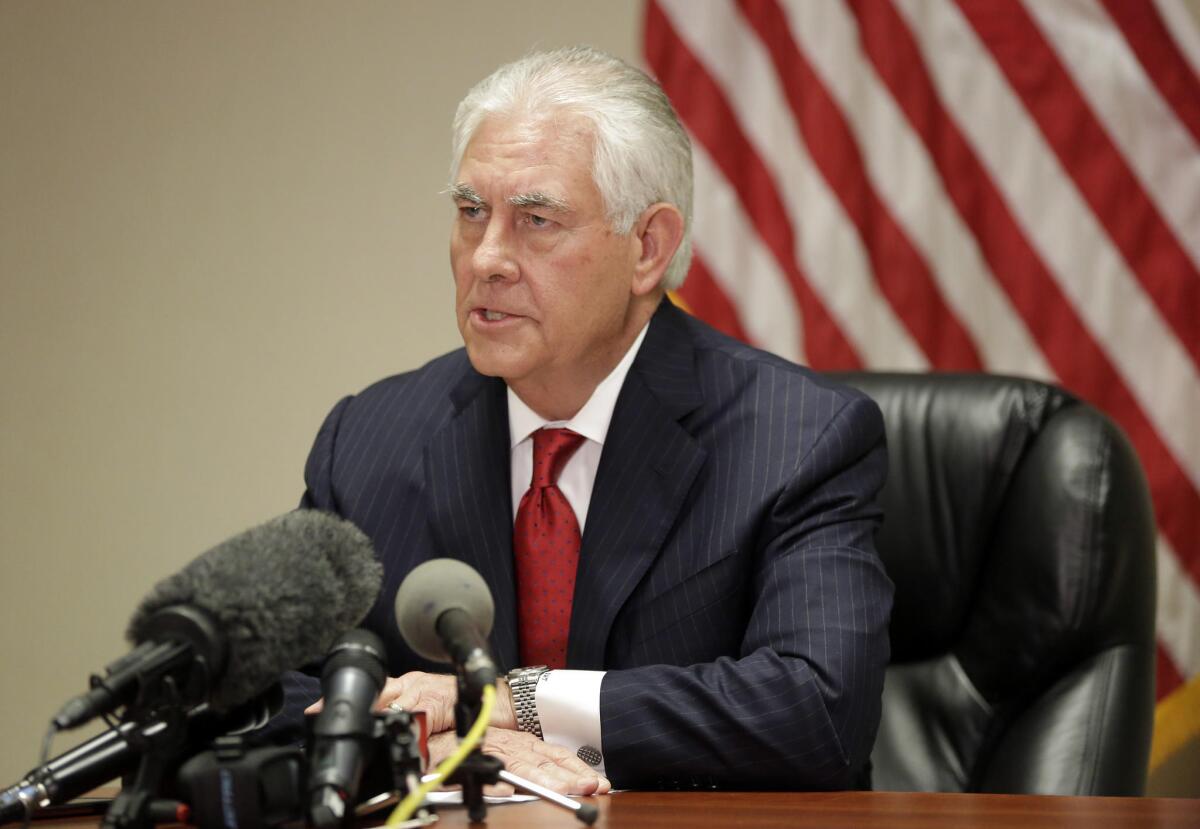
Secretary of State Rex Tillerson said the United States was forced to act against Syria because “clearly Russia has failed in its responsibility” to secure and destroy Syria’s chemical weapon stockpile under a 2013 agreement brokered with President Obama.
Tillerson said the strikes were also an attempt to push back against Bashar Assad and demonstrate that the world community will not ignore the use of chemical weapons.
“He in effect is normalizing the use of chemical weapons, which then might be adopted by others,” Tillerson added during a late-night briefing with reporters in Palm Beach.
In addition, Tillerson said the attack was intended to prevent non-government groups or individuals who could harm Americans from obtaining chemical weapons amid the chaos of Syria’s civil war.
Tillerson and national security advisor H.R. McMaster said they did not seek permission from Russia before the strike. They did, however, follow agreements to inform the military in an effort to prevent Russian casualties.
“Our target in this attack was not Russia,” Tillerson said. “Our target was this airfield and the Syrian regime.”
Tillerson said the military action did not indicate a change in U.S. policy toward Syria, but “it does demonstrate that President Trump is willing to act when governments and actors cross the line.”
McMaster minimized the extent to which it would cripple Assad’s regime.
“Obviously, the regime will retain a certain capacity to commit mass murder with chemical weapons beyond this airfield,” he said.
Watch: Trump defends airstrikes on Syria as vital to ‘national security interest’
President Trump, responding to what he called Syrian President Bashar Assad’s “barbaric” chemical weapons attack on his own citizens, said his decision to launch a “targeted” retaliatory strike was in line with the nation’s “vital national security interest.”
“There can be no dispute that Syria used banned chemical weapons, violated its obligations under the Chemical Weapons Convention and ignored the urging of the U.N. Security Council,” Trump said in a three-minute statement to reporters late Thursday from his Mar-a-Lago retreat. “Tonight, I call on all civilized nations to join us in seeking to end the slaughter and bloodshed in Syria and also to end terrorism of all kinds and all types.”
Trump, speaking slowly and from prepared remarks on a teleprompter, accused Assad of “chok[ing] out the lives of helpless men, women and children.”
“No child of God should ever suffer such horror,” he said.
Trump said previous attempts to deter Assad’s aggression had “failed dramatically,” but he did not criticize his predecessor by name, as he has in recent days. But he said that failed approach had led to a worsening refugee crisis and further destabilization of the region, “threatening the United States and its allies.”
Times staff writer Michael A. Memoli contributed to this report.
U.S. opens new military front in Syria, launching cruise missiles against Assad’s forces
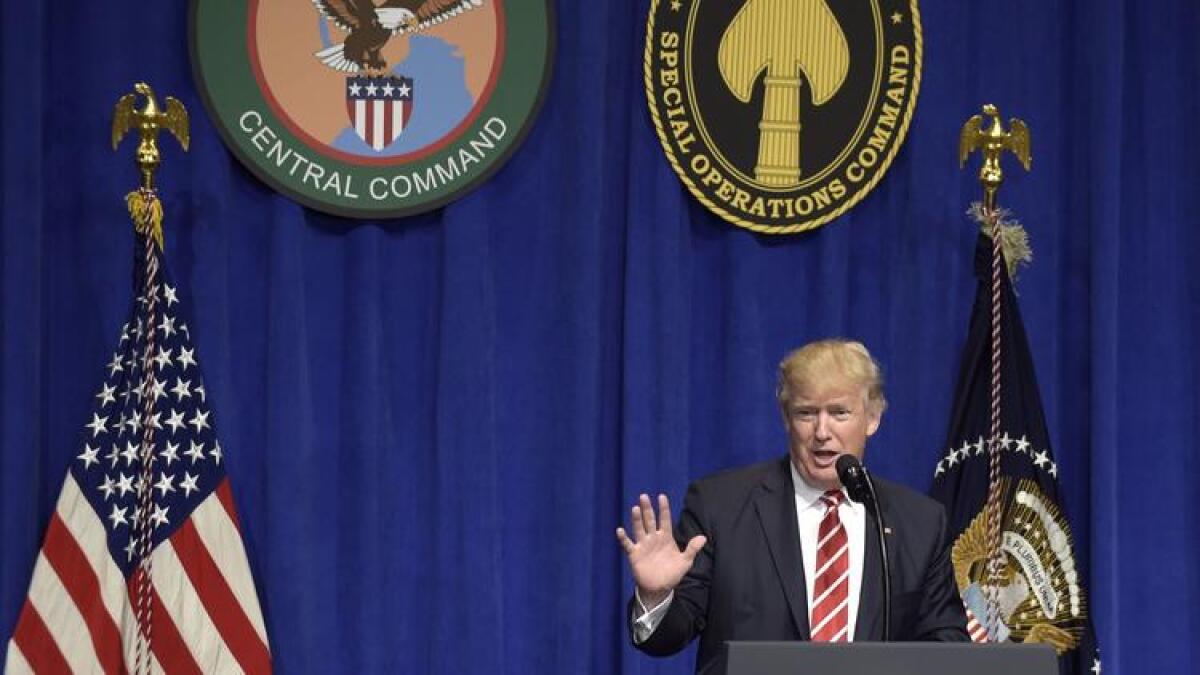
The Pentagon launched more than 50 Tomahawk cruise missiles at a Syrian air base late Thursday in retaliation for a gruesome poison gas attack this week that U.S. officials said was carried out by President Bashar Assad’s forces.
Trump authorized the attack after he was briefed by Defense Secretary James N. Mattis in Palm Beach, Fla., where the president is hosting visiting Chinese President Xi Jinping.
Read more: U.S. launches dozens of missiles at Syria in response to chemical weapons attack >>
Two Navy destroyers patrolling in the eastern Mediterranean Sea fired lethal salvos of Tomahawk cruise missiles into eastern Syria from hundreds of miles offshore, well out of range of Syrian air defenses, according to U.S. officials.
The target was Shayrat airfield, with two runways in western Syria that were used by Assad’s warplanes to launch a chemical attack Tuesday against civilians in the rebel-held town of Khan Sheikoun, the officials said.
Targets included aircraft, fuel and weapons depots, and command and control facilities in Assad’s stronghold, officials said. Pentagon officials said they were assessing the results of the strikes, adding that there were no plans for additional strikes Thursday.
The attack marks the first time the U.S. has deliberately targeted Assad’s military in Syria’s multi-sided civil war, now in its seventh year. Until now, the U.S. has focused only on targeting Islamic State militants.
Analysis: Devin Nunes’ role turns from controversial to untenable
Devin Nunes’ departure from his role as leader of the House investigation into Russian interference in the presidential election put a blot on the Tulare congressman’s record that the preceding drip-drip-drip of controversy had not.
For weeks, Nunes has been beset by criticism, especially after his startling trip to the White House to receive what he described as classified evidence indicating possible surveillance of some members of Donald Trump’s transition team. And for weeks, Nunes steadfastly denied he’d done anything wrong and pledged to remain at the helm of the House Intelligence Committee’s investigation.
But Thursday, a new investigation — this time by the House Ethics Committee into whether Nunes had inappropriately released classified information — marked a more serious turn for the Republican congressman.
Much is unknown about what happens next, but what has happened so far cut into the congressman’s desire to be seen as a public servant with unsullied integrity, caught in the whirlwind of partisan warfare.
Hackers, Mexican soap stars, border wall: What to know about Texan taking over House Russia inquiry
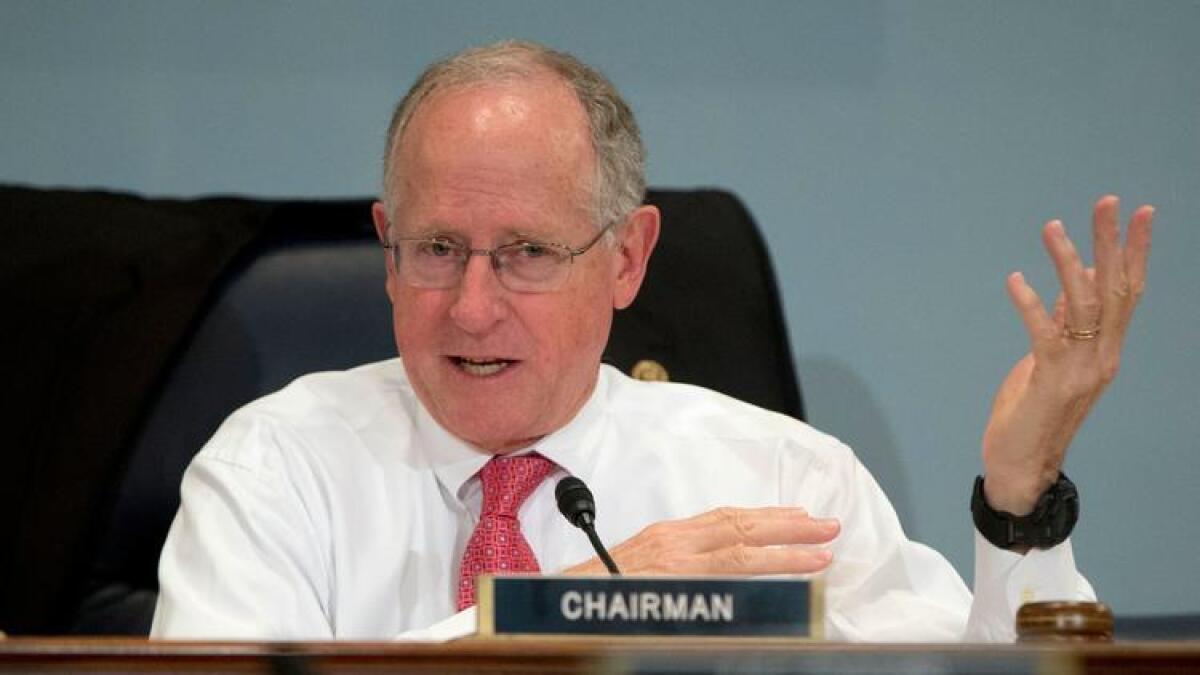
He’s served in Congress for more than a decade and now has what is among the most high-profile jobs in Washington: overseeing a House probe into Russian meddling in last year’s election.
On Thursday, Rep. K. Michael Conaway (R-Texas) assumed the role as head of the House Intelligence Committee investigation into whether President Trump’s associates colluded with Russia during last year’s election — a move that came as Rep. Devin Nunes (R-Tulare) temporarily stepped aside from the post as he faces inquiries from ethics investigators.
Conaway, with assistance from Reps. Trey Gowdy (R-S.C.) and Tom Rooney (R-Fla.), takes charge of the inquiry as questions about Trump associates’ ties to Russia continue to hover over the fledgling administration. The Texas congressman has served on the Intelligence Committee for eight years.
“My profession as a CPA and auditor has taught me to be objective and methodical, and that is how I intend to help lead this investigation,” Conaway, alluding to his work as an accountant, said in a statement.
In history-making showdown, Senate GOP breaks Democratic filibuster of Trump’s Supreme Court pick
A somber, deeply divided Senate tossed aside some of its surviving remnants of bipartisanship Thursday as Democrats filibustered President Trump’s Supreme Court nominee and Republicans overcame the tactic by simply voting to scrap long-standing rules.
The history-making turn of events put Judge Neil M. Gorsuch on track for easy confirmation to the lifetime appointment in a vote scheduled for Friday, but threatened to deepen dissension and gridlock in the once-lofty chamber.
It marked only the second time in history that a president’s Supreme Court nomination had been blocked by a filibuster.
Republicans’ reaction — to break with Senate tradition by allowing a high court filibuster to be broken with a simple majority rather than 60 votes — was considered such an extreme measure it had been dubbed the “nuclear option.”
President Trump praised the Senate’s move to advance his nominee. “We have a great person right now in Judge Gorsuch,” Trump said Thursday while traveling on Air Force One to his club at Mar-a-Lago in Florida.
But earlier in the day, tensions were high and the mood grim as senators quietly took their seats to consider the nomination of the conservative judge from Colorado’s U.S. 10th Circuit Court of Appeals.
Both sides were mindful that their actions would have long-lasting ramifications for the Senate, diminishing built-in protections for minority viewpoints that have enabled the chamber to provide a check on the executive branch and the often-impetuous House.
“The 60-vote bar in the Senate is the guardrail of our democracy,” said Senate Minority Leader Charles E. Schumer (D-N.Y.) in a floor speech. “I am disheartened that we are here.... And I worry a great deal about what that means for the future.”
Trump considering military strike on Syria in response to poison gas attack
President Trump is considering military action against Syrian President Bashar Assad’s government as a response to a poison gas attack that killed more than 70 people, many of them children, in northern Syria this week.
Defense Secretary James N. Mattis is expected to present Trump with a list of options on a limited operation — likely an airstrike — that would degrade Syria’s military’s capabilities and forces, hamper its ability to deliver chemical weapons and deter future use of banned nerve agents, according to U.S. officials.
UPDATE: Get the latest on the U.S. strike on Syrian military targets >>
Trump is expected to meet Thursday night with members of his National Security Council at his Mar-a-Lago estate in Florida, where he is starting a two-day summit with visiting Chinese President Xi Jinping.
Administration officials and top Pentagon officers are considering limited air attacks on military targets, including aircraft, airfields and other facilities, the officials said.
Any military action would seek to hobble Assad’s military capabilities while avoiding inadvertently hitting the Russian and Iranian troops that are mixed in — and fighting alongside — the Syrian military in many parts of the country.
It is an abrupt reversal for the Trump administration, which earlier this week indicated it was indifferent to whether Assad, who is battling rebels in a civil war, remained in power.
Top congressional members have been briefed on options for military action against Assad, officials said.
Pentagon planners went to work after an emergency meeting of the National Security Council on Wednesday night, one day after U.S radar and surveillance systems detected a fixed-wing Syrian aircraft drop bombs near a hospital in the rebel-held area around Khan Sheikhoun in northwestern province of Idlib, officials said.
Minutes after the attack, photos and videos emerged on social media that showed lifeless bodies of children, eyes open, sprawled on the ground alongside surviving victims with foam bubbling from their mouths as they gasped for air.
“That crosses many, many lines,” Trump said on Wednesday. “Beyond a red line — many, many lines.”
In 2013, months after President Obama had said Syria would cross a “red line” if it used chemical weapons, the White House came under intense pressure to respond after Assad’s forces used nerve gas that killed more than 1,400 people in a rebel held area in Damascus.
But Obama ultimately backed down, focusing instead on an international effort that officials said ultimately disarmed Assad of his chemical weapons arsenal and production facilities.
U.S. defense officials said they could potentially use U.S. warships to launch cruise missiles from hundreds of miles offshore, well out of range of Syrian air defenses.
The Navy destroyer Porter, which launched Tomahawk missiles during the opening stage of the 2003 invasion of Iraq, is in the region, along with the guided missile destroyer Ross.
The Pentagon also can use stealth aircraft to slip past Syrian advanced radar and defense systems, although as one U.S. defense official noted, “The use of manned aircraft would obviously increase the risk” to U.S. personnel.
The president has not sought congressional authorization to use military force to punish Assad’s government, which has strenuously denied using chemical weapons, blaming the rebels instead.
Some GOP leaders have urged Trump to use military action in Syria. Sens. John McCain (R-Ariz.), chairman of the Armed Services Committee, and Lindsey Graham (R-S.C.) released a statement advocating attacks to ground Assad’s air force.
“This capability provides Assad a strategic advantage in his brutal slaughter of innocent civilians, both through the use of chemical weapons as well as barrel bombs, which kill far more men, women and children on a daily basis,” the statement.
“This is a test of the new administration, but also for our entire country,” they said. “Assad is trying to see what he can get away with. The rest of the region and the world is also watching to see how our country will respond, and what that means for them.”
U.S. has ‘no doubt’ Syrian President Bashar Assad ordered gas attack, Secretary of State Tillerson says
Secretary of State Rex Tillerson said Thursday there was “no doubt” that Syrian President Bashar Assad was responsible for a deadly poison gas attack that killed dozens of Syrian civilians, including children, and vowed a “serious response” by the U.S.
“There is no doubt in our minds that Syria and the regime under Bashar Assad were responsible for this attack,” Tillerson said Thursday. “It’s a serious matter; it requires a serious response,” he added when asked if military retaliation was being planned.
Trump is considering military strikes against Syria in response to poison gas attack >>
The Trump administration is weighing options, including a military attack that could involve limited airstrikes.
Trump himself suggested to reporters aboard Air Force One on Thursday that Assad might not be able to remain in power in the wake of the strike.
“What Assad did is terrible. What happened in Syria is truly one of the egregious crimes and it shouldn’t have happened. And it shouldn’t be allowed to happen,” the president said.
Asked what specific steps he might take, Trump replied: “I don’t want to say what I’m going to be doing with respect to Syria.”
Tillerson, making rare public comments after receiving Chinese President Xi Jinping at the beginning of a two-day summit in Florida, also held Russia at least partly to blame for the gas attack and, reversing a position he uttered just last week, said there was “no role” for Assad to continue to govern the people of Syria.
“It is important that [the Russians] consider carefully their continued support for the [Assad] regime,” Tillerson said.
Tillerson heads to Moscow next week on his first official trip there. Although the trip had already been planned, it will focus in part of Russia’s continued support for Assad, officials said Thursday.
Tillerson called his Russian counterpart, Foreign Minister Sergey Lavrov, on Wednesday to hear Russia’s version of the Syria attack, a senior State Department official said. No further details were available, but Moscow has parroted Assad’s claims that it used no chemical weapons and that the gas was probably contained in a rebel storage facility and was released in an airstrike.
Last week, both Tillerson and the U.S. ambassador to the United Nations, Nikki Haley, said the U.S. had abandoned its demand that Assad be removed from power and that the only priority in the Middle East was the defeat of the Islamic State terrorist organization, which is concentrated in Syria and Iraq.
Tillerson’s comments Thursday seemed to return to the earlier, Obama-era position. He said an international political and diplomatic process to remove Assad was already underway.
Apparently he was referring to U.N.-sponsored talks in Geneva that have made scant progress in reaching even the outlines of a political solution, much less a sustained cease-fire.
Read Rep. Adam Schiff’s statement on Devin Nunes stepping away from the Russia probe
These are the Republicans stepping in to lead the House probe on Russia

House Intelligence Committee Chairman Devin Nunes today said he’s temporarily stepping aside from the Russia probe amid accusations he may have improperly disclosed classified information.
At the recent House Intelligence hearing on Russia meddling in the 2016 election, Rep. Mike Conaway of Texas had one of the more memorable exchanges with FBI Director James Comey.
Conaway, with help from Representatives Trey Gowdy (R-S.C.) and Tom Rooney, (R-Fla.), is taking temporary charge of the GOP-led committee’s Russia investigation. Watch the exchange below:

At the recent House Intelligence hearing on Russia meddling in the 2016 election,Mike Conaway had one of the more memorable exchanges with FBI Director James Comey.
Read Devin Nunes’ full statement on stepping down from the Russia probe
Read the House Ethics Committee’s statement on Devin Nunes
Gorsuch set to be confirmed to the Supreme Court, but will the fight over Trump’s pick break the Senate?
The Senate has been called dysfunctional, outdated and downright broken.
But the anticipated showdown over President Trump’s nominee for the Supreme Court, Judge Neil M. Gorsuch, just might inflict damage beyond repair on the once lofty chamber.
On Thursday, Democrats are set to mount a historic filibuster of the nomination, to quickly be followed by a once unthinkable Republican rule change to break the logjam with a simple majority — clearing the way for Gorsuch to be confirmed Friday for a lifetime seat on the court.
What’s about to unfold is called the “nuclear option” for a reason, and the potential devastation is creating a deeply toxic political environment that threatens core Senate operations for the foreseeable future.
Devin Nunes says he’s temporarily stepping aside from Russia probe

House Intelligence Committee Chairman Devin Nunes today said he’s temporarily stepping aside from the Russia probe amid accusations he may have improperly disclosed classified information.
House Intelligence Committee Chairman Devin Nunes today said he’s temporarily stepping aside from the Russia probe amid ethics accusations that he may have disclosed classified information.
Nunes (R-Tulare) said he was stepping down temporarily as head of the House probe into whether Trump associates colluded with Russia during last year’s election.
In a statement, Nunes said he was taking the action because “several leftwing activist groups have filed accusations against me with the Office of Congressional Ethics.”
“Despite the baselessness of the charges, I believe it is in the best interests of the House Intelligence Committee and the Congress for me to” step aside from the Russia probe “while the House Ethics Committee looks into this matter,” Nunes said.
Nunes said “the charges are entirely false and politically motivated, and are being leveled just as the American people are beginning to learn the truth about the improper unmasking of the identities of U.S. citizens and other abuses of power.”
Nunes said he had asked to speak to the ethics committee “at the earliest possible opportunity in order to expedite the dismissal of these false claims.”
Nunes has come under fierce criticism from Democrats for making public information provided him to him last month by White House aides about classified intelligence reports that referred to Trump associates, and that Nunes did not provide to members of his committee.
Nunes said that Rep. Mike Conaway, (R-Texas), with assistance from Representatives Trey Gowdy (R-S.C.) and Tom Rooney, (R-Fla.) would temporarily take charge of the GOP-led committee’s Russia investigation
He said he would remain as chairman of the committee.
The leaders of the House Ethics Committee said it is investigating whether Nunes improperly disclosed classified information, apparently when he held a press conference last month to claim that Trump associates names had been revealed in intelligence reports.
“The Committee is aware of public allegations that Representative Devin Nunes may have made unauthorized disclosures of classified information, in violation of House Rules, law, regulations, or other standards of conduct,” Rep. Susan Brooks, (R-Ind.), the committee chairwoman, and Rep. Theodore Deutch, (D-Fla.), the top Democrat on the panel. said in a statement.
The ethics committee “is investigating and gathering more information regarding these allegations,” they said.
Democrats applauded Nunes’ decision to step aside.
“Good for him,” said Sen. Kamala Harris, (D-Calif.), a member of the Senate intelligence committee, which is conducting a separate probe of Russian meddling in the election.
“He stopped being objective,” she added, referring to Nunes’ failure to share the intelligence he received from the White House with the House committee before he made it public.
Speaker Paul Ryan also appeared to support Nunes’ decision to step aside.
In a statement, Ryan said Nunes “is eager to demonstrate to the Ethics Committee that he has followed all proper guidelines and laws. In the meantime, it is clear that this process would be a distraction for the House Intelligence Committee’s investigation into Russian interference in our election.”
7:02 a.m.: This post has been updated with information on the ethics accusations that Nunes says have been filed against him.
This post originally published at 6:51 a.m.
Wall won’t span the entire U.S.-Mexico border, Homeland Security secretary concedes
President Trump’s central campaign promise -- a “big beautiful wall” along the border with Mexico -- will not actually stretch across the entire border, Homeland Security Secretary John Kelly told a Senate committee Wednesday.
“It’s unlikely that we will build a wall or physical barrier from sea to shining sea,” Kelly testified to the Senate Homeland Security Committee.
“But it is very likely -- I’m committed to putting it where the men and women say we should put it,” he said, referring to immigration and border enforcement agents.
Kelly’s statement was the administration’s clearest official acknowledgement that there will be no wall along the entire border, something he and other officials have suggested somewhat less directly in other forums.
Throughout the campaign, Trump had insisted that the border wall would be a physical structure, paid for by Mexico. His administration plans to request money for the wall from Congress. Trump still says he will find a way to force Mexico to reimburse the U.S. for the cost, something the Mexican government calls a non-starter.
Kelly said many aspects of the wall remain uncertain, including the cost and the structure.
Republicans attack consumer financial watchdog chief as they push for his firing
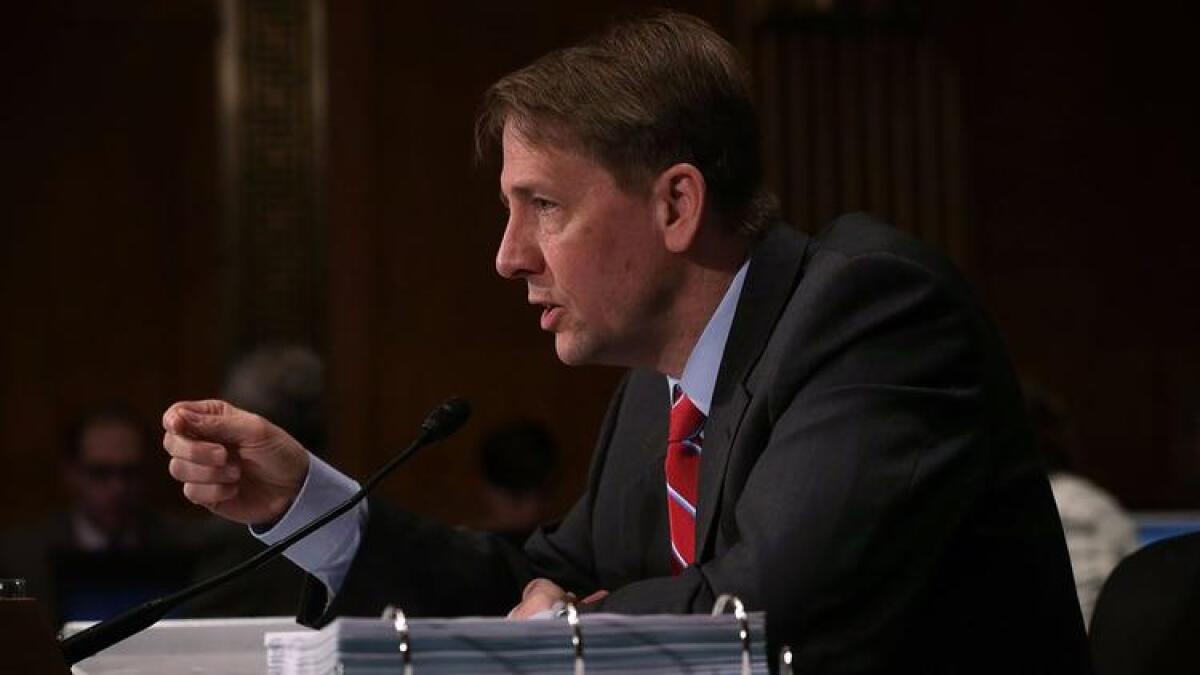
The chairman of a powerful House committee welcomed the nation’s top consumer financial watchdog to a hearing Wednesday by expressing surprise he showed up, and hoped he never does so again.
The nearly five hours of questioning that followed marked a new level of hostility in the sharply partisan battle over a controversial agency.
“I believe the president is clearly justified in dismissing you and I call upon the president … to do just that, and to do it immediately,” Rep. Jeb Hensarling (R-Texas) told Richard Cordray, director of the Consumer Financial Protection Bureau.
Republicans on the House Financial Services Committee addressed Cordray like prosecutors as they targeted the head of an independent agency they have opposed since its creation in 2010 and which played a key role in sanctioning Wells Fargo & Co. for its fake-accounts scandal.
Trump says Susan Rice may have committed a crime, but provides no evidence
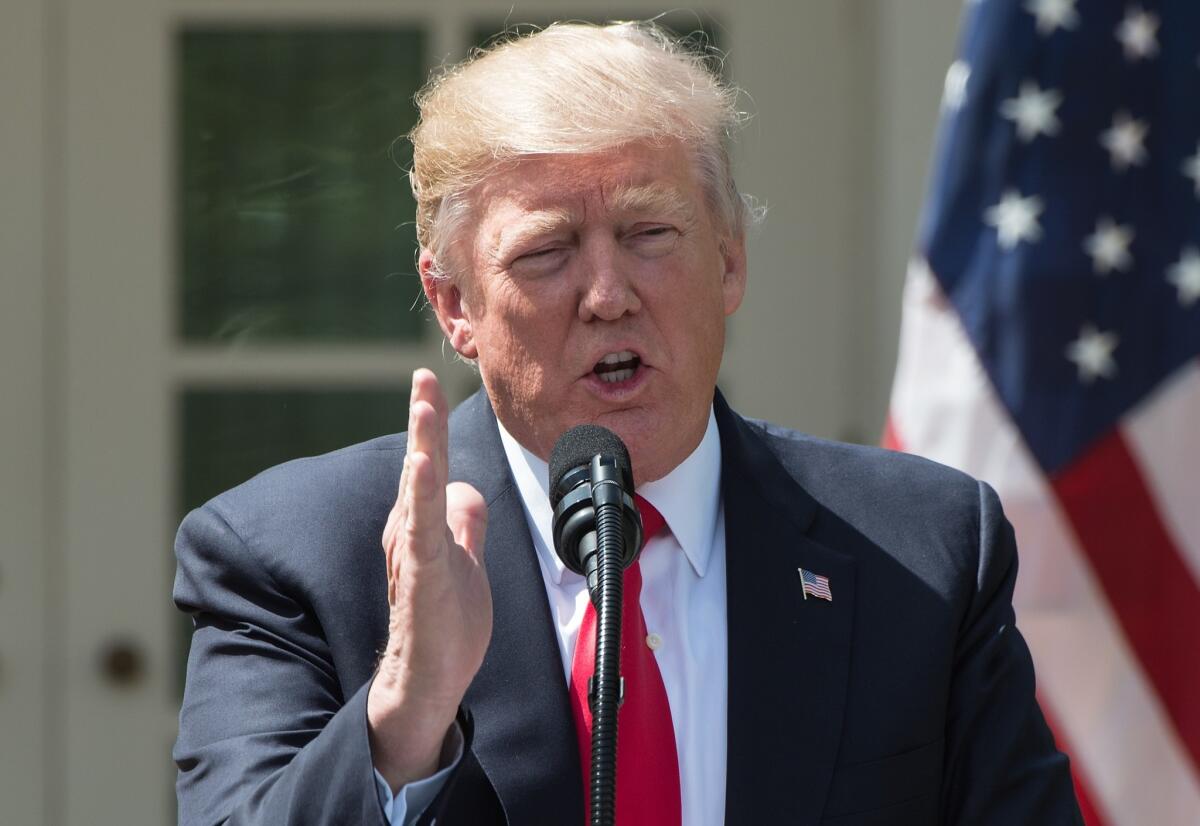
President Trump on Wednesday said his predecessor’s national security advisor might have committed a crime when she asked government analysts to disclose the names of Trump associates documented in intelligence reports.
Trump made the accusation in an interview with the New York Times and would not say if he reviewed new intelligence to support his claim. He told the Times he would say more “at the right time.”
“I think it’s going to be the biggest story,” Trump said. “It’s such an important story for our country and the world. It is one of the big stories of our time.”
Susan Rice, President Obama’s national security adviser, is the latest target for Trump and his embattled defenders. Rice has firmly denied that she or other Obama officials used secret intelligence reports to spy on Trump associates for political purposes.
“Absolutely false,” Rice declared Tuesday.
Trump on Wednesday disagreed. When the Times asked him if Rice broke the law, he said, “Do I think? Yes, I think.”
Trump says chemical weapons attack in Syria crossed ‘many lines,’ but won’t detail U.S. response
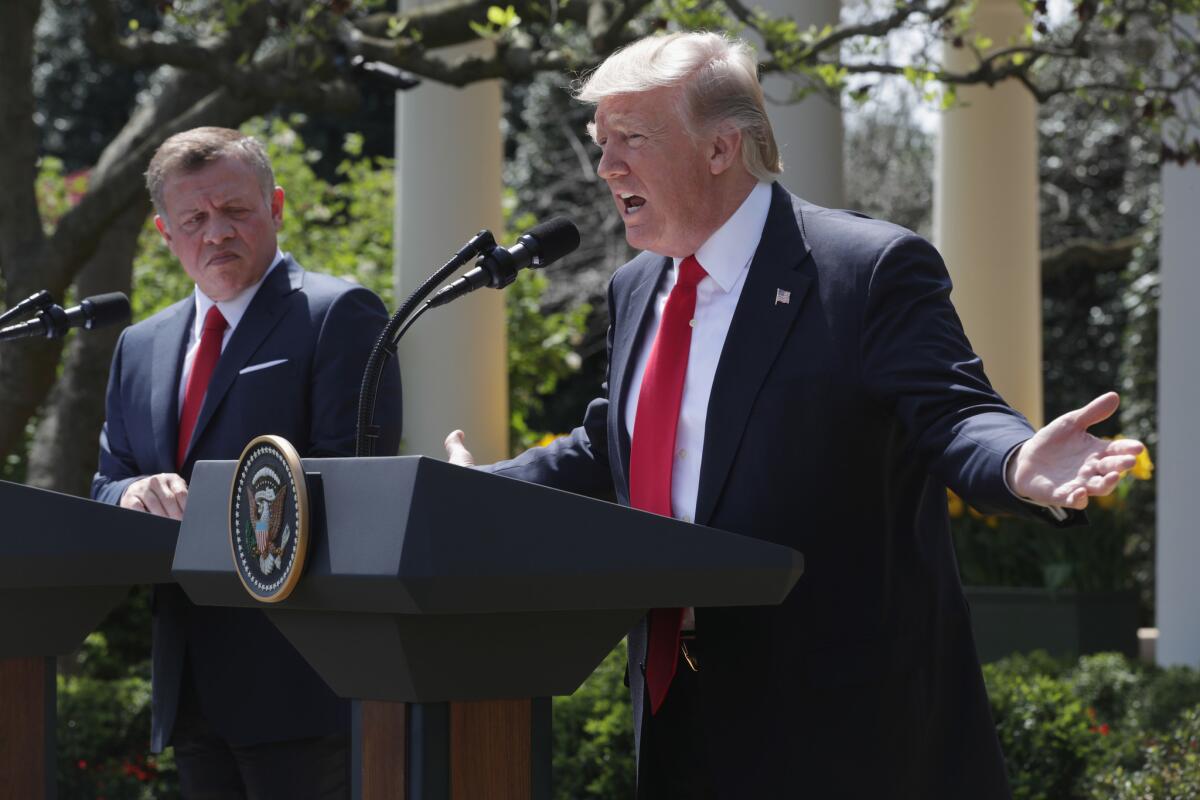
President Trump said the Syrian regime’s apparent use of chemical weapons against its own citizens “crossed a lot of lines” for him, but offered no indication of any plans by his administration to respond to the attack.
At a White House Rose Garden news conference Wednesday alongside King Abdullah of Jordan, Trump condemned what he said was a “horrific” attack targeting innocent women and “even beautiful little babies.” He called it an “affront to humanity.”
“These heinous actions by the Assad regime cannot be tolerated,” he said.
Trump told reporters that his attitude toward Syrian President Bashar Assad “already changed very much” as a result of the attack in northern Syria, without specifying what the consequences of that new assessment would be. He only said he was “flexible.”
The president also repeated criticism of the Obama administration’s approach to the Syrian civil war, and derided former President Obama specifically for his “blank threat” -- a reference to Obama’s saying the use of chemical weapons would cross a red line for him. His predecessor’s inability to resolve the Syrian crisis “set us back a long ways,” Trump said.
“I now have responsibility, and I will have that responsibility, and carry it very proudly,” he said.
Speaking earlier Wednesday at an emergency meeting of the United Nations Security Council, U.S. Ambassador Nikki Haley hinted that if the body did not take action in response to the deadly attack in Idlib province, the U.S. might. Defense Secretary James Mattis said the “heinous act” would be “treated as such.”
Trump also repeated his often-articulated view that he should not and would not telegraph potential military action, preferring to retain the element of surprise.
“I’m not saying I’m doing anything one way or the other. But I’m certainly not going to be telling you” about any potential action, he told a reporter.
Filibuster or not, Sen. Jeff Merkley’s all-night talk-a-thon against Gorsuch nomination joins the record books
It wasn’t exactly a filibuster as Sen. Jeff Merkley spoke for more than 15 hours overnight to protest President Trump’s nominee for the Supreme Court, but that hardly mattered.
The Oregon Democrat launched what is likely to be a day -- and night -- of resistance speeches against Judge Neil M. Gorsuch before Thursday’s pivotal vote.
Democrats plan to filibuster the nominee, arguing the affable Colorado judge is too conservative, and not a mainstream pick to replace Antonin Scalia, who died last year.
But Republicans plan to end the blockade with a procedural vote to shut down debate. Senate Majority Leader Mitch McConnell is also expected to begin the process of changing the Senate’s rules to allow confirmation of Gorusch by a simple majority vote -- the so-called nuclear option.
The Senate is in knots over what is about to happen, and some senators are quietly trying to find an alternative outcome.
Meanwhile, Democrats plan to fight all day, and possibly night, to hold the floor against Gorsuch, especially after Republicans refused last year to even consider President Obama’s nominee for the seat, Merrick Garland.
Even when it’s not technically a filibuster, senators from both parties have done this before. Sen. Ted Cruz (R-Texas) famously read “Green Eggs and Ham” as he tried to defund the Affordable Care Act in 2013; Sen. Bernie Sanders (I-Vt.) turned his multi-hour session against President George W. Bush’s tax breaks into a book, “The Speech.”
Merkley, who began his speech at 6:46 p.m. EDT Tuesday, finished at 10:13 a.m. Wednesday, putting his effort among the top 10 longest speeches in Senate history, his office said.
Haley hints at U.S. action on Syria if United Nations fails
U.S. Ambassador to the United Nations Nikki Haley stood dramatically before the Security Council Wednesday and held aloft gruesome photographs of victims from the deadly gas attack in Syria.
She was presiding over an emergency council session called to debate the attack, which many blame on Syrian President Bashar Assad, who the U.N. has said has used chemical weapons previously.
“We cannot close our eyes to those pictures,” Haley said. “We cannot close our minds” to actions that must be taken.
Haley hinted that if the U.N. Security Council again failed to act, the United States might do so.
Defense Secretary James Mattis, meanwhile, was asked about possible U.S. response.
“It was a heinous act and will be treated as such,” Mattis said at the Pentagon.
Just last week, the Trump administration had begun to suggest that removing Assad was no longer a priority-goal of U.S. policy in Syria.
Haley was especially critical of Russia, which backs Assad’s regime and has threatened to veto any resolution that punishes Syria. Russian officials have sought to blame the deaths on anti-government rebels.
“Time and time again,” Haley said, Russia “uses the same false narrative” and attempts to “place the blame on others.”
Syrian government officials have also denied they used chemical or nerve gas weapons in the attack.
“The truth is Syria, Russia and Iran have no interest in peace,” Haley said. Iran also supports Syria’s Assad.
The session adjourned without resolutions or actions
Bannon removed from National Security Council
President Trump has removed chief strategist Stephen Bannon from the National Security Council in a shakeup that consolidated the power of White House national security advisor H.R. McMaster.
The change was disclosed in a notice published in the Federal Register.
During the first weeks of Trump’s presidency, Trump was criticized for taking the unusual step of allowing his political advisor to attend all National Security Council meetings, giving Bannon unusual influence over key military and intelligence decisions.
The revamp reduced the role of Trump’s homeland security advisor, Tom Bossert, lowering his authority to run high-level national security meetings without McMaster’s approval.
The filing also adds Director of National Intelligence Dan Coats and the chairman of the Joint Chiefs of Staff, Marine Corps Gen. Joseph Dunford, as regular attendees of the council meetings.
Bannon, the former head of Breitbart News, is widely seen as a disruptive force in the White House, but has been close to Trump since the campaign.
The changes largely bring back a traditional structure to the White House national security system.
Q&A: Filibuster, cloture and what the ‘nuclear option’ means for Gorsuch nomination and future of the Senate
As the Senate heads toward a showdown this week over President Trump’s nominee of Neil M. Gorsuch to the Supreme Court, the stalemate threatens a history-making upheaval in the way the upper chamber operates. Here’s a brief history of the filibuster, cloture and the “nuclear option” — and what this week’s potential rule change could mean for the future of the Senate.
What’s a filibuster?
The Senate has from its start operated on the principle of limitless debate — the idea that any one senator could stand and talk endlessly about an issue. It’s a way to woo lawmakers to your side or, more pointedly, to block bills or other measures from advancing. Think of Jimmy Stewart holding forth in “Mr. Smith Goes to Washington.”
U.N. Security Council opens emergency session on Syria
U.S. Ambassador to the United Nations Nikki Haley opened an emergency Security Council session Wednesday to discuss what some members called the “monstrous, heinous” attack in Syria that killed scores of civilians, including numerous children.
But there were early indications that the same hurdle the council has always faced on Syria — vetoes by China and Russia — would stymie immediate action regarding the suspected chemical gas attack.
“This body has always been eloquent” in its condemnations, Ukraine’s ambassador, Volodymyr Yelchenko, said. “But that’s about it. There is an outstanding gap between talk and action.”
British Ambassador Matthew Rycroft also scolded the council’s inability to stop the slaughter of Syrians or the apparent use of illegal chemical weapons.
He noted the Security Council’s failure in February to condemn an earlier attack by forces loyal to President Bashar Assad. The censure was vetoed by China and Russia.
“Yesterday we saw the consequences of those vetoes,” he said.
But Russian officials were eager to cast doubt on the attack, suggesting it was the work of “terrorists” fighting Assad and asserting that witness accounts were unreliable claims from “discredited” organizations.
One Russian diplomat blasted the Security Council discussion as a “clearly ideological” discussion “closely interwoven with the anti-Damascus movement.”
Sen. Jeff Merkley ends marathon speech against Neil Gorsuch
Democratic Sen. Jeff Merkley has ended his marathon speech on the Senate floor against President Trump’s Supreme Court nominee, Neil Gorsuch.
The Oregon lawmaker yielded the floor at 10:15 a.m. Wednesday — 15 hours after he began highlighting his party’s opposition to Gorsuch.
During his attention-grabbing talk-a-thon, Merkley stood next to a blown-up, poster-style portion of the Constitution with the words “We the People” prominently displayed.
Gorsuch is a 10-year veteran of a federal appeals court in Denver, where he has compiled a highly conservative record that has led Democrats to conclude that he too often sides with corporations without regard to the humanity of the plaintiffs before him.
Merkley said Gorsuch’s disdain for class-action lawsuits, often brought by consumers, is an example of the judge’s business-friendly worldview.
Watch live: U.N. Security Council holds emergency talks over Syria attack
Note: A toggle to hear the comments in English and other languages is available on the U.N’s live stream.
Trump’s charm offensive: Can his force of personality break through to China?
President Trump’s advisor and son-in-law, Jared Kushner, has helped choreograph Chinese President Xi Jinping’s upcoming summit at Trump’s Florida resort, pressing the idea that the mercurial U.S. president can make a diplomatic breakthrough with the straitlaced Chinese leader based on personal rapport.
Most evidence and experience point to the contrary.
North Korea fires another ballistic missile, South Korea says
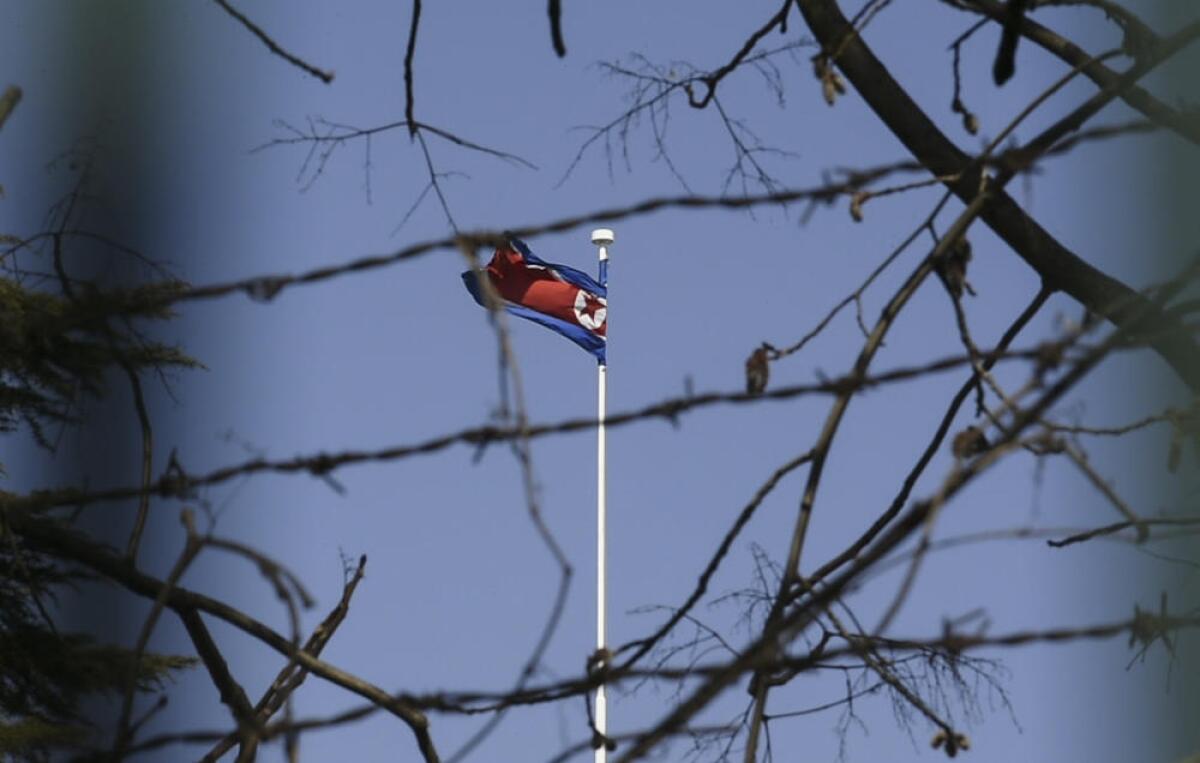
North Korea fired a ballistic missile into the waters off its east coast on Wednesday, South Korean officials said.
The missile -- fired from the North’s eastern coastal town of Sinpo on Wednesday morning -- flew about 37 miles, Seoul’s Joint Chiefs of Staff said in a statement. It gave no further details.
U.S. Pacific Command said in a statement that the missile was initially assessed as a KN-15 medium-range ballistic missile.
The launch was made as South Korean and U.S. troops are conducting their springtime drills that the government in Pyongyang views as a rehearsal for invasion. The allies say the drills set to run until the end of this month are defensive.
North Korea often responds to the drills with its own military training and harsh rhetoric.
Pyongyang is pushing hard to upgrade its weapons systems. Many weapons experts say the North could have a functioning nuclear-tipped missile capable of reaching the continental U.S. within a few years. It carried out two nuclear tests last year.
Senators work quietly on long-shot bid for compromise as Democrats secure votes to filibuster Gorsuch
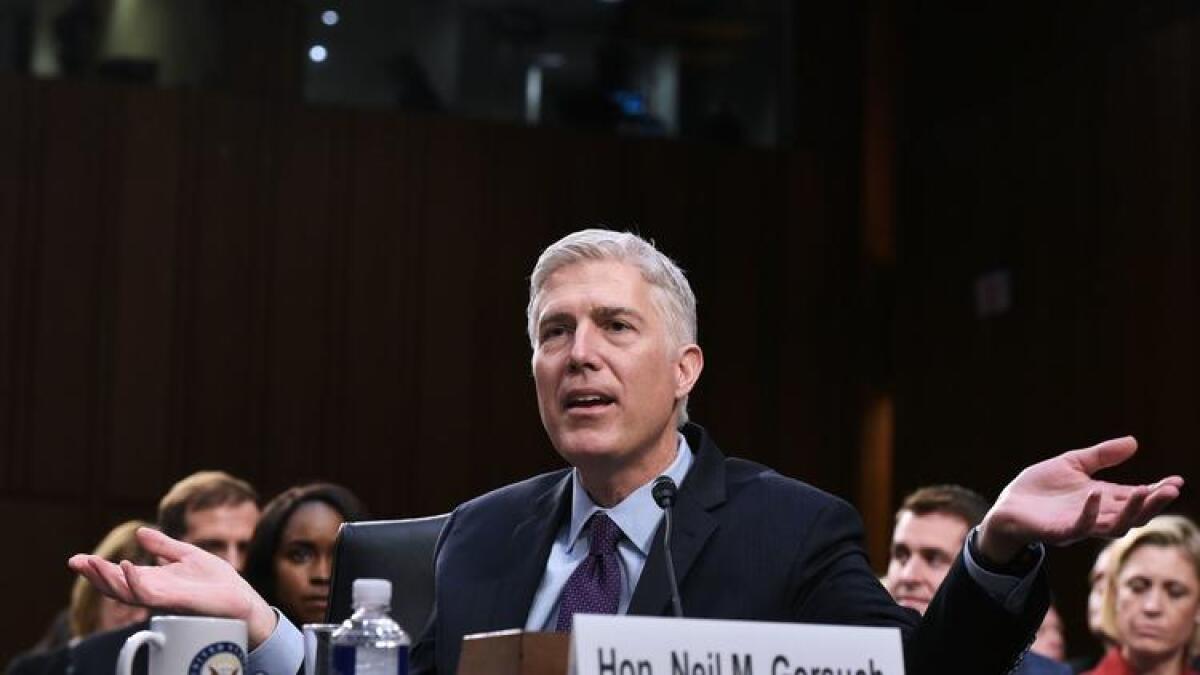
Democrats now officially have enough votes to filibuster President Trump’s nominee for the Supreme Court, Neil M. Gorsuch, setting up the possibility of a history-making showdown that several senators Monday were urgently trying to prevent.
Even as both sides appear headed for a confrontation that would end with a change in the Senate’s rules to eliminate filibusters against Supreme Court nominees, conversations have been quietly underway behind the scenes among a handful of lawmakers from both parties who are trying to find a way to deescalate. Their ability to strike a compromise remains doubtful, however.
Whatever happens, Gorsuch is all but certain to be confirmed. The issue now is what the rules will be when the next vacancy occurs on the high court. Gorsuch would fill the seat of late Justice Antonin Scalia — one conservative replacing another. But the next vacancy could change the balance on the court.
As the maneuvering continued, the Senate Judiciary Committee advanced Gorsuch’s nomination Monday on a party-line vote. As the panel did so, several senators announced their positions, bringing the number of Democrats who have publicly said they would support a filibuster against Gorsuch to 42 by day’s end, one more than needed to sustain a filibuster and block a vote on the nomination under current rules.
At least one senator, however, indicated that his decision to filibuster came with an asterisk — Sen. Chris Coons (D-Del.), who is among those trying to persuade colleagues to step back from the brink of the so-called nuclear option that would upend Senate rules.
As Coons became the pivotal 41st Democrat to say he would back the filibuster, he said he would vote against ending debate on the nomination “unless we are able, as a body, to finally sit down and find a way to avoid the nuclear option.”
9th Circuit Court sets a date for travel ban hearing

A federal appeals court will hold a hearing on May 15 in Seattle on whether to uphold a nationwide injunction against President Trump’s revised ban on travel from six predominantly Muslim nations.
A three-judge panel of the U.S. 9th Circuit Court of Appeals has scheduled a 40-minute hearing on the case.
The Trump administration wants the 9th Circuit to block the injunction, which a federal judge in Hawaii issued after determining the executive order discriminated against Muslims.
The names of the judges hearing the case will be made public on the Monday prior to the hearing.
Trump’s order — which would stop all refugee resettlement for 120 days and block citizens of Iran, Libya, Somalia, Sudan, Syria and Yemen from entering the U.S. for 90 days — is a revised version of an earlier, more sweeping travel ban.
At Trump’s EPA, going to work can be an act of defiance
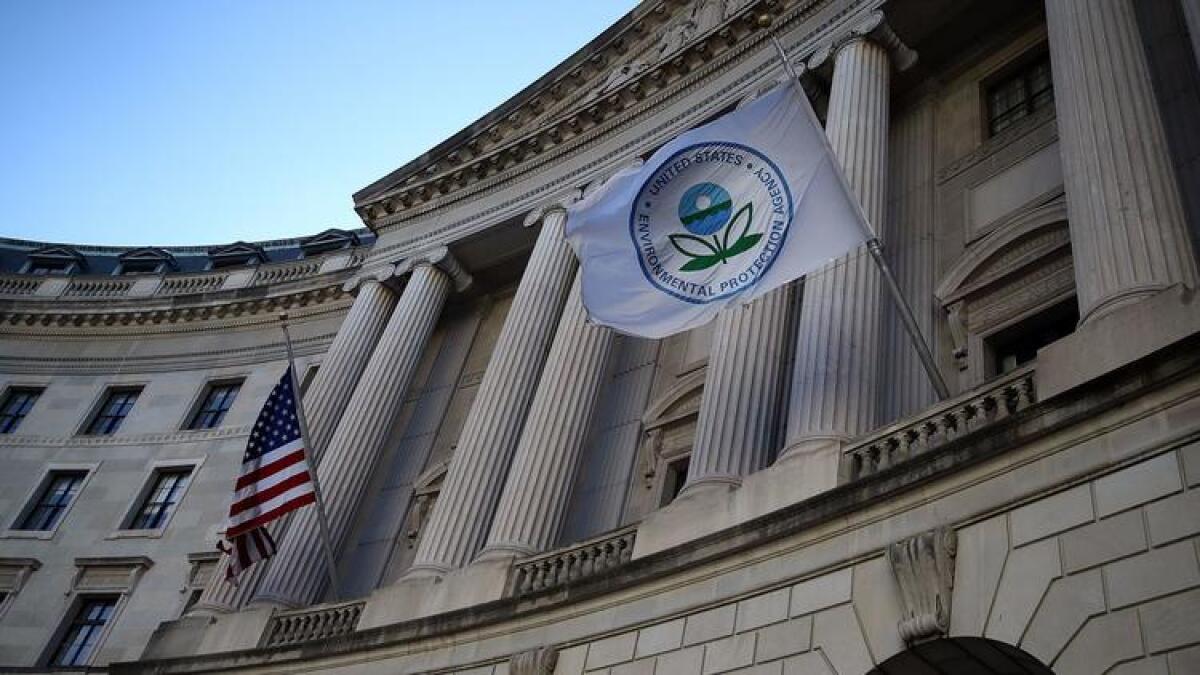
As California’s top energy regulator, Michael Picker has an absurdly busy job. So it was a little surprising to find him recently near a Washington, D.C., Metro stop, randomly handing out help-wanted fliers in the middle of a workday.
But with morale plummeting at the Environmental Protection Agency since President Trump took office, Picker saw in that patch of sidewalk near its headquarters an opportunity — and perhaps a publicity stunt — to lure top-shelf talent that never before would have considered bolting from the agency.
The dim outlook at the EPA is weighing heavily on its 15,000 scientists, engineers, investigators and other employees, many of whom perceive their life’s work to be under assault from within. The Trump administration is moving as quickly as it can to diminish the place, with plans to cripple the EPA science office, stop the agency’s climate change work, cut its Superfund program in half and outright eliminate 50 programs, down to the voluntary Energy Star stickers that help consumers choose efficient appliances.
It all has Jared Blumenfeld’s phone ringing off the hook. “The No. 1 call I get every day is, ‘Jared, can you help us find work somewhere else?’” said Blumenfeld, who ran the regional office of the EPA encompassing California, Nevada and Arizona until last May.
White House says ‘reprehensible’ gas attack in Syria resulted from President Obama’s ‘red line’

White House Press Secretary Sean Spicer faulted the Obama administration in a “reprehensible” gas attack in Syria that killed dozens, but did not say how or whether the United States would respond beyond condemnation.
“Today’s chemical attack in Syria against innocent people, including women and children, is reprehensible and cannot be ignored by the civilized world,” Spicer said at the beginning of his daily press briefing with reporters. “These heinous acts are a consequence of the past administration’s weakness and irresolution.”
Spicer said Obama had more options when he declared a red line against chemical weapons in 2012.
“What’s the point of red lines?” Spicer said. “America’s credibility was at stake.”
But Spicer, who blamed the attacks on forces loyal to Syrian President Bashar Assad, would not say whether President Trump would establish his own red line against Syria.
“The president has made it clear in the past and [I] will reiterate today, that he is not here to telegraph what we will do,” Spicer said, adding that Trump was meeting with his national security team Wednesday morning.
Spicer said “there is not a fundamental option of regime change,” but he said Assad’s ouster would be “in the best interests of the Syrian people,” adding that “any leader who treats their people to this kind of activity” presents a menace.
Spicer made his comments during a rare off-camera press briefing. Trump, at least early in the day, did not make comments. Presidents often make on-camera statements following grave attacks.
They give the the U.S. position more weight and attention, but also put more pressure on the administration’s response.
Should Republicans use the ‘nuclear option’ in Gorsuch vote? Yes, say those on the right
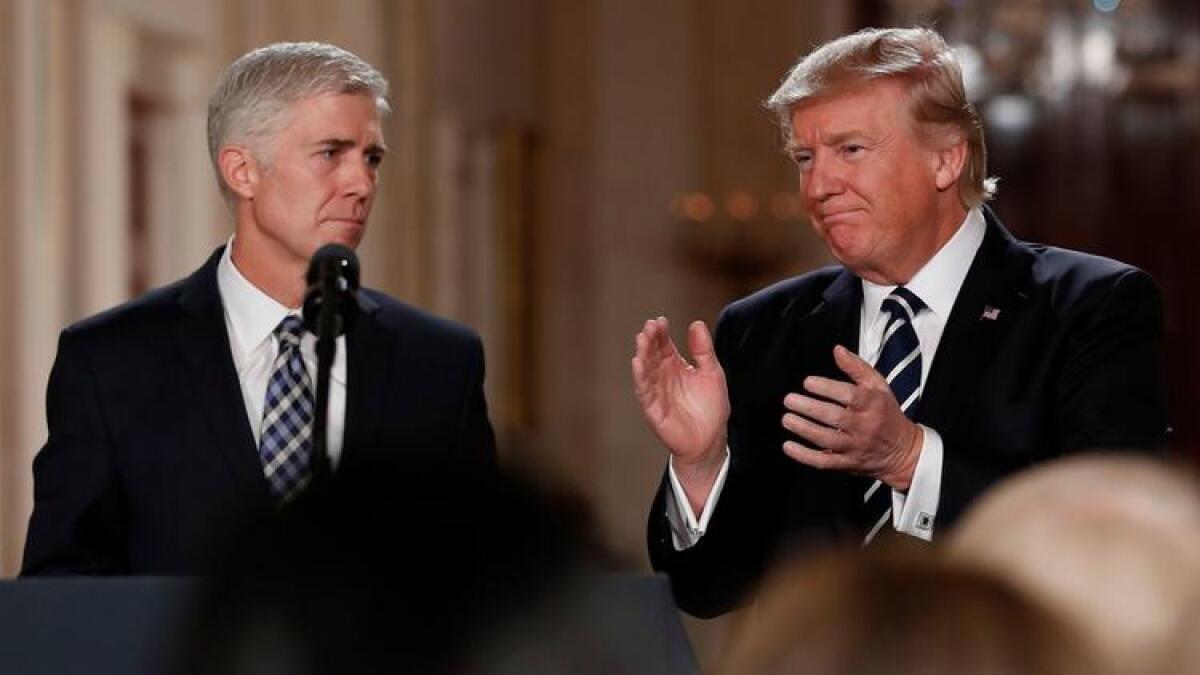
Neil Gorsuch is on the cusp of becoming the ninth U.S. Supreme Court justice.
Still, Gorsuch, who was tapped by President Trump in January to join the high court, could face a partisan tug-of-war this week in the Senate.
A day after the Senate Judiciary Committee, in a party-line vote, sent his nomination to the full Senate for a vote, Democrats were still considering a filibuster of the nominee.
What, perhaps, could that ignite? Well, it’s called the “nuclear option” – a move in which Republicans, who have control of the Senate, change voting rules and confirm Gorsuch by a simple majority.
Conservative media and Trump have endorsed such an option.
Here are some headlines:
Defend the Constitution, Confirm Gorsuch (Weekly Standard)
Senate Minority Leader Charles E. Schumer (D-N.Y.) has a decision: To filibuster or not to filibuster? It appears he is leaning toward the former -- a move that would infuriate Republicans, who view Gorsuch, a 10th Circuit Court of Appeals judge, as a worthy successor to the late Antonin Scalia
This piece calls on Senate Majority Leader Mitch McConnell (R-Ky.) to go nuclear.
“We trust that if Democrats choose to filibuster, Republicans will be smart enough and tough enough to confirm Gorsuch with a simple majority vote,” writes the Weekly Standard. “This is nonsense: Any Republican who would let 41 Democrats keep the Scalia seat empty would not be protecting the institution of the Senate.”
Democrats think they can force Trump from office (Rush Limbaugh)
Is Trump the focus of a witch hunt?
Well, the president says yes -- regularly castigating inquiries into, among other things, his ties to Russia as a tactical assault led by Democrats upset about the results of last year’s election.
Rush Limbaugh seems to agree.
“They are losing elections. They know it. Look, this is all leading somewhere. I think a lot of the energy that the media and the Democrats are bringing to this is rooted in a belief that they can get rid of him,” Limbaugh said on his radio show. “I really think that that’s something they think they can do. Because in their minds they’ve done it before. They got rid of Nixon and they rendered Bush irrelevant.”
I worked for Mike Pence. Being a woman never held me back (Washington Post)
So, apparently, Vice President Mike Pence does not dine alone with women who are not his wife. That was according to a profile of Pence’s wife, Karen, the Washington Post did last week.
Those on the left assailed the vice president for leaving his female employees at a disadvantage.
Not true, says Mary Vought, a Republican, who at one time served as Pence’s press secretary when he was in Congress.
“My work product determined my success — not private dinners with the congressman. When looking back on my time in the office of the man who is now vice president, I don’t consider it to be a period of missed opportunities,” she writes in this op-ed piece. “The fact of the matter is, it’s not as though then-Congressman Pence was out having private dinners with male staffers and I was excluded. He wasn’t having private dinners much at all.”
Nominee for SEC chief gets Senate panel’s approval
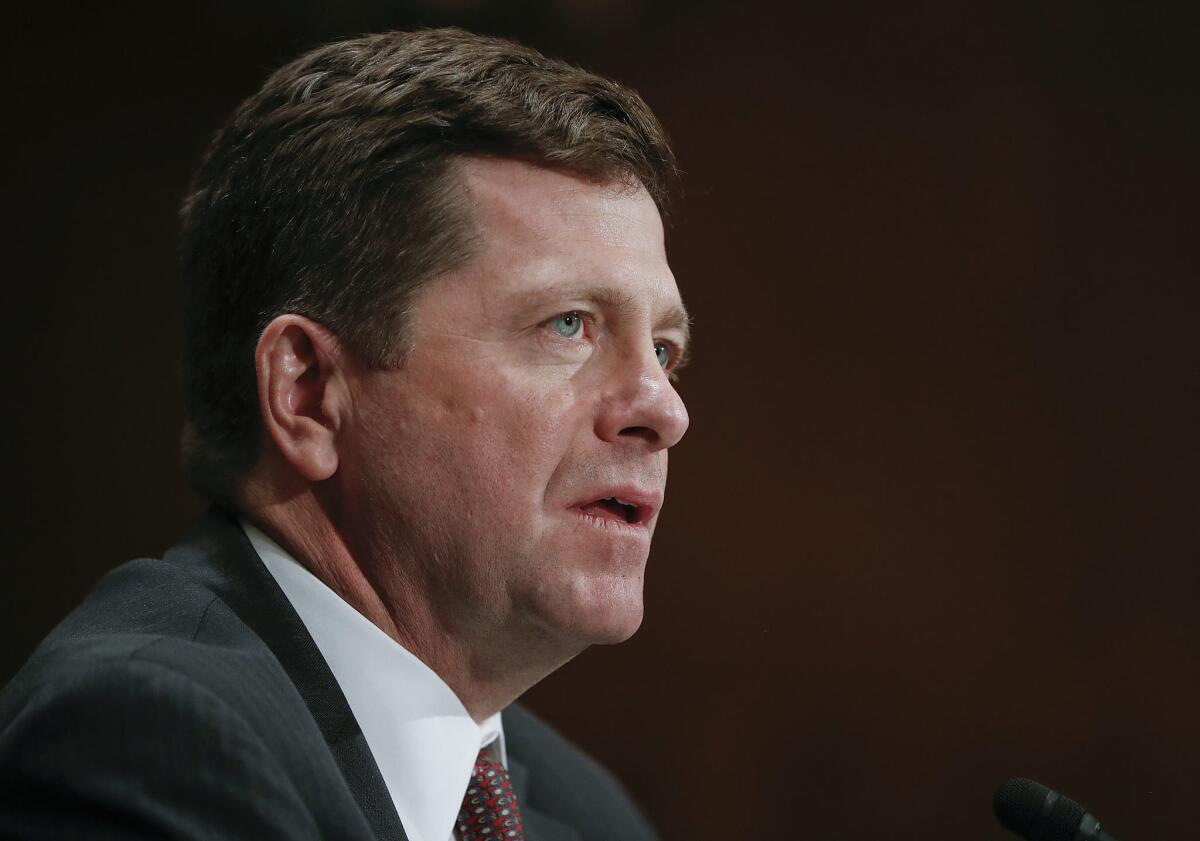
A Senate panel has cleared the nomination of Jay Clayton, the Wall Street attorney chosen by President Trump to lead the Securities and Exchange Commission.
The Senate Banking Committee’s vote Tuesday was 15-8, as three Democrats joined the panel’s Republicans in approving Clayton. The confirmation of Clayton to head the independent agency that oversees Wall Street and the financial markets now goes to the full Senate, where approval is expected.
Sen. Mike Crapo (R-Idaho), the committee’s chairman, said Clayton’s “extensive expertise and experience in our financial markets will be a benefit to the [SEC] and the American people.”
At his hearing before the panel last month, Clayton pressed to assure the lawmakers that he’ll show no favoritism, as his Wall Street connections came under scrutiny.
President Trump and the media are feuding. The public isn’t happy
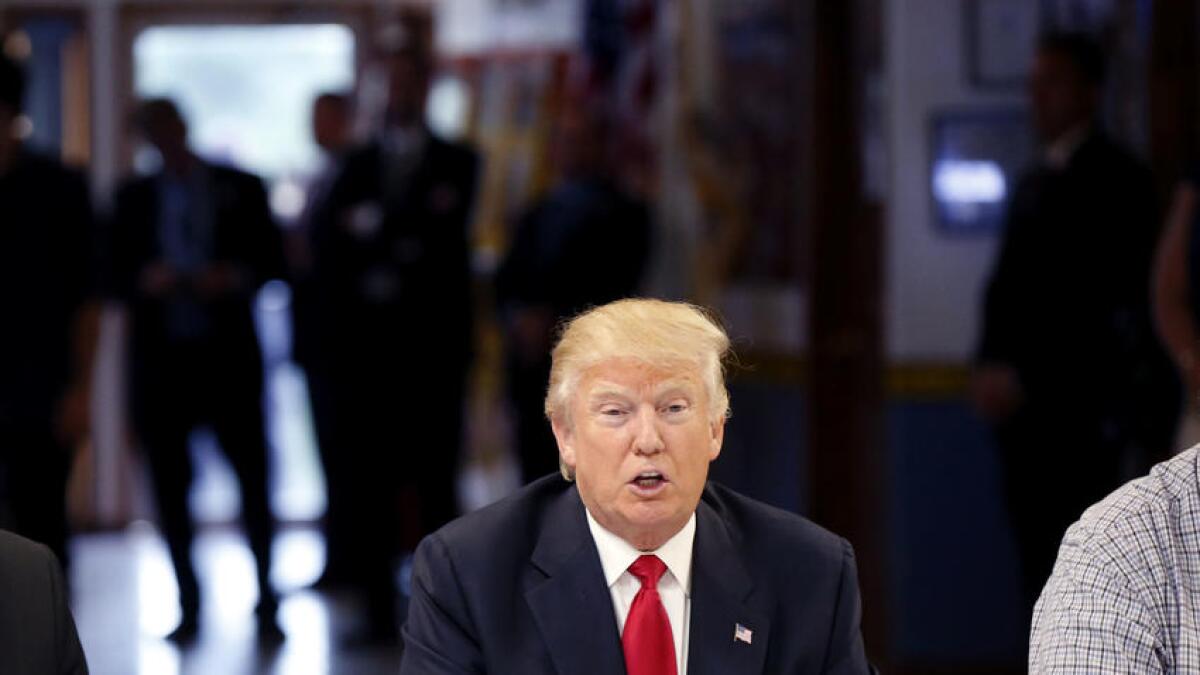
Americans who watch cable news, read their Facebook pages or engage in just about any form of media see the evidence almost daily: The Trump administration and the mainstream news media have a fraught relationship.
President Trump complains frequently about “fake news”; mainstream news organizations accuse the president of skirting the truth, and more.
New polling by the Pew Research Center suggests that Americans don’t like what they’re seeing, regardless of party affiliation, age, income or almost any other demographic marker.
A full 83% of American adults agreed that “the relationship between Trump and the news media is generally unhealthy.” Another large majority, 73%, said that tension is “getting in the way of Americans’ access to important news.”
The poll does not offer solutions. And it’s unclear that there are any easy ones. Reporters are driven by the mission of holding politicians accountable and are unlikely to soften up to please those in power.
Other surveys have shown an increasing ideological gap in perceptions of the media’s credibility. Conservatives and other Trump supporters distrust the mainstream media far more than liberals and Democrats.
Trump has exploited that tension better than almost any other politician, using the trust gap to build loyalty among supporters and discredit unflattering reports.
A characteristic example came hours before the Pew survey was released Tuesday as Donald Trump Jr. took a shot at the mainstream media on his Twitter feed. The president’s eldest son praised a self-described “alt-right” journalist who has dabbled in conspiracy theories, lauding his coverage of a story that cast an Obama administration official in an unflattering light.
The president, himself, said in a business forum on Tuesday that he was getting “unbelievable credit” for his accomplishments from everyone save “the mainstream media, which just gives us no credit whatsoever.”
Will Congress kill a $101-billion tax break for Californians?
For California, it’s the $101-billion question: Will Congress eliminate a major tax break that benefits residents of the state more than anywhere else in the country?
A plan by House Republicans calls for axing the federal deduction for state and local taxes. The provision allowed Californians to reduce their taxable income by that amount in 2014, according to an analysis by the nonpartisan Tax Foundation.
That figure was one-fifth of the total value of the deduction nationwide.
California’s pain may be Republicans’ gain, though, as lawmakers and the White House turn to tax reform after the failed attempt to repeal and replace President Obama’s healthcare law.
The break, one of the most costly in terms of lost federal revenue each year, largely benefits states with high taxes and high earners — and most of those states are Democratic strongholds.
Trump’s erratic style could undermine China’s agreement to stop hacking U.S. businesses
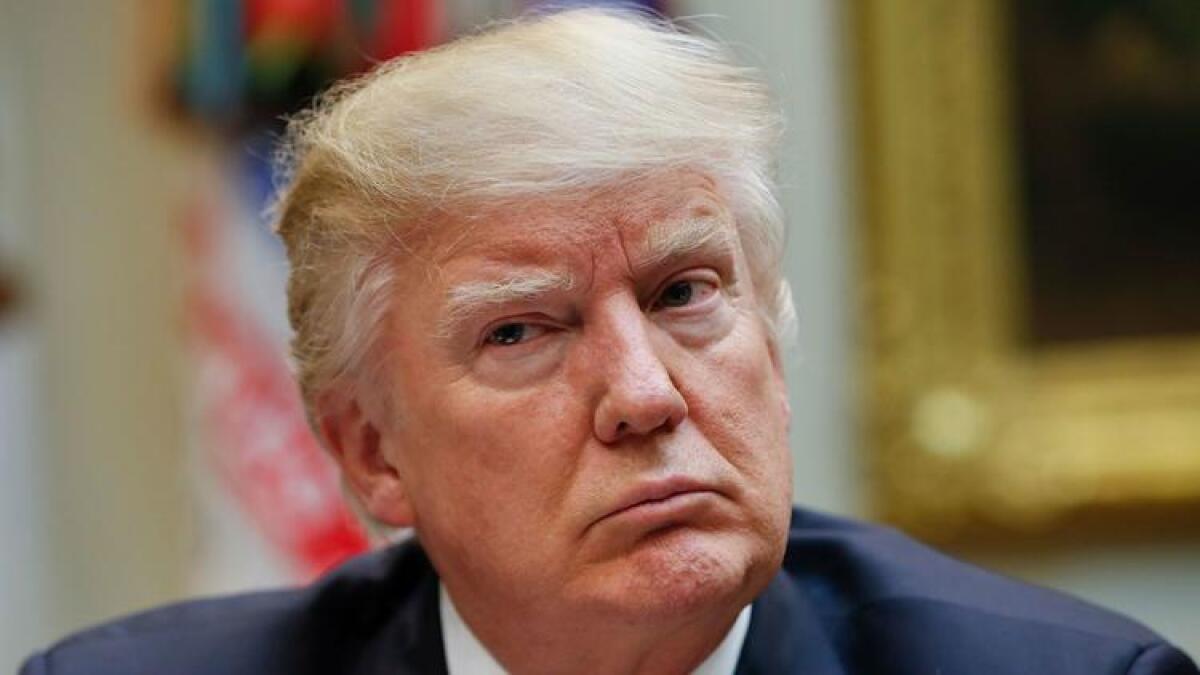
President Trump’s erratic style and free-form diplomacy have U.S. cybersecurity experts concerned that he might undermine an Obama-era deal with Beijing that sharply curbed widespread Chinese cyberthefts for economic gain and unleash a new flood of hacks against U.S. companies.
As Trump prepares to host Chinese President Xi Jinping at his Florida resort Thursday, Trump’s demands that Beijing provide more trade concessions and do more to restrain North Korea could prompt Xi to use other points of leverage, including Beijing’s control of a far-reaching network of sophisticated hackers.
White House officials offer change to failed healthcare bill -- but is it enough?
White House officials made a new offer to conservative House Republicans late Monday on the GOP’s failed healthcare bill, hoping to resuscitate a measure that crashed spectacularly less than two weeks ago.
Vice President Mike Pence and two top White House officials made the offer in a closed-door meeting with members of the House Freedom Caucus, according to a participant. Opposition from the hard-line group, which has around three dozen conservative Republicans, contributed to circumstances that forced House Speaker Paul D. Ryan to withdraw the bill from a March 24 vote that would have produced a certain defeat.
Under the White House offer, states would be allowed to apply for waivers from several coverage requirements that President Obama’s 2010 healthcare law imposed on insurers.
These include an Affordable Care Act provision prohibiting insurance companies from declining to write policies for people with serious diseases. Conservatives have argued that such requirements have the effect of inflating insurance costs.
Freedom Caucus members said they wanted to see the White House offer in writing — which is expected Tuesday — before deciding whether to accept it.
Also at Monday’s meeting were White House Chief of Staff Reince Priebus and budget director Mick Mulvaney. The participant spoke on condition of anonymity to describe the private strategy session.
Another participant — Freedom Caucus chairman Rep. Mark Meadows (R-N.C.) — said the group would make no decisions until it reviews the language but called the session a “good meeting” in a text message.
But Meadows also said, “There is no deal in principle” at this time.
It was unclear whether GOP moderates would accept the proposed changes. When Ryan (R-Wis.) pulled the legislation from the House last month, he also faced opposition from moderate GOP lawmakers upset that it went too far with cuts in Medicaid coverage for the poor and higher premiums for many low earners and people in their 50s and 60s.
Rep. Tom MacArthur (R-N.J.), a leader of the moderate House Tuesday Group, was among moderate lawmakers who met with officials at the White House on Monday, a GOP aide said.
The Freedom Caucus has drawn the most wrath from the White House for its opposition to the bill. Some fellow House Republicans have also criticized members of the conservative group, accusing them of inflexibility that led to the downfall of the bill to replace Obamacare, a top GOP legislative priority.
Six days after the House bill crashed, Trump tweeted that the Freedom Caucus “will hurt the entire Republican agenda” if they don’t start cooperating. He added, “We must fight them” in 2018, a reference to their reelection campaigns.
Several caucus members, who tend to represent safely Republican districts, tweeted back defiantly. But some have stressed a desire to move the legislation along if provisions are added that they believe would contain insurance costs.
Amid the storm, Devin Nunes’ two worlds render vastly different judgments of him
At home, Devin Nunes remains what he has always been, an auspiciously successful man who rose swiftly to unexpected heights, a man high school teachers point to when they tell kids in this often-overlooked place what is possible in this world.
Outside the farming community southeast of Fresno that has sustained him and his family for generations, though, many see the 14-year Republican congressman very differently — as a national symbol of political bungling or worse.
The House investigation of Russian interference in the 2016 election, which he heads, has stalemated. A senator from his party has acidly compared him to Inspector Clouseau, the bumbling French detective from the “Pink Panther” movies. Democratic leaders have accused him of working with the White House to divert attention from the investigation into whether the Trump campaign colluded with Russia to derail Hillary Clinton’s candidacy. In much of official Washington, the mention of Nunes’ name prompts dismissive shakes of the head.
The two views of Nunes are impossible to reconcile, not that many in his district are trying to. In a region where troubles often take the form of drought or pestilence, his longtime constituents greet Nunes’ difficulties with a shrug, their faith in him undiminished.
For many here, the 43-year-old congressman represents something bigger than himself: the ambitions of a band of immigrants who worked their way to success and the respect yearned for in a place long in the shadows of glitzy metropolises to the north and south.
White House spokesman says President Trump’s son-in-law not too busy: ‘He has a team that he oversees’

The Trump administration tried Monday to downplay the degree of direct responsibility for administration policy possessed by Jared Kushner, President Trump’s son-in-law, as he made an official visit to Iraq.
“He has a team that he oversees,” White House Press Secretary Sean Spicer said during his daily press briefing, later clarifying that Kushner leads several teams focusing on different issues.
Spicer said Kushner’s presence in Iraq does not signal less influence for Secretary of State Rex Tillerson.
“It’s not a binary choice,” Spicer said.
Spicer said Kushner, 36, took on many of his responsibilities during the presidential transition, when Trump had fewer staff experts to advise him.
Now that more of Trump’s appointees have taken posts at the State Department, Kushner has deferred more to them, he said, adding that he still “brings a key perspective to this.”
Kushner flew Monday morning to Iraq at the invitation of Gen. Joseph Dunford, chairman of the Joint Chiefs of Staff.
The Iraqi prime minister’s office released a photograph of him meeting with Prime Minister Haider Abadi, accompanied by Gen. Stephen Townsend, commander of the U.S.-led coalition in Iraq and Syria, and the U.S. ambassador to Iraq, Douglas A. Silliman,
Gorsuch wins approval from Senate panel on party-line vote, setting up historic filibuster
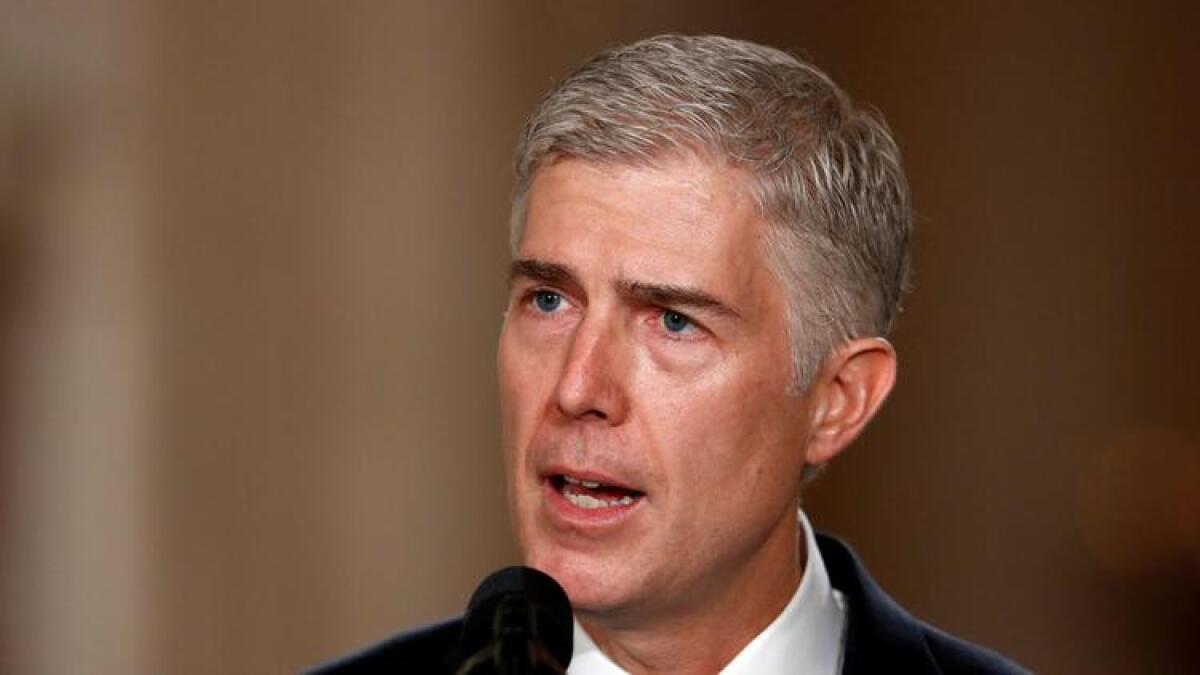
Judge Neil Gorsuch, President Trump’s Supreme Court nominee, won approval Monday on a party-line vote from the Senate Judiciary Committee, setting the stage for a filibuster showdown on the Senate floor later this week.
At the same meeting, Democratic Sen. Chris Coons of Delaware announced he would provide the crucial 41st vote need to support the threatened Democratic-led filibuster of Gorsuch.
The committee’s 11 Republicans all endorsed Gorsuch as a well-qualified conservative judge whose record “falls well within the mainstream,” as committee chairman Charles Grassley (R-Iowa) put it.
All nine Democrats opposed Gorsuch. They faulted the Republican nominee for refusing to answer their questions about his views of the Constitution and about his record as a Justice Department lawyer under President George W. Bush.
Sen. Dianne Feinstein (D-Calif.) said documents showed Gorsuch had defended “enhanced interrogation” techniques, including water boarding, but then said he had no specific recollection of this during his hearings.
The sharp partisan divide was on display during the committee’s markup session. For more than four hours, the senators took turns explaining the basis for their votes.
The Republicans said they are amazed and dismayed that the Democrats would not support such a qualified nominee who pledges to follow the law. “If they oppose Neil Gorsuch, they will oppose any nominee of this president,” said Sen John Cornyn (R-Texas).
The Democrats said they saw signs Gorsuch will be a conservative activist on the bench, not a neutral judge. Sen. Sheldon Whitehouse (D-R.I.) predicted Gorsuch will help form “a new right-wing gang of five” that protects corporations and big-money interests at the expense of ordinary citizens.
The nomination now moves to the Senate floor, where the minority Democrats have pledged to vote against cutting off the debate. Under the current rules, it takes 60 votes to invoke “cloture” and end the filibuster.
But Majority Leader Mitch McConnell (R-Ky.) said he will move to change the rules so as to allow Gorsuch to win confirmation by a majority vote.
“We will not have a successful filibuster of a Supreme Court nominee,” Sen. Lindsey Graham (R-S.C.) said Monday prior to the committee vote. “Because if we have to, we will change the rules.”
Democrats now have enough votes to filibuster Gorsuch
Senate Democrats now have enough votes to try to block Supreme Court nominee Judge Neil M. Gorsuch with a filibuster, setting up a showdown with Republicans who plan to confirm him anyway.
The crucial 41st vote came from Democratic Sen. Chris Coons of Delaware, who announced his decision Monday as the Senate Judiciary Committee met to vote on Gorsuch’s nomination.
Coons said that he had decided to oppose President Trump’s nominee over concerns that include his vague answers in his hearing.
Coons’ opposition will prevent Republicans from reaching the 60 votes they need to move Gorsuch over procedural hurdles to a final Senate vote. Determined to confirm him despite Democratic objections, they will likely change Senate rules later this week to reduce the threshold from 60 to a simple majority.
Trump receives Egypt’s Sisi at White House in week of high-stakes diplomacy
President Trump held private meetings Monday with one of the United States’ most important Arab allies, Egyptian President Abdel Fattah Sisi, kicking off a week of high-stakes international diplomacy.
Sisi arrived at the White House just before noon EDT. Trump emerged from the West Wing to greet the Egyptian leader -- the first Egyptian head of state to make such a visit since 2009 -- amid military guards bearing flags representing the 50 states.
Ahead of Sisi’s arrival at the White House, the Secret Service cleared Lafayette Park, across the street, of protesters pro and con.
“We agree on so many things,” Trump said of Sisi as the two leaders met inside the White House and shook hands. Sisi, Trump said, has “done a fantastic job in a very difficult situation. We are very much behind Egypt and the people of Egypt. …You have a great friend and ally in the United States, and in me.”
Sisi responded: “I’ve had a deep appreciation and admiration of your unique personality” and the fact that Trump has been “standing very strong … to counter this evil ideology,” an allusion to Islamist-inspired terrorism. Sisi spoke in Arabic and his words were translated into English.
In sharp contrast to the Obama administration, Trump was not expected to raise crucial issues such as human rights, the president’s aides said. Instead, the daylong session was aimed at “rebooting” a bilateral relationship at times strained in the past, a senior administration official said.
At $1.3 billion a year, Egypt is the second-largest recipient of U.S. foreign aid, after Israel. In exchange, Egypt is one of the few Arab countries to maintain diplomatic ties with Israel and serves as a backstop control over the Palestinian Gaza Strip.
Planned budget cuts that would gut foreign aid may put some of Egypt’s money in danger, but administration officials said Egypt’s “security” will not be threatened.
“President Trump aims to reaffirm the deep and abiding U.S. commitment to Egypt’s security, stability and prosperity,” the administration official said, briefing reporters ahead of Monday’s meetings on condition he not be named, a common practice in government. “We are going to maintain a strong and sufficient level of support to Egypt and Jordan,” the official added.
Jordan’s King Abdullah goes to the White House on Wednesday, and Chinese President Xi Jinping holds a two-day summit with Trump at his resort in Florida.
The Trump administration has had unusually kind words for Sisi, an often heavy-handed strongman who won election in 2014 with 93% of the vote after leading a bloody crackdown on Islamist and other opponents.
Trump has cited Sisi’s “courage” in fighting Islamic State, the terrorist group that has made inroads in the Sinai peninsula and other parts of Egypt and killed dozens of Egyptians, including Coptic Christians, in attacks.
In 2013, the Obama administration suspended the $1.3-billion aid package after the Egyptian military, led at the time by Sisi, overthrew Egypt’s first democratically elected president. Thousands of Egyptian dissidents have been jailed or killed since.
But the Trump administration has indicated human rights will not be a public priority. The senior official said it was “most effective” to handle such issues “in a private, more discreet way.”
“Inviting [Sisi] for an official visit to Washington as tens of thousands of Egyptians rot in jail and when torture is again the order of the day is a strange way to build a stable strategic relationship,” Sarah Margon, Washington director at Human Rights Watch, said.
Obama restored the military aid package, which included Cairo’s purchase of a dozen F-16 fighter jets, in early 2015 as he sought support from the region’s Sunni leaders for the U.S.-brokered international Iran nuclear deal.
However, the Obama government slated for 2018 an end to the so-called cash-flow financing system, which allows Egypt to place advance orders for expensive U.S. weaponry. Trump administration officials said they were prepared to reexamine ending cash-flow financing in their conversations with Sisi and his delegation.
This story, originally posted at 8:52, was updated with quotes from Trump and Sisi.
Kushner’s Iraq trip underscores Trump son-in-law’s growing role

On the eve of his inauguration, President Trump turned to his daughter Ivanka and joked that he “sort of stole” her husband, Jared Kushner.
With a trip to Iraq, announced on Monday following his arrival in Baghdad, it became clear that Kushner’s role in the Trump administration has only grown bigger since then.
Trump’s 36-year-old son-in-law seems to be everywhere for the president. He is known to advise on domestic policy and help craft foreign policy. Trump has given him special tasks as well, including an initiative to reinvent government, the type of project President Clinton gave to Vice President Al Gore, and broker peace in the Middle East, an issue that has vexed lifelong experts from every administration for decades.
“If you can’t produce peace in the Middle East, nobody can. OK?” Trump said at the inauguration-eve ball. “All my life, I’ve been hearing it’s the toughest deal in the world to make.”
Kushner is also taking a key role in shaping China policy ahead of President Xi Jinping’s visit to Palm Beach with Trump at the end of the week.
With that level of influence in mind, it’s no surprise that Gen. Joseph Dunford, chairman of the Joint Chiefs of Staff, invited him to get an on-the-ground look at the conditions in Iraq.
A statement from Capt. Greg Hicks, Dunford’s spokesman, said Kushner arrived with Dunford and Thomas P. Bossert, Trump’s homeland security advisor.
“Gen. Dunford invited Mr. Kushner and Mr. Bossert to meet with Iraqi leaders, senior U.S. advisors, and visit with U.S. forces in the field to receive an update on the status of the counter-ISIS campaign in Iraq and Syria,” the statement said, using an acronym for Islamic State. The statement noted that it was Kushner’s and Bossert’s first trip to Iraq.
In addition to his briefings, “Mr. Kushner is traveling on behalf of the President to express the President’s support and commitment to the Government of Iraq and U.S. personnel currently engaged in the campaign,” the statement said.
8:50 a.m.: This story was updated with staff reporting.
Watch live: Senate Judiciary Committee votes on Neil Gorsuch’s Supreme Court nomination
The Senate’s Republican and Democratic leaders have set the stage for Judge Neil M. Gorsuch to be confirmed to the Supreme Court this week, but only after a partisan battle that likely will lead to changing the Senate’s rules.
The Senate Judiciary Committee is expected to vote to send the Gorsuch nomination to the full Senate today. Debate in the Senate is expected to start on Tuesday, with a final decision by week’s end.
Trump escalates talk of deal with Democrats on healthcare
President Trump stepped up his threats to cut a deal with Democrats over healthcare if conservatives in the House won’t back his proposals.
In an interview with the Financial Times, Trump said that despite the recent collapse of the Republican healthcare bill, negotiations were still taking place among GOP leaders aimed at coming up with a new plan.
The stumbling block, he suggested, was the House Freedom Caucus, the conservative group that Trump has blamed for the failure of his bill in March.
He said he hoped Republicans would unite behind a new plan.
But “if we don’t get what we want, we will make a deal with the Democrats,” he said. If that happens, “we will have in my opinion not as good a form of healthcare, but we are going to have a very good form of healthcare, and it will be a bipartisan form of healthcare.”
Last week, Trump threatened to back primary challengers to some Freedom Caucus members in 2018 if they don’t support his program.
On Saturday, Dan Scavino, the White House social media director, sent out a tweet calling for the defeat of Rep. Justin Amash, a Freedom Caucus member from Michigan.
Some prominent government ethics experts said Scavino’s tweet may have violated the Hatch Act, the law that prohibits federal employees from engaging in political activity while at work. White House officials said the tweet was proper because it came from Scavino’s personal account.